Queen
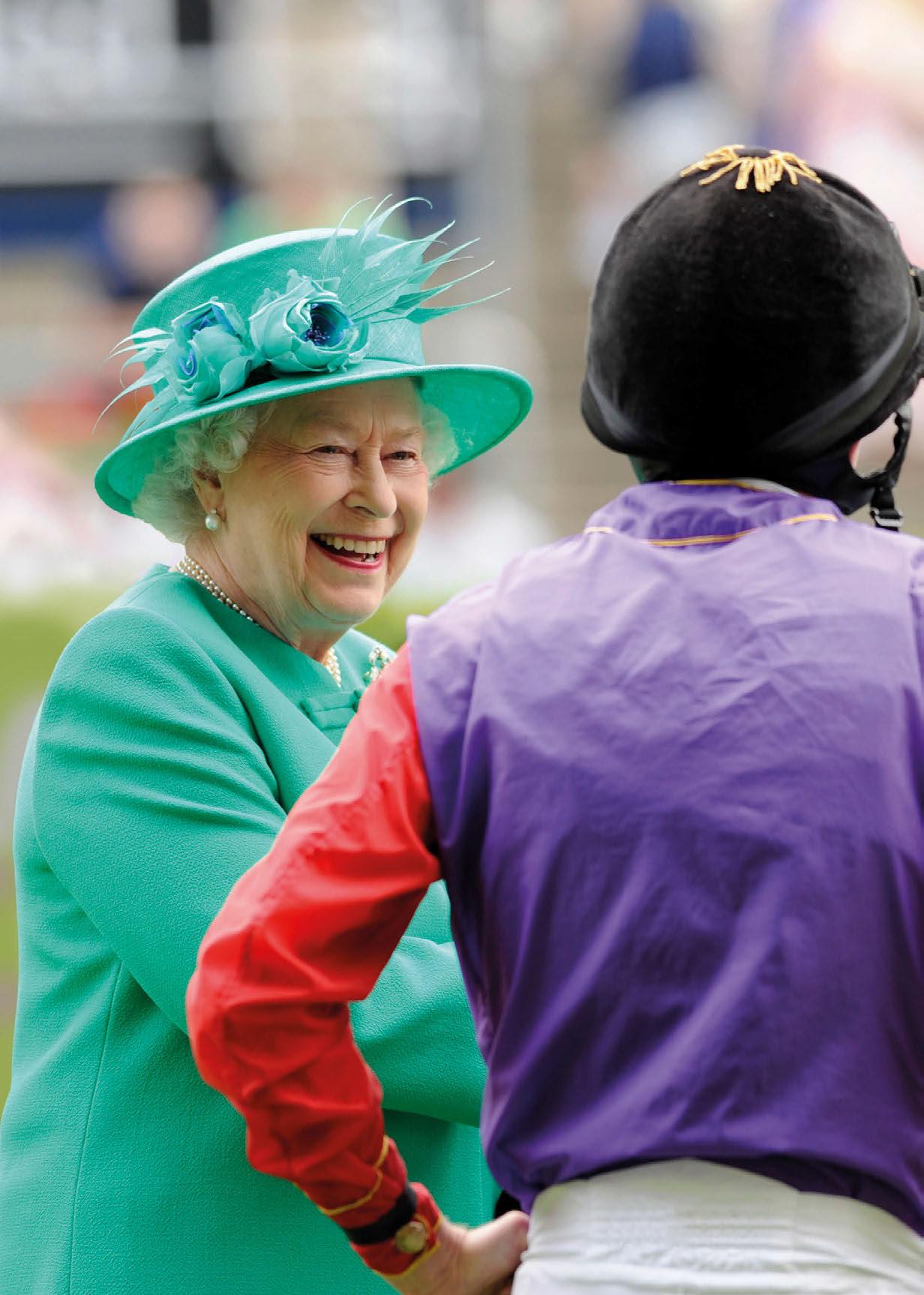


His best-bred crop are yearlings of 2022.
yearlings have already sold for €220,000, €130,000 and £120,000
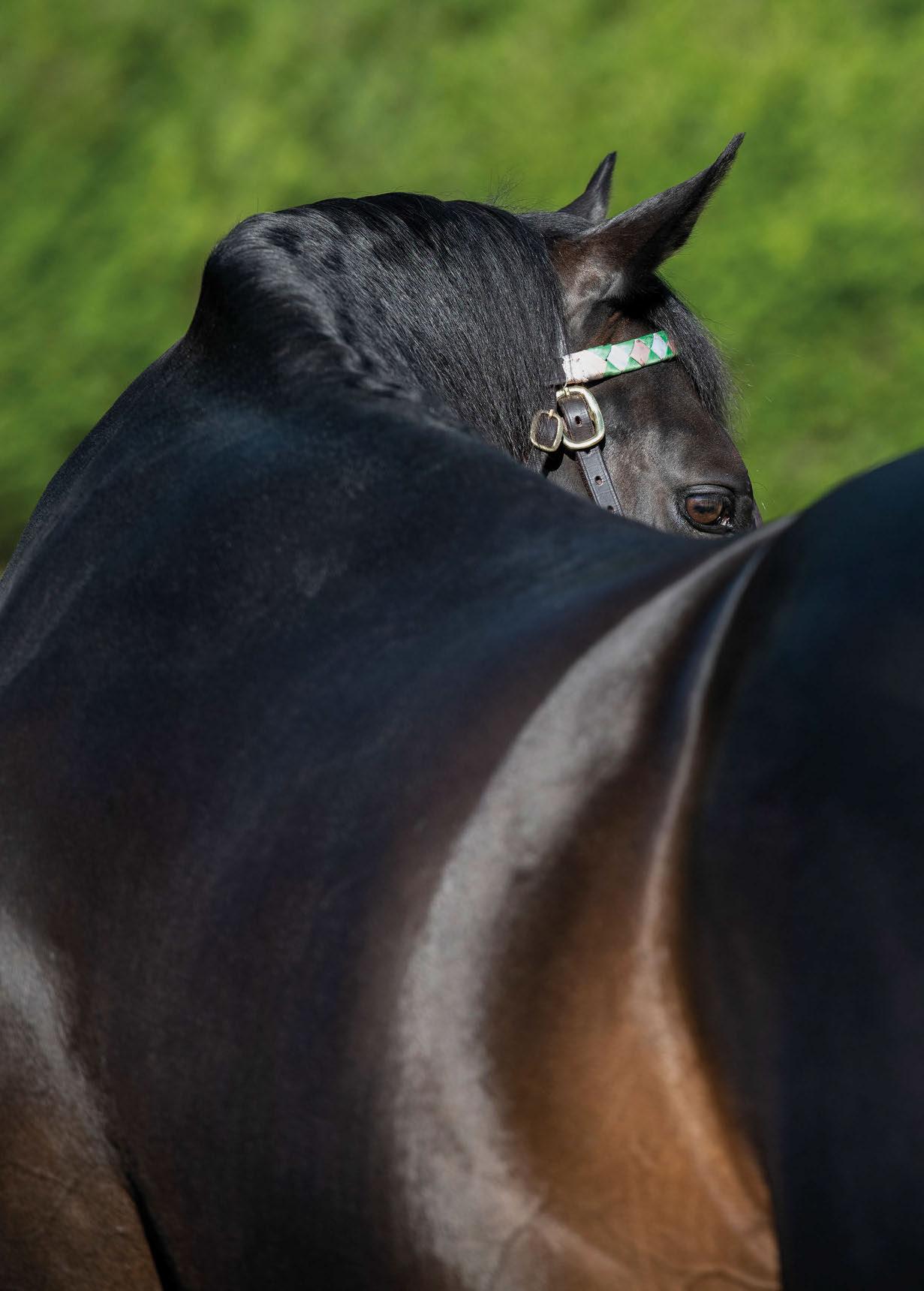
2yo winners this year
JULIET
Supported by some of Europe’s top breeders over the last three seasons including:
Shaqab
Shira’aa Farms Ballylinch Stud Carisbrooke Stud Chasemore Farm Cheveley Park Stud
J. and Mrs Deer Ecurie des Monceaux Epona Bloodstock
Fittocks Stud Gestut Gorlsdorf Godolphin John & Tanya Gunther HH Aga Khan Haras d’Etreham Hascombe & Valiant John Camilleri Knocktoran Stud
Manister House Stud Meon Valley Stud Minster Stud Moyglare Stud Farm Newsells Park
The Niarchos Family Oceanic Bloodstock Owenstown Stud Ringfort Stud
Kildaragh Stud Rockclife Stud Skymarc Farm George Strawbridge Tinnakill Bloodstock Wertheimer & Frere Whatton Manor Stud
Editorial:
Editor: Nancy Sexton Thoroughbred GroupForbury Road,
Advertising:
Subscriptions:
The Owner
Thereis a common theme among the countless photos of Queen Elizabeth II at the races going back decades and that is her smiling persona. Her Majesty’s expression spoke volumes because she loved horseracing, loved having winners, and relished her days on the racecourse. The sport could not have wished for a better frontwoman.

The Owner Breeder
Editorial views expressed
Her Majesty’s passing is truly the end of an era – horseracing was blessed to have the support of the monarch, which galvanised international interest in events such as Royal Ascot and enabled the sport in Britain to stake and maintain its claim as the world leader.
times, including likely increased regulation on betting and the continued loss of horses to other jurisdictions that offer far superior prize-money. Having lost its greatest figurehead and most recognisable supporter, those discussions have now assumed greater urgency.
Alice Haynes is unbowed by the current economic climate and the trainer has made a name for herself in just a couple of seasons from her Newmarket base. Juvenile Lady Hollywood, owned by Amo Racing and Omnihorse Racing, has been the star to date, winning a Group 3 in France to set herself up for an audacious bid at the Breeders’ Cup next month.
Racehorse Owners
Every race meeting that the Queen attended was extra special because of her presence, regardless of the calibre of races being run. The crowds always responded to Her Majesty and not just in Britain, for she enjoyed racing all over the world. Owners, trainers and jockeys from overseas would talk with excitement about being in the paddock with the Queen when they raced at one of our headline festivals.
Racing is renowned as a sport that attracts all social classes and it could be said that Her Majesty was never closer to her people than when on a racecourse.
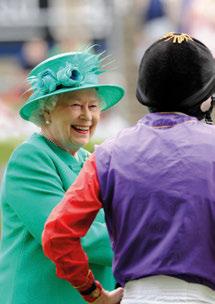
Most racing fans will have a favourite memory of one of the Queen’s horses, whether it’s the Gold Cup triumph of Estimate in 2013 or, for our more senior readers, the Classic successes of Dunfermline in Silver Jubilee year, 1977.
I recall a gelding called Whitechapel, trained by Lord Huntingdon. He was relatively modest by Her Majesty’s standards, but he caught my eye at Ascot one day because he was named after the area of London’s East End where my Grandpa grew up. That seemed a good enough reason to follow a horse!
Haynes tells Julian Muscat about her background in the sport, her approach to training and why she’s her own worst critic.
“Getting a pat on the back just for taking part is not how it should be,” she explains (The Big
Cover:
Whitechapel reappeared season after season, winning his final handicap at the grand old age of ten in, appropriately, the Queen Mother’s Cup, a race for lady amateur riders at York.
The sport’s leaders have recently agreed to collaborate on a way forward for British racing, which faces many challenges during these tricky
Interview, pages 34-38). “You need to learn from your mistakes and be tough on yourself, rather than consoling yourself by thinking that at least you tried. You’ve got to write a list of what you’ve done wrong and not do it again. You’ve got to push yourself.”
Set to join Haynes and Lady Hollywood at the Breeders’ Cup is Jason Hart, whose partnership with triple Group 1-winning mare Highfield Princess has been one of the stories of the season.
In this month’s back-page interview, Hart discusses his rise to become one of the north’s leading riders and how victory at Keeneland in November would put the cherry on an already outstanding campaign.
“The Queen was never closer to her people than when on a racecourse”
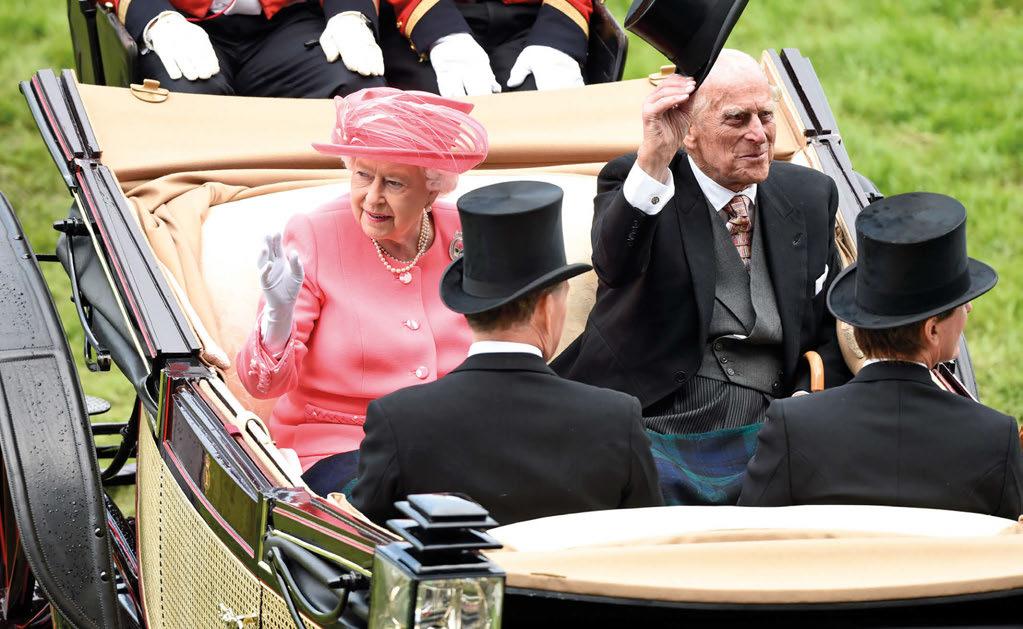
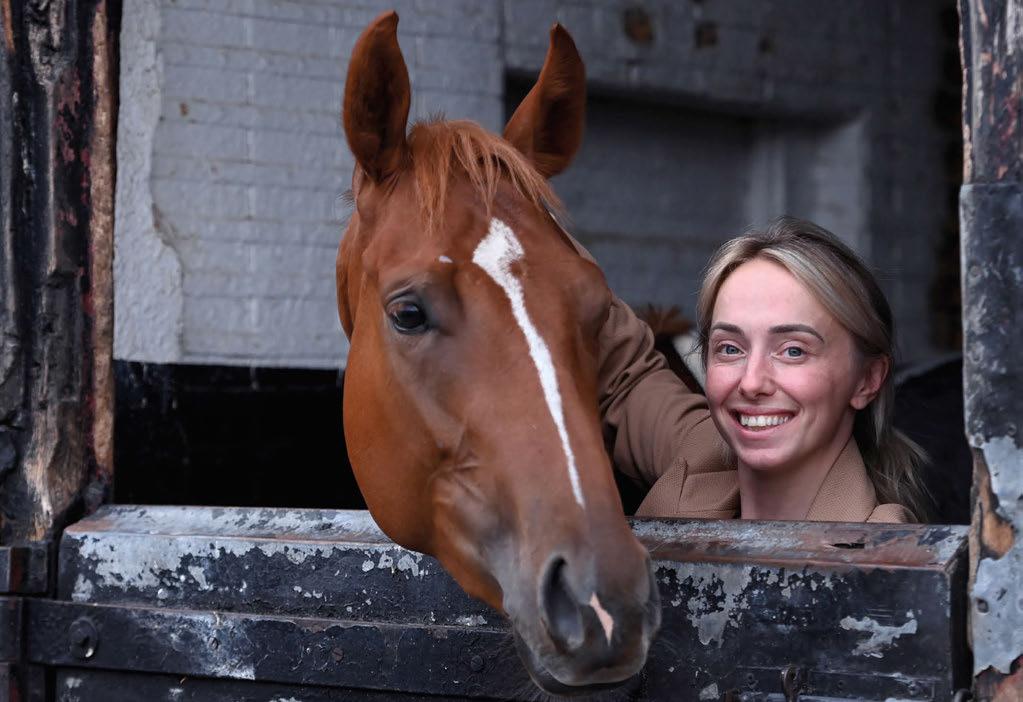
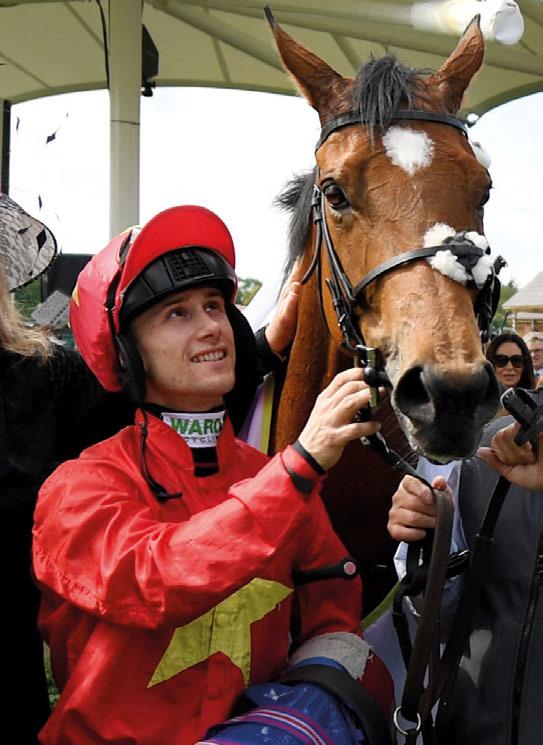
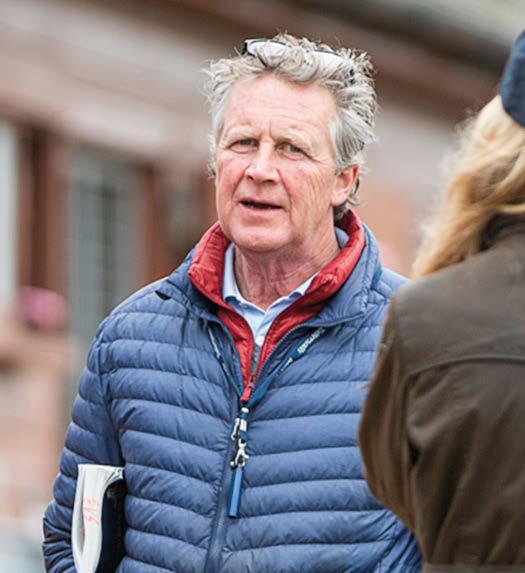
Grab the best seat in the house to watch Baaeed at this year’s British Champions Day –Saturday 15 October. Limited tickets are available for the ROA’s hospitality package in our exclusive private box in the Grandstand at Ascot Racecourse.
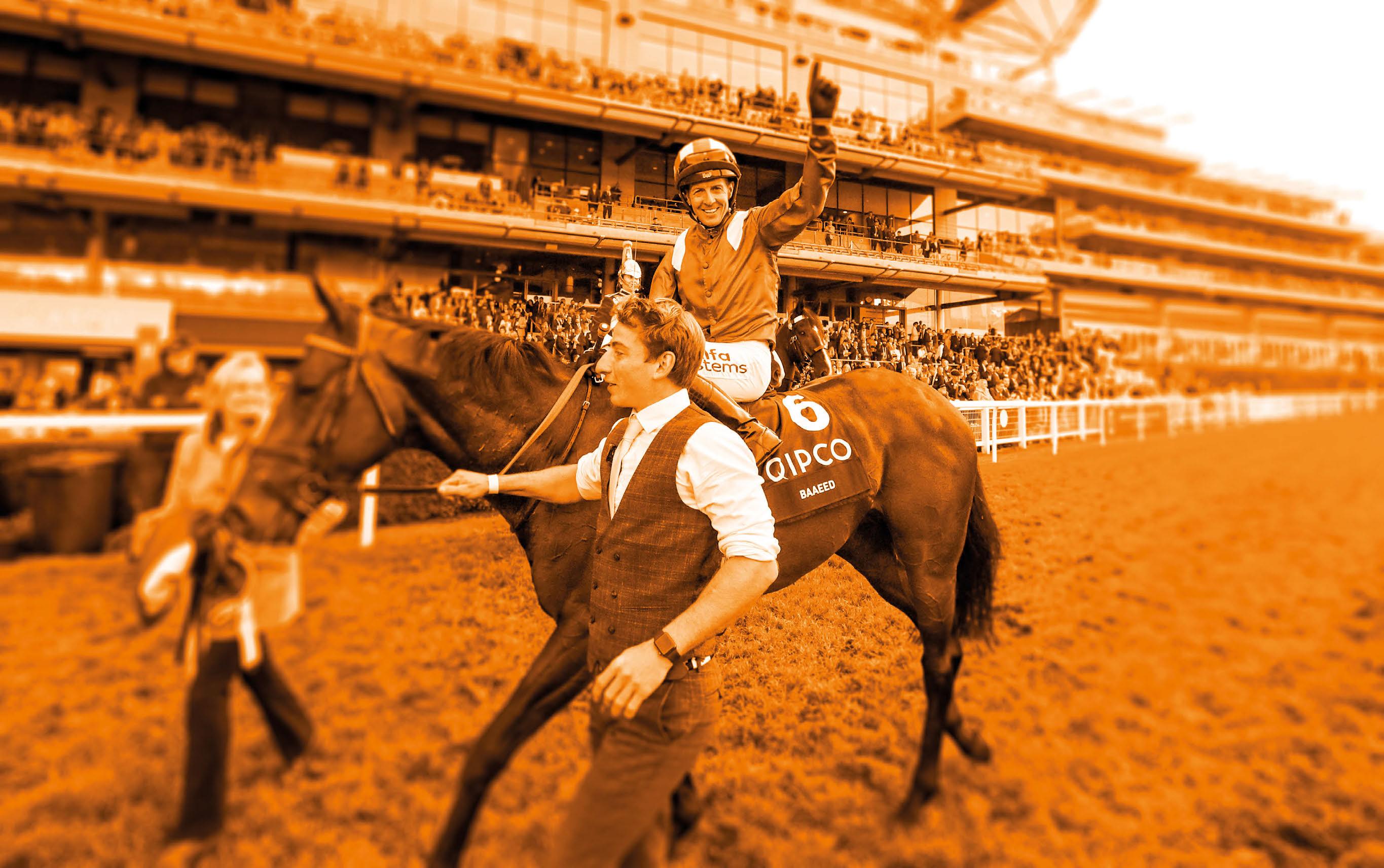
£375+VAT PER PERSON PACKAGE INCLUDES;
Edward VII enclosure admission badge and race card
park label
tea
bu et lunch
Complimentary drinks including champagne reception, house wine, beer and soft drinks
Thepast month has been one which no one in the UK or in horseracing will forget, with the passing of Her Majesty Queen Elizabeth II. Her loss will be felt in enormous proportions in British racing. The Queen was our most iconic and loyal ambassador and a hugely enthusiastic owner, breeder and racegoer.
The industry reacted in a sympathetic yet purposeful way upon learning of the news. Racing was commended for being deliberate and clear in its actions and I believe we achieved the right balance between being respectful and ensuring the continuation of the sport. It was an example of how the industry can pull together to work effectively, albeit under the saddest of circumstances.
After the pandemic, 2022 has returned to something like normal. However, the world has found itself faced with serious macro-economic issues brought on by the war in the Ukraine and other factors. British racing has also been staring down the Gambling Act Review and the Online Safety Bill, with possible catastrophic consequences for the funding of the sport.
On a more positive note, a change of leadership at the BHA has allowed a reset and a focus on the outlook over the next five to ten years. Senior racing industry leaders recently spent two days in London debating the future of the sport. While certain headlines over the summer have suggested some sort of Armageddon, the data pack that informed the discussions did not reflect that particular mood music. This year will have the highest prize-money on record and horses in training numbers are holding up, as are owner numbers. Owners and breeders have always traded bloodstock; it is not a new phenomenon and is what attracts investment from some people into the sport.
September’s highly collaborative meeting saw unanimous agreement that radical changes are required. There was mutual acknowledgment that there are multiple challenges to address and a long-term strategy is required. This strategy needs to be underpinned by real, quantitative insights, shared from across all constituent parts, to ensure a data-led approach.
The strategy will set out the vision for the sport from 2024 and beyond. Development and delivery of this strategy will reside with the BHA. This will be supported by a new governance structure, with a defined remit and clear accountability; in my opinion this has been missing in the past and has contributed to the lack of forward momentum.
Looking at the optics of the sport and setting out how to maximise the brand equity of our best races will form part of the strategy, with a deeper dive into how to improve our competitiveness, grow attendances, promote ownership and attract new audiences, both domestically and internationally.
This all begs the question as to why? Growth was the common
Charlie Parker Presidenttheme, driven by quality at the top end and opportunities further down the tree. Growth in revenues is both the goal and the consequence; the crucial element will obviously be an overall improvement in prize-money and returns to all participants.
Whilst 2024 and beyond was the focus, there must be some action taken in the shorter term. As a result, the near-term plan will look more specifically at race programming. It also has to look at more specific areas, such as the Quality Jumps Review and the issues surrounding summer jumping.
The next steps are critical and will seek to determine the framework and how this will be built out. A timeline already exists in terms of work required to have concluded by spring 2023 for
action in 2024. The BHA therefore has the best part of six months to consult, action and implement. The governance structure changes are crucial to getting this done; any delay on the proposals here will clearly impact the activation of the strategy.
A key win is acceptance that large-scale changes and innovation are required. As I have said many times previously, this is not simply a quick fix or temporary solution, and we need to avoid sugar-coating the problem and kidding ourselves that small, incremental changes will fix things.
Successful strategy planning and development is going to require cross-industry mobilisation – namely ensuring all participants are included, be it owners, customers, bookmakers, broadcasters and partners, such as the Levy Board and Racing Foundation. They all need to step up and be heard to help shape the future of the sport.
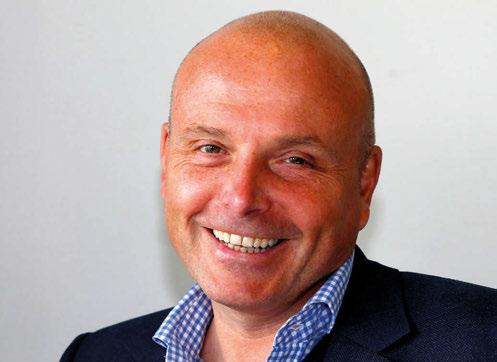
“A long-term strategy is required, underpinned by real insights, to ensure a data-led approach”
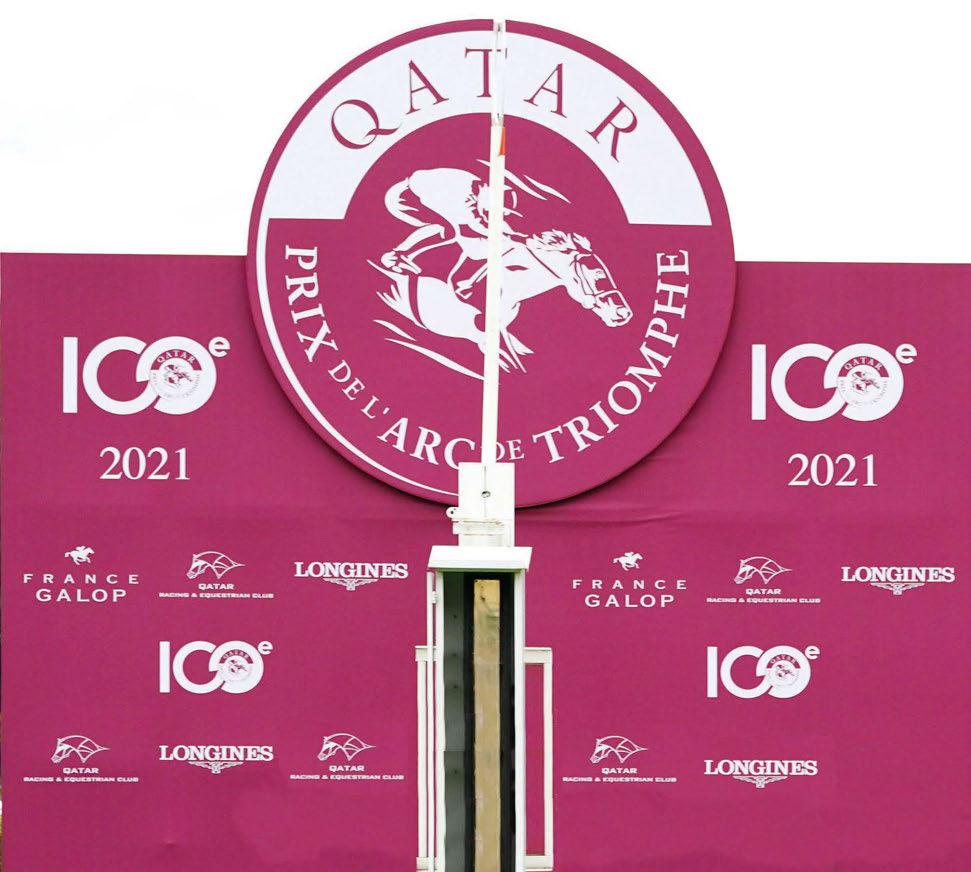
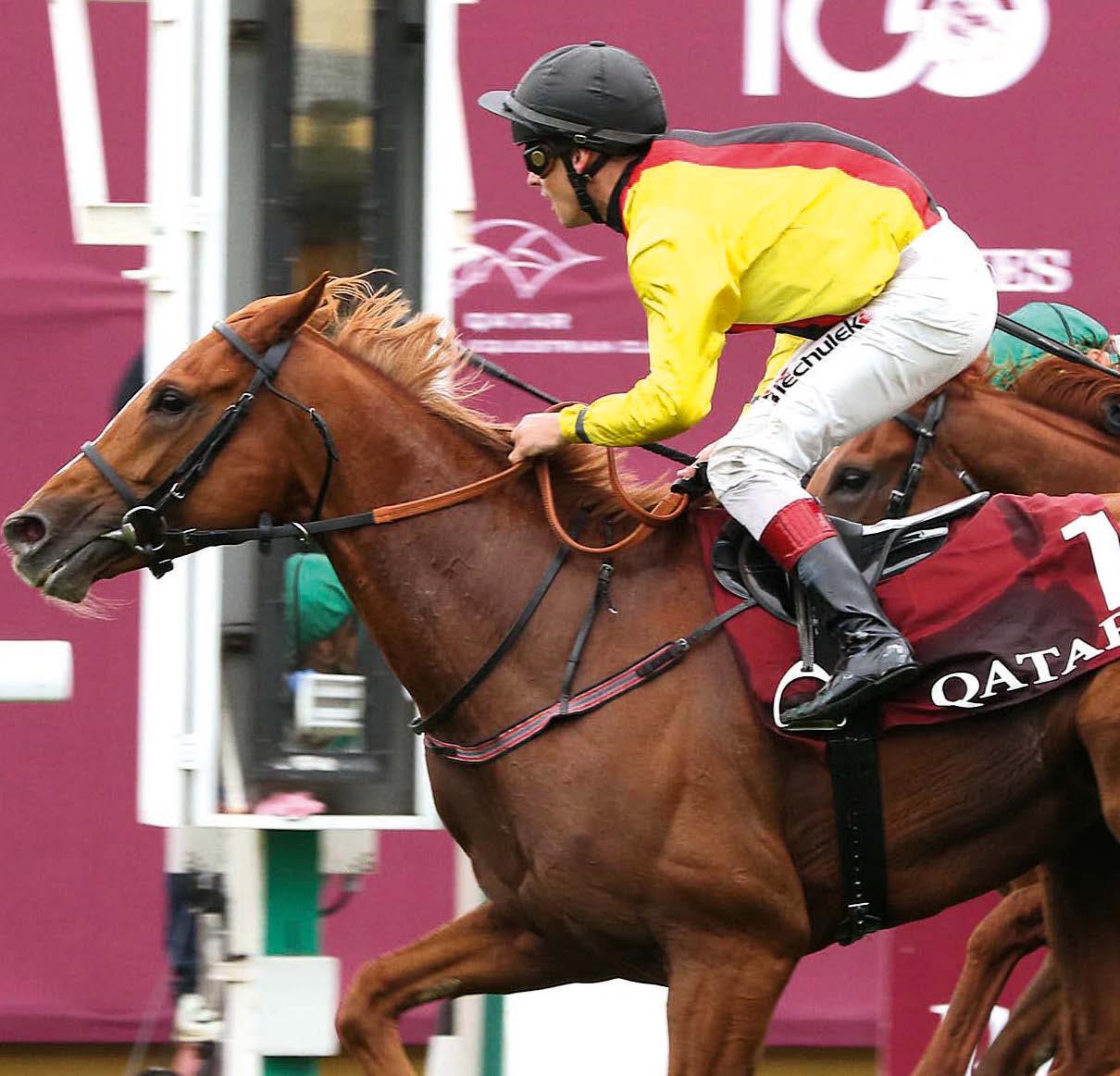


Theannouncement on September 8 that Her Majesty Queen Elizabeth II had died, just two days after the success of what proved to be her final homebred winner at Goodwood, came as a shock to all of us. However, it had special resonance for the TBA, since she had been our Patron since 1954, the year after her coronation.
Eight days later we were able to pay our respects publicly at the annual general meeting held at Sandown Park racecourse, where on behalf of all members I reflected on the Queen’s outstanding contribution to and long-standing support of thoroughbred breeding in Britain and her success as an ownerbreeder across the decades.
In my opening address I said: “Her Majesty was the most ardent supporter of thoroughbred breeding and racing, and we were most fortunate to have such a Patron for such a long period of time.
“Her knowledge and interest ensured the Royal Studs enjoyed considerable success throughout her lifetime, and this along with her outstanding contribution to the industry was acknowledged in 2014 with the presentation of the TBA’s Andrew Devonshire award.”
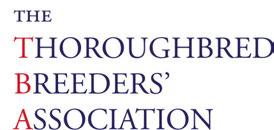
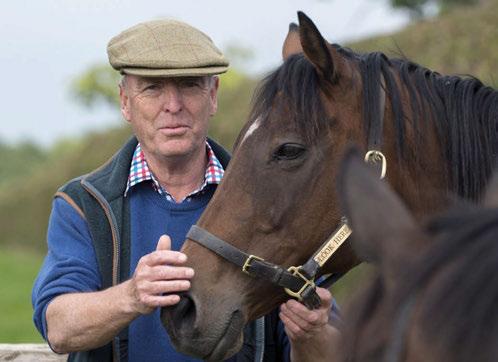
Looking back, the bronze trophy was handed over in a private ceremony hosted by the TBA, and a film of the historic occasion was shared with guests during the awards evening, while Her Majesty’s racing and bloodstock adviser John Warren shared with the audience how much the recognition was appreciated.
During the evening, Richard Lancaster, my predecessor as TBA Chairman, aptly commented: “It was an honour to be able to thank the Queen in person and present this esteemed award to the Patron of the TBA and a fine example of a committed and knowledgeable British breeder.”
Seven years later, in 2021, the TBA’s Flat awards again honoured royal success, when following the Queen’s finest year in terms of number of winners on the track, she was awarded the TBA Silver Salver.
The Queen, whose love for and passionate interest in the breeding and racing of thoroughbreds was well chronicled following her death, was at her most relaxed when amongst her horses, visiting her stud or seeing the horses training, and with breeders discussing pedigrees and conformation.
Her excitement at seeing a winner in her colours was obvious, and the fact that the dates of the Derby and Royal Ascot were the first entries in her diary every year demonstrated how keen she was to be there on the racecourse.
The Queen’s knowledge of pedigrees and stallions was well known, and the quizzical look she gave when you disagreed with
Julian Richmond-Watson Chairmanher over a particular stallion’s attributes or abilities was always reflected in follow-up questions wanting to learn more.
British racing has been blessed to have such a famous and well-respected patron for over 70 years and her enthusiasm and love for the sport undoubtedly contributed to its attracting new owners and breeders, who have seen how much enjoyment she derived from her passion.
The legacy of the Queen’s contribution to racing during her reign is impossible to quantify, but as the sport moves forward the aim must be to try to replicate the fun and enjoyment she had in being involved. Above all, Her Majesty recognised the creation of a magnificent animal in the thoroughbred racehorse, and the pleasure it brings can be enjoyed by all.
And so to the point of the sport, which the Queen acknowledged was just that, a thrilling and exciting sport, in which she participated as an equal with every other breeder and owner. Her Majesty knew the ups and downs of racing but she enduringly kept being involved for the pleasure of watching the thoroughbred perform and the thrill of success.
As the strategy for racing moves forward, we should continually remind ourselves that promoting the theatre, the excitement and the unpredictability of the sport is how we are going to drive interest in owning, breeding and watching at every level.
The Queen had horses rated from 60 to 120 and understood how difficult it was to breed a good horse, but we all have that chance and we must encourage others to make the investment and to dream of success.
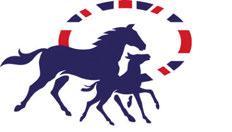
“The pleasure of watching the thoroughbred perform and the thrill of success kept Her Majesty involved”
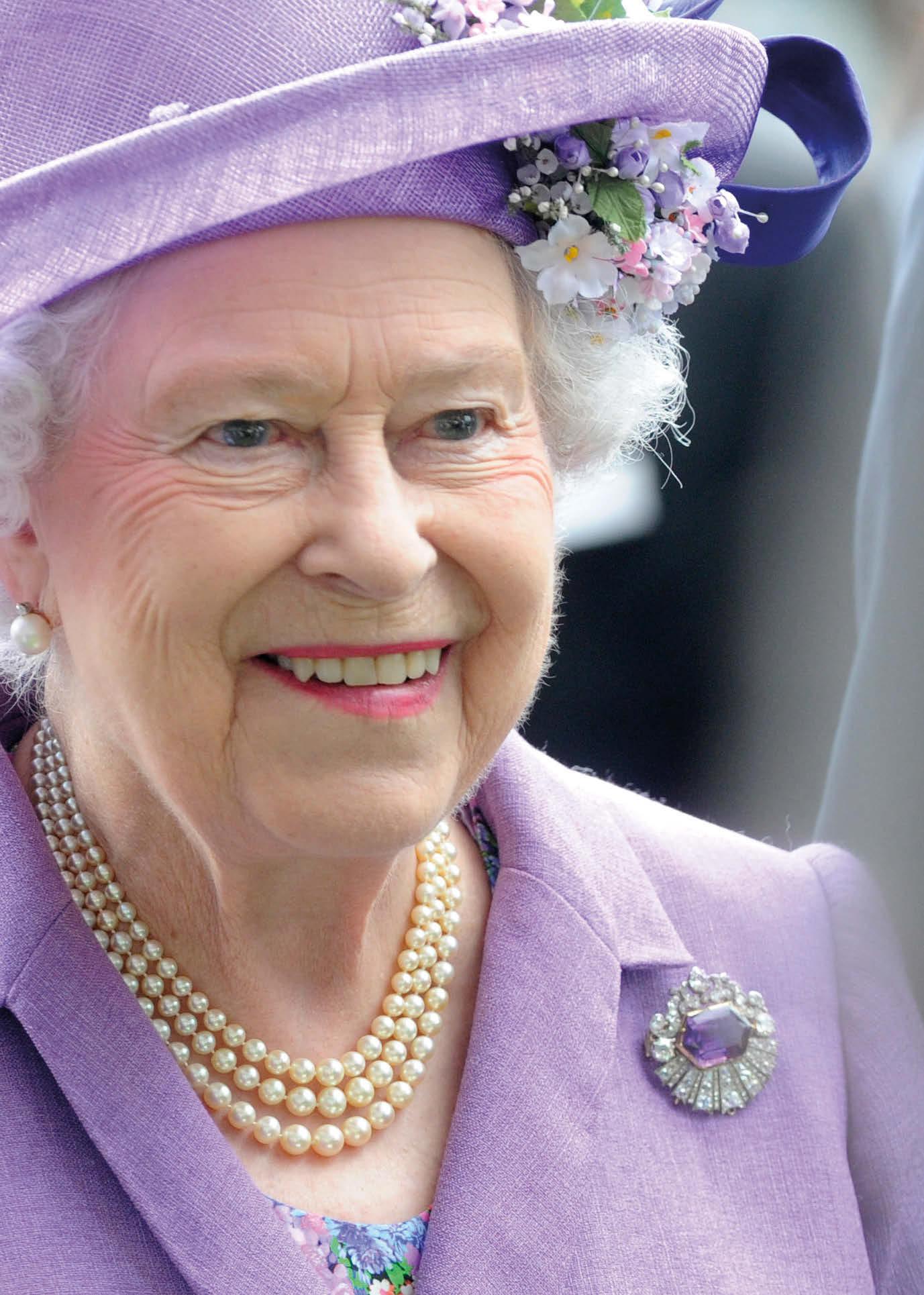
Majesty Queen Elizabeth II, who died at her Balmoral estate on September 8 at the age of 96, was Britain’s longest-reigning monarch. Her passing came only months after the Platinum Jubilee events that marked the Queen’s 70-year term as sovereign, a historic milestone celebrated not just in the UK but all around the Commonwealth.

The number of people, estimated at around 250,000, who queued over many hours to pay their respects during the lying-instate period underlined the reverence and affection felt towards Her Majesty, who acceded to the throne upon the death of her father, King George VI, on February 6, 1952.
For the sport of horseracing in Britain the death of the Queen represents a huge loss; she was undoubtedly the most famous racehorse owner and breeder in the world, her passion and commitment to the thoroughbred remaining steadfast well into her tenth decade.
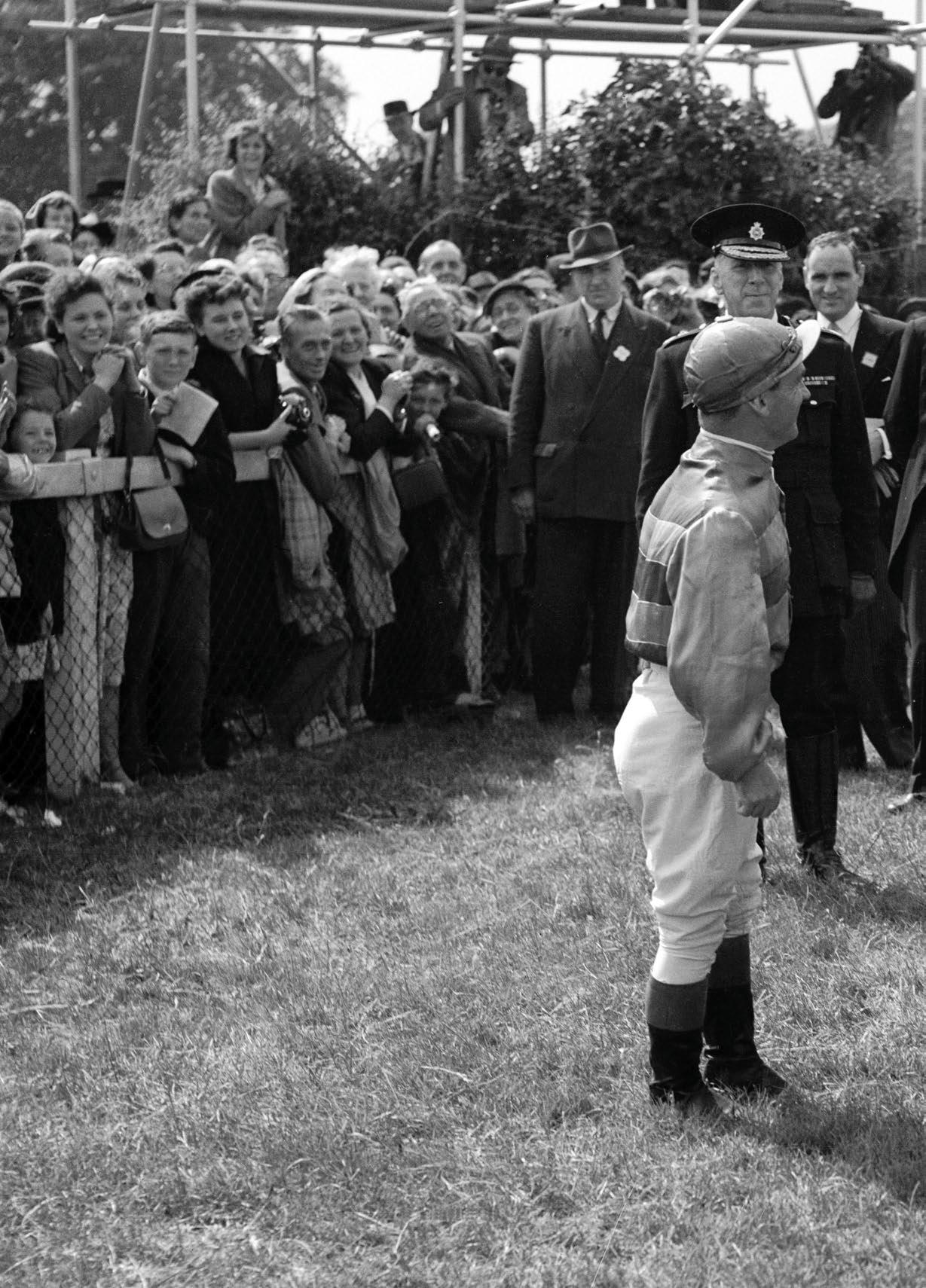
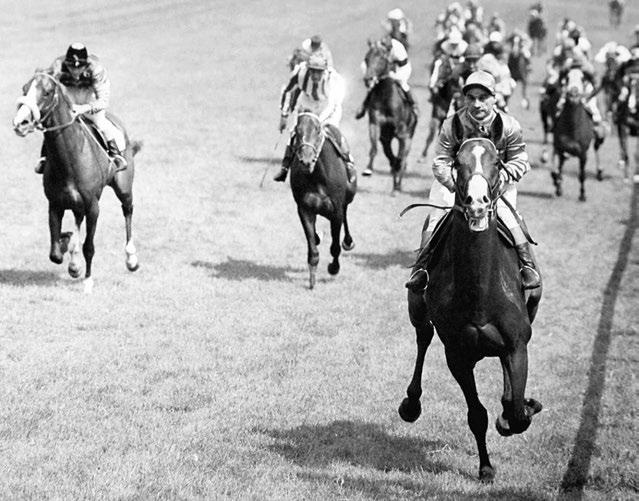
The Queen received her first pony, Peggy, as a 4th birthday present and was a capable rider by the age of six. An accomplished horsewoman, the Queen loved animals and was never more at home than when in the company of her beloved horses and dogs. How fitting it was that Her Majesty’s favourite Fell pony Emma, and corgis Muick and Sandy, were present as the Queen made her final journey to be laid to rest at St George’s Chapel at Windsor Castle.
In the 1992 documentary ‘Elizabeth R: A Year in the life of the Queen’, made by the BBC to mark the monarch’s Ruby Jubilee, Her Majesty stated that “continuity is very important”. To that end she understood the significance of her inheritance of the royal racing and breeding operation.
The documentary shows Her Majesty driving into Wolferton Stud at Sandringham to view her horses. Talking about her involvement in the sport, the Queen explained: “I have the stud and it’s my responsibility. King Edward put the stud here. He enjoyed racing and I
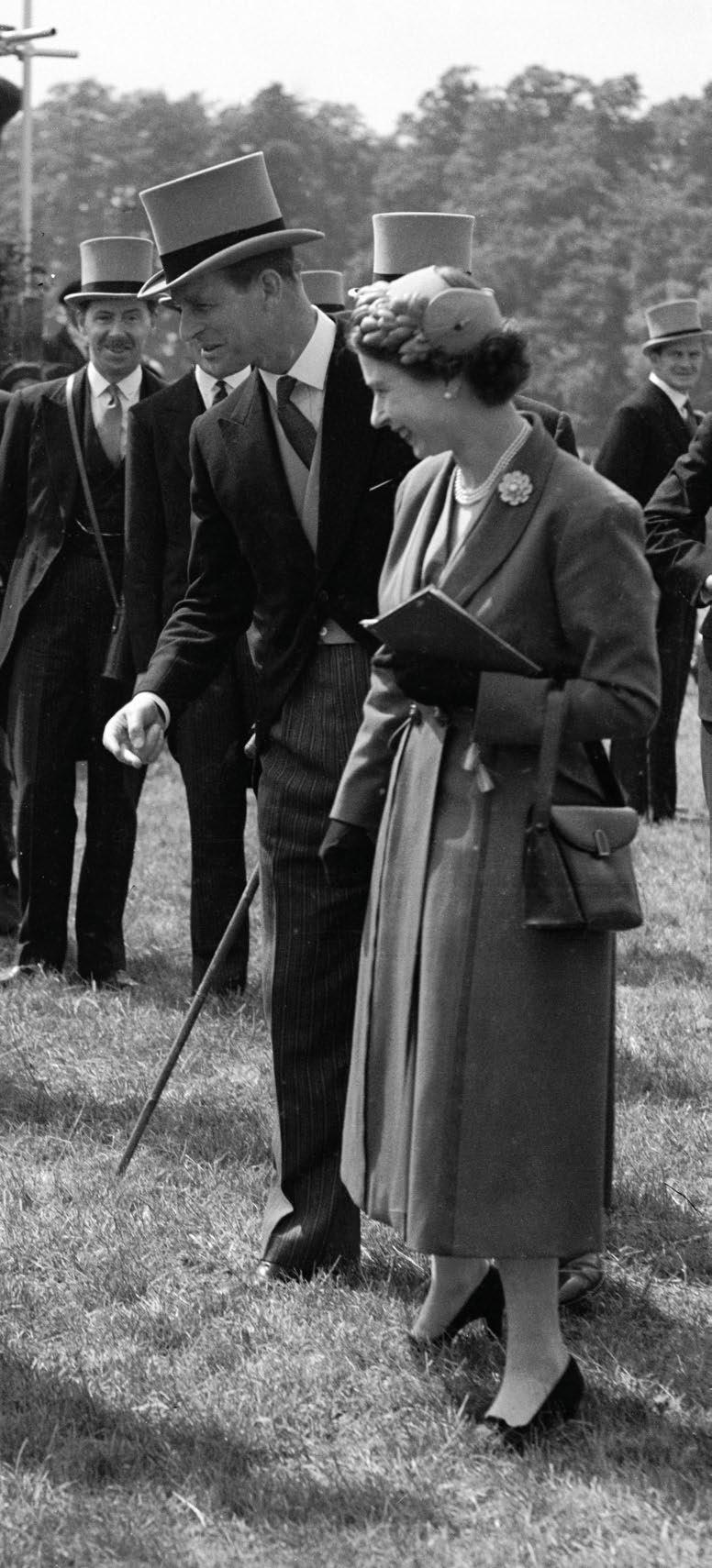
think we have all enjoyed racing. But it isn’t a profitable venture at the moment because the problems of racing are so very great.
“I think as a human being one always has hope. And one always has perhaps the gambling instinct that one’s horse is going to be better than the next man’s horse. That’s why one goes on doing it.”
King Edward VII, the Queen’s great grandfather who as Prince of Wales established the stud at Sandringham in Norfolk in 1886, was the first reigning monarch to win the Derby when homebred Minoru triumphed in 1909. He initially had horses in training at Kingsclere in Hampshire with John Porter; the royal link continues to this day with the Andrew Balding stable (see panel, page 18).
One of the first mares the Prince of Wales had installed at Sandringham was Perdita II, a daughter of Hampton purchased for 900 guineas. She
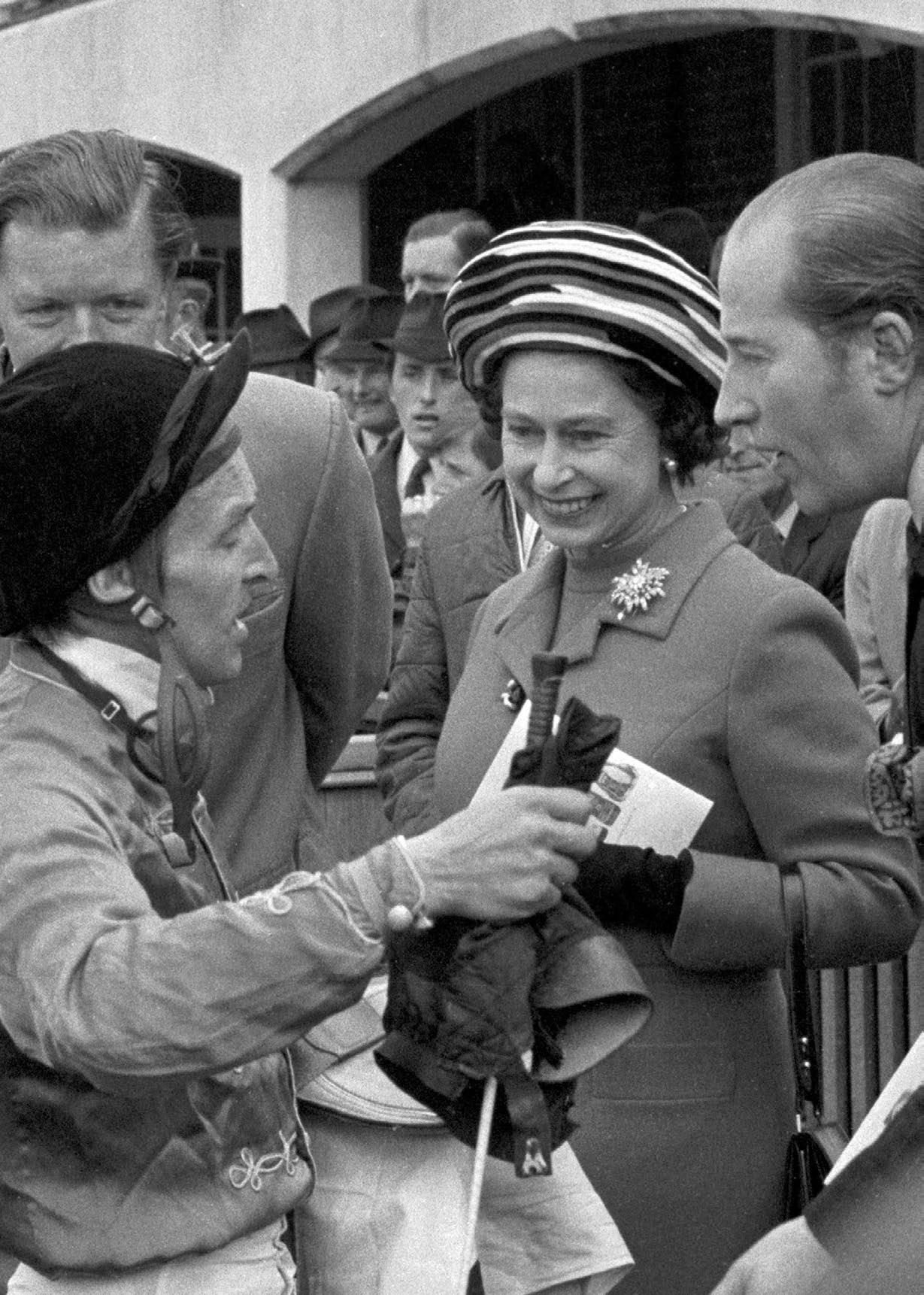
Joe Mercer debriefs the Queen and racing manager Lord Porchester after his victory on Highclere in the 1974 1,000 Guineas, narrowly holding off the late thrust of favourite Polygamy and Pat Eddery to take the fillies’ Classic by a short-head (below)
produced the Derby-winning brothers Persimmon (1896) and Diamond Jubilee (1900), the latter also taking the 2,000 Guineas and St Leger to claim the Triple Crown for his owner-breeder.
The Queen’s grandfather, King George V, owned and bred a single Classic winner in Scuttle, successful in the 1928 1,000 Guineas, a race her father King George VI captured with Sun Chariot (1942) and Hypericum (1946).
On a family visit to the stable of trainer Fred Darling at Beckhampton to view Sun Chariot, later successful in the Oaks, and her stablemate Big Game, the 2,000 Guineas victor also owned by the King, the 16-year-old princess is reported to have patted each animal and been so enthralled that she didn’t wash her hands for several hours. That devotion to thoroughbreds would continue for the entirety of her reign and her enjoyment of the sport ensured that the five days of Royal Ascot and Derby day at Epsom were sacrosanct in Her Majesty’s diary each year.
The Queen came closest to securing a Derby victory on her very first attempt in 1953 with the temperamental Aureole, a son of Hyperion trained by Cecil BoydRochfort. Aureole was a leading fancy for Epsom following an easy victory in the Lingfield Derby Trial.
In what was called the ‘Coronation Derby’ – the Queen’s coronation had taken place only four days earlier –in front of an estimated 500,000 racegoers, Aureole, who gave his rider Harry Carr a hard time before the race, ran on well for second but couldn’t catch
Pinza, providing jockey Gordon Richards with his only Blue Riband victory.
A month later, Choir Boy, who had been the Queen’s first winner as sovereign the previous year, gave Her Majesty the first of 24 Royal Ascot wins in the Royal Hunt Cup.
Aureole proved himself a top older horse in 1954 when his victories included the Coronation Cup and, fittingly, King George VI and Queen Elizabeth Stakes. In an era when most domestic owner-breeders maintained no more than 30 broodmares and around 40 horses in training, his earnings helped the Queen to become the leading Flat owner that year, when the Noel Murlesstrained Landau also shone for Her Majesty, winning the Sussex Stakes at Goodwood.
The Queen was champion owner again in 1957 when Carrozza gave her a first Classic success in the Oaks under Lester Piggott, while royal homebred Pall Mall claimed the 2,000 Guineas in 1958. The decade also featured high-class performers Almeria, winner of the Ribblesdale Stakes, Yorkshire Oaks and Park Hill Stakes, Agreement, who outpointed Almeria in the 1958 Doncaster Cup, along with the talented half-brothers Above Suspicion and Doutelle.
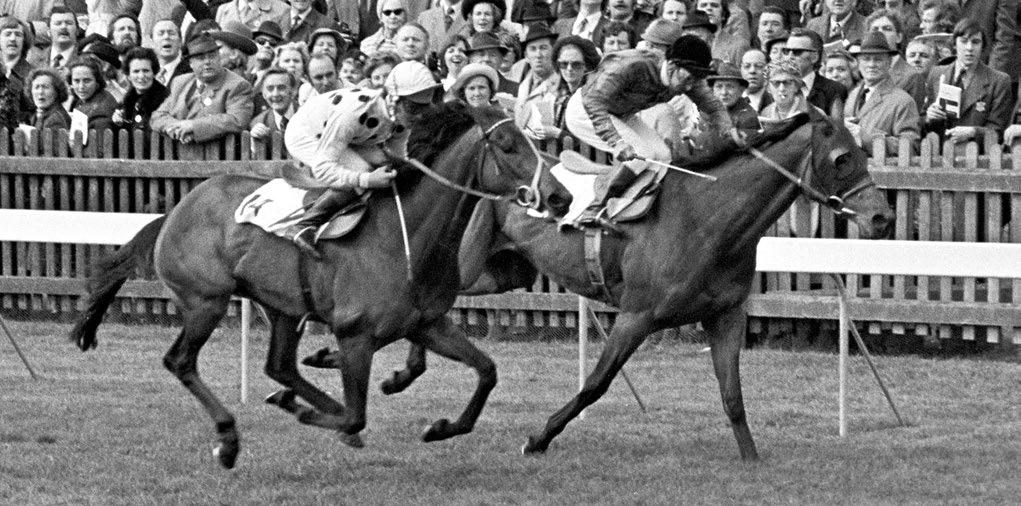
If the 1950s had been gloriously productive for the Queen’s runners, the 1960s proved less so, two highlights being Canisbay’s victory in the 1965 Eclipse Stakes and the cross-Channel raid of Aureole’s son Hopeful Venture in the 1968 Grand Prix de Saint-Cloud.

However, the 1970s saw the royal colours back at the Classic table, thanks to the top-class homebred fillies Highclere and Dunfermline, both handled expertly by Major Dick Hern. Highclere, by Brigadier Gerard’s sire Queen’s Hussar out of Hypericum’s daughter Highlight, didn’t look out of the ordinary at two, winning one of her three starts, and wasn’t among the favourites when she reappeared at three in the 1974 1,000 Guineas.
In a terrific finish at Newmarket, Highclere and Joe Mercer, racing up the rail, held off the late surge of favourite Polygamy and Pat Eddery, gaining the spoils by a short-head to spark scenes of jubilation on the Rowley Mile.
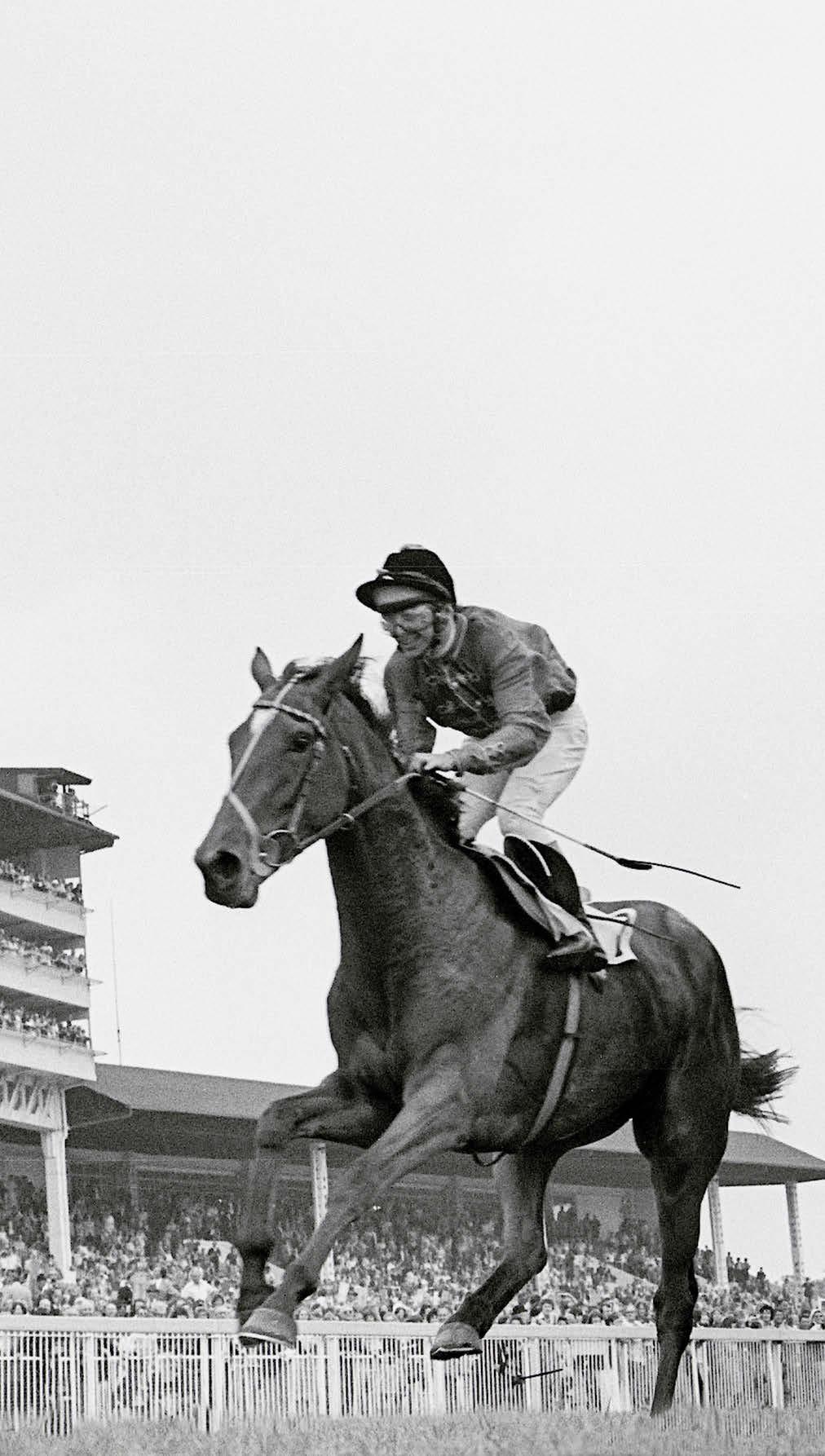
Taken to France for her next start to contest the Prix de Diane over an extended ten furlongs, Highclere posted a more impressive performance, defeating Comtesse De Loir by two lengths, much to the delight of the Chantilly crowd and Her Majesty, who invited the trainer and jockey back to Windsor Castle for a celebratory meal that evening.
In a 2020 interview, Mercer said: “Chantilly suited Highclere. I know there’s a little bit of downhill, but the last four and a half [furlongs] are uphill. She went round there like a good’un. She was never off the bridle, the gaps came, she cruised up there, [one] backhander and away she went. She was very, very good on the day. I was thrilled to bits to win the Guineas – with the [French] Oaks on top it made it even better.
“After the race we had a few bottles of champagne and got on the plane to fly back. It was wicked weather – rain, thunder, the lot. The pilot turned round and told the Major we were wanted at Windsor Castle for dinner that evening. He said we couldn’t go because we had no clothes to change into and our cars were at such and such a place. But the pilot said, ‘Her Majesty insists that you come as you are’.
“We landed and were met by two limousines and driven to Windsor Castle. We were told to give our car keys to the chauffeurs who went to pick up our cars. The Queen met us at the door – it was pouring down with rain and we looked a mess – and she said, ‘My heroes’.
“After a quick wash-up to make ourselves a bit smarter, we had a marvellous meal, some very good wine, and I don’t think we left until 11.30pm. Then we were driven home in our cars. It was a fantastic thrill.”
In Silver Jubilee year, 1977, Her Majesty enjoyed a Classic double with
“Willie Carson described Dunfermline as ‘big, rangy and plain’”
Dunfermline and Willie Carson stay on best of all to capture the 1977 Oaks in Her Majesty’s Silver Jubilee year; the Queen, who wasn’t in attendance at Epsom, is seen above with Lord Porchester (holding top hat), Michael Oswald (centre) and Dick Hern after Buttress’s win in the Queen’s Vase at Royal Ascot in 1979
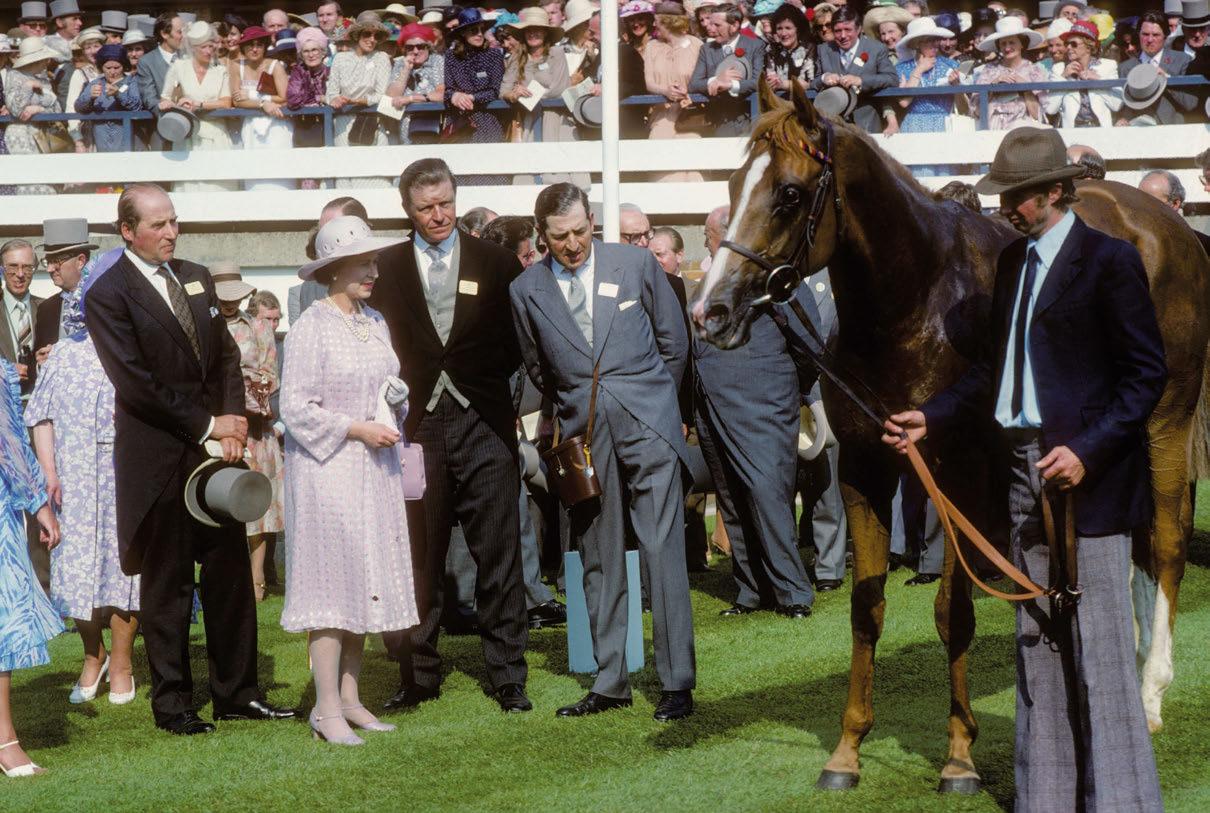
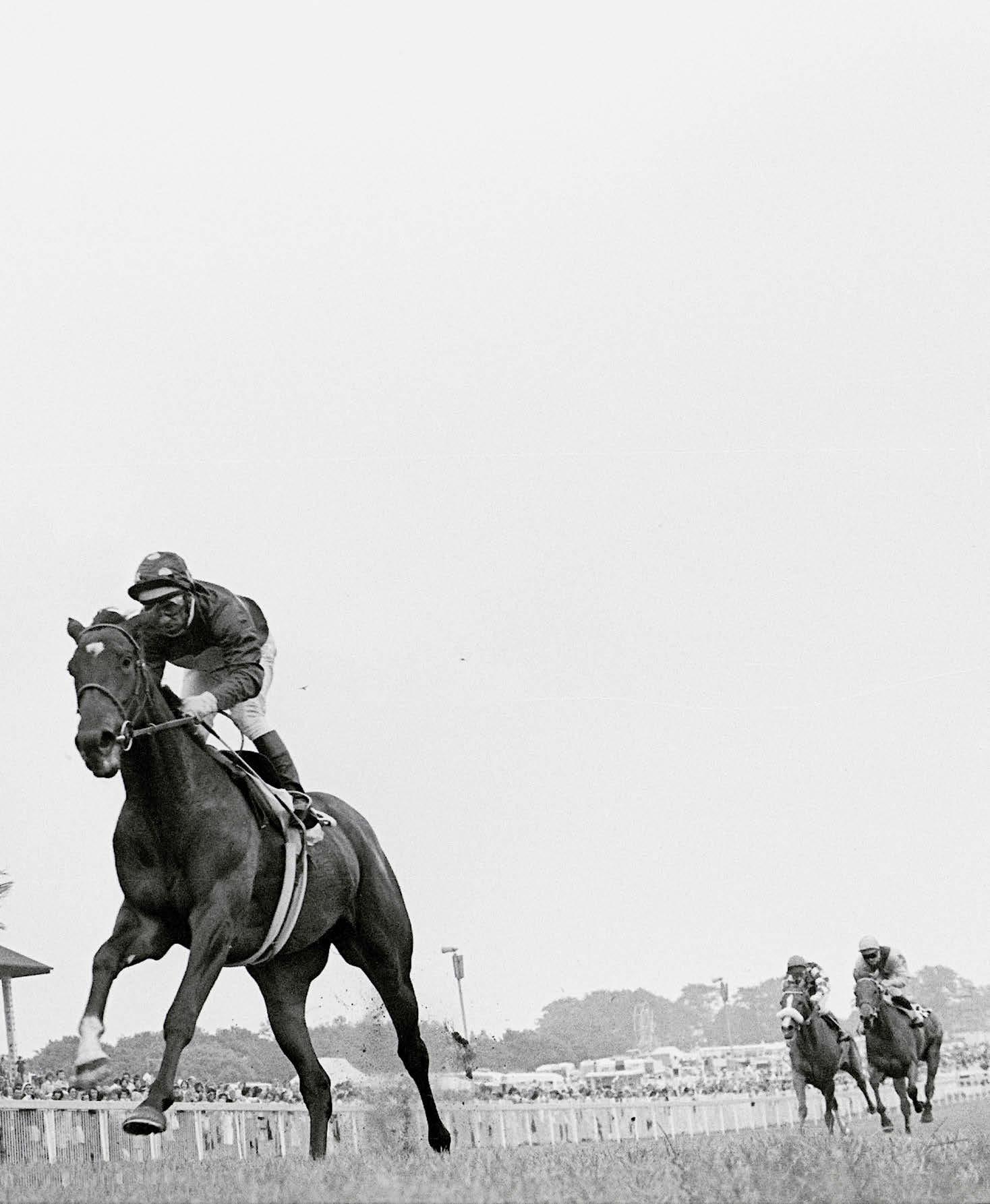
Dunfermline, described by regular pilot Willie Carson as “big, rangy and plain”. In the Oaks at Epsom, the daughter of Royal Palace showed stamina was her strong suit by overhauling Freeze The Secret and Vaguely Deb inside the final furlong, looking every inch a St Leger candidate.
The Vincent O’Brien-trained Alleged and Lester Piggott looked formidable opponents in the final Classic at Doncaster but Carson’s gameplan worked perfectly, tracking the hitherto uneaten colt and taking the lead approaching the final furlong to inflict the first and only defeat of Alleged’s career. Alleged subsequently captured the Prix de l’Arc de Triomphe, winning the Longchamp showpiece again in 1978.
“The Leger proved just what a good filly Dunfermline was,” Carson told The Owner Breeder earlier this year. “There was a lot of chat about Alleged as he had won the Great Voltigeur [by seven lengths] – the St Leger ended up being the only time he was beaten. She had to
be a good filly to do that.”
Retired to the paddocks after a disappointing four-year-old season, Dunfermline left behind only four foals, including a single filly unable to extend her line. Highclere, however, went on to become an important member of the Royal Studs’ broodmare band as the dam of Fillies’ Mile heroine Height Of Fashion, herself a bedrock mare of Sheikh Hamdan’s Shadwell operation, and Princess Of Wales’s Stakes winner Milford.
The horses were by then managed by Lord Porchester – latterly Lord Carnarvon – and with Lord Huntingdon assuming some of the training duties, the Queen’s colours became a regular sight on the international stage.
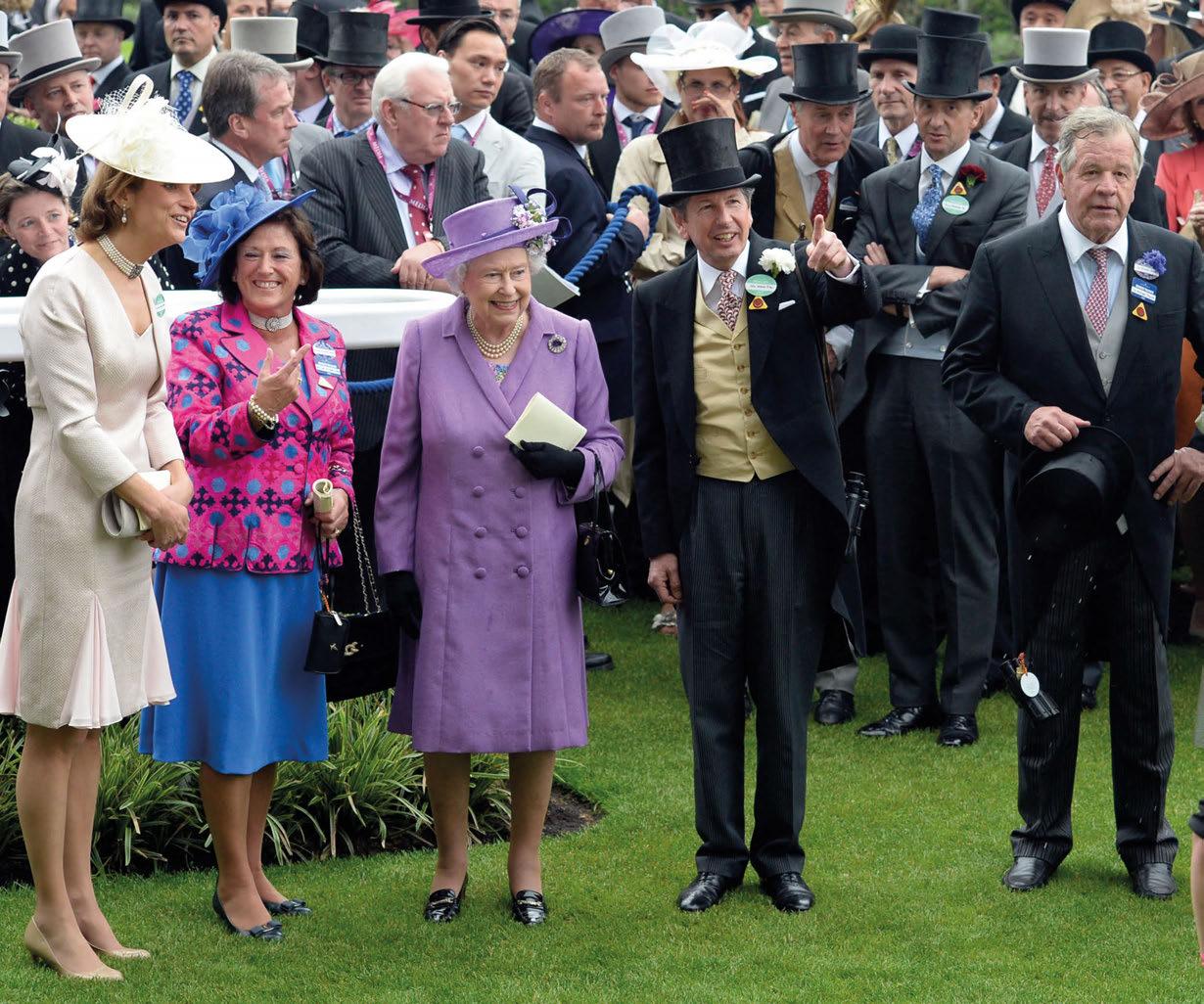
In 1989 there were a first American winner when Unknown Quantity landed the $100,000 Arlington Handicap at Arlington Park, while other royal runners such as Starlet, Enharmonic and Sharp Prod each won Group races on the continent and Arabian Story ran sixth
in the 1996 Melbourne Cup. Closer to home, Phantom Gold won the 1995 Ribblesdale Stakes under a jubilant Frankie Dettori.
Homebred Blueprint had helped open the new century on a positive footing by scoring in Group 2 company at Newmarket, but sadness was to come in September 2001 with the death of Lord Carnarvon, who had acted as the Queen’s racing manager and adviser since 1970. He was succeeded by sonin-law John Warren, who became a constant companion to the Queen at the races for over two decades.
In 2011 the Darley-bred Carlton House carried the hopes of the Queen and the nation when he ran in the Derby. Ryan Moore gave Carlton House every chance to claim Classic glory yet ultimately he was not good enough, finishing third, beaten a length, as Pour Moi and Mickael Barzalona claimed the prize in an extraordinary climax, the winning jockey standing bolt upright and celebrating before his mount had
crossed the finish line.
Thirty-six years after Dunfermline toppled Alleged on Town Moor, Her Majesty became a Group 1-winning owner again in Britain when Estimate and Moore edged home in the 2013 Gold Cup, as the Queen became the first reigning monarch to claim Royal Ascot’s headline event.
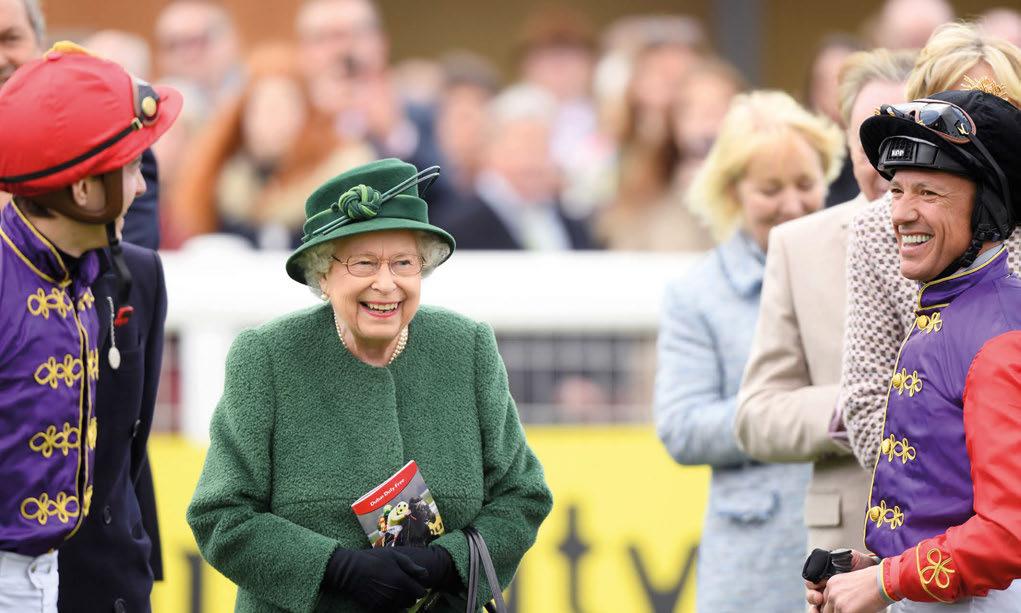
Estimate, five-length winner of the Queen’s Vase at the previous year’s royal meeting, had to show her battling qualities on this occasion, gamely holding off Irish challenger Simenon and Johnny Murtagh to score by a neck
The animated scenes that day in the Royal Box, with Her Majesty, Warren and their entourage cheering the royal runner home, were broadcast around the world and showed that 60 years after her first Royal Ascot win with Choir Boy, the Queen’s passion for thoroughbreds and racing burned as brightly as ever.
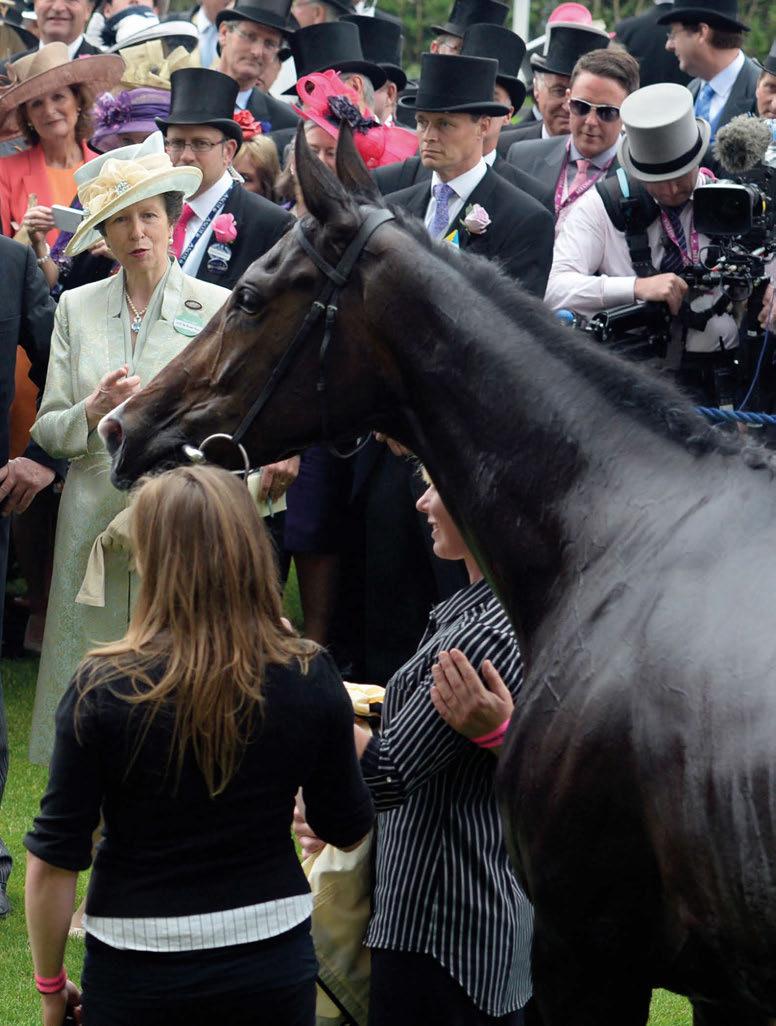
Others to thrive during Warren’s watch included Right Approach (a Group 1-placed miler for the Queen before becoming a Group 1 winner in Dubai), Group 2 scorer Interlude, Oaks ››
The Queen welcomes back the Sir Michael Stoute-trained Estimate after her victory in the 2013 Gold Cup, and below, sharing a joke with royal riders Frankie Dettori (right) and James Doyle at Newbury in April 2019
I last spoke to Her Majesty on the morning of Saturday, September 3 when Tactical ran at Ascot. On the morning of a runner you would always speak to the Queen. She was very bright, cheerful and positive – and looking forward to the race. She had such enthusiasm for racing, it was remarkable.
It was standard for the Queen’s trainers to ring her at 10am – Her Majesty would be reading the Racing Post and wanting to hear about not just that day’s runners but the other horses in training. We’d give the Queen an indication of what we were expecting – it was a system that worked well for her and was a great honour for us.
If you had a good winner you might speak to her afterwards too, but the debrief would usually be with her racing manager John Warren.
I was very lucky in that I inherited the horses from my father [Ian Balding]. The Queen inherited the Queen Mother’s horses that were based at Kingsclere. I took over from Dad and the horses were here. We had a lot of fun with horses like Banknote.
At one stage I think Dick Hern and Dad were her only trainers. She added more trainers, which was a really good thing because she loved talking to different people with a shared passion and it gave her great enjoyment.
First and foremost we are talking about someone with a love and understanding of horses. That was the number one thing. She loved the breeding side and hoped to breed topclass racehorses – that was her passion, as it is with many people of wealth and status because it’s a great vehicle for them to have a competitive side.
Like everybody involved in racing, the Queen loved
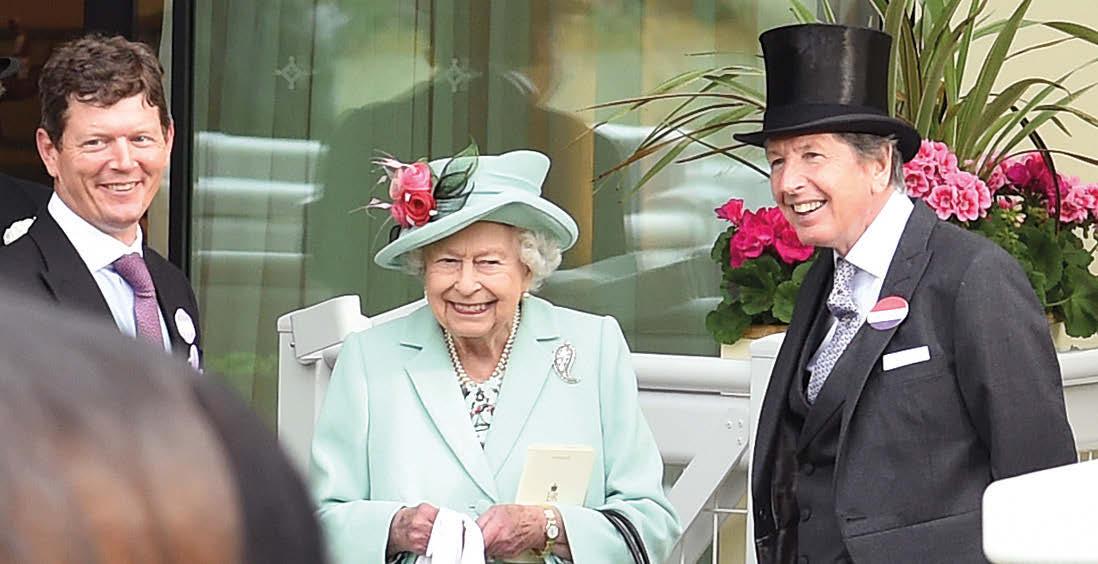
winning. Anyone who owns a racehorse must be competitive to some degree. It’s not just on the racecourse where things don’t always go so well – you have problems in training and injuries. She took the good news with the bad as all great owners do – the reaction would always be ‘let’s move on’, which is a great attitude to have.
The Queen gifted a Shetland pony to my parents called Valkyrie. She was the first horse Clare [Balding, sister] and I rode – the perfect starter pony. The Queen had originally been gifted Valkyrie and Prince Edward had started riding her before growing out of her – the Queen was keen to find her a new home. Valkyrie lived until she was 35 and whenever the Queen visited Kingsclere we would take Valkyrie down to show her, which she loved.
My abiding memory of Her Majesty is her enthusiasm and sense of humour. You can see it in photos where she’s smiling. She had an amazing disposition.
Any winner for the Queen was special but to win a Group 2 with King’s Lynn was particularly satisfying for everyone. I wish we could have done better for Her Majesty at Royal Ascot – she had no luck this year.
She was the most passionate supporter of our sport and the most well-known. The Queen is an impossible person to replace – there isn’t another individual who can fill that void. Racing was hugely fortunate that she developed the passion she did.
It was a huge honour to be asked to attend the Windsor service with my wife. It was an amazing occasion, being there with all of her trainers. It was extremely moving. The feeling of loss amongst the nation is extraordinary, but to be there in person was a huge privilege.
runner-up Flight Of Fancy, unbeaten Group-winning two-year-old Recorder and the high-class middle-distance performer Dartmouth.
Last year was the most successful for the Queen numerically with 39 wins, 36 on the Flat and three over jumps. Her famous silks – purple, gold braid, scarlet sleeves, black velvet cap, gold fringe – were most associated with the Flat, although, after inheriting her late mother’s horses, she owned plenty of winning jumpers including Barbers Shop, successful eight times under the tutelage of trainer Nicky Henderson.
That Barbers Shop enjoyed a successful second career as a show horse, winning a class at the Royal Windsor Horse Show, was a source of great pride to Her Majesty.
This season has also been successful, with a group of 20 winners including Temple Stakes victor King’s Lynn, March Stakes runner-up Perfect Alibi and the impressive juvenile winners Theme Park and Circle Of Fire. Last year’s Solario Stakes winner Reach For The Moon has also performed with credit, while Saga came within a whisker of Royal Ascot success in June when touched off in the Britannia Handicap.
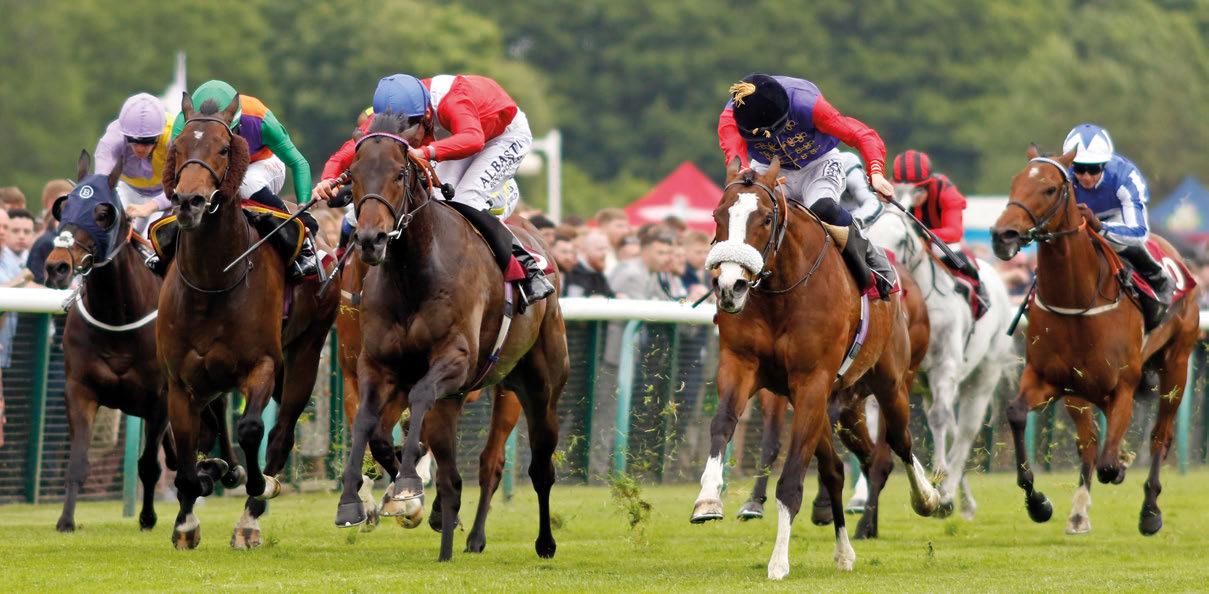
The Queen was a wonderful breeder with seemingly an understanding of the horse to match her knowledge of pedigrees. While several big names naturally did get away, notably Height Of Fashion – the fifth dam of unbeaten superstar Baaeed – many of the Queen’s best runners descend from families cultivated over a long period of time. Highclere and Height Of Fashion, for instance, were products of the famed Feola family as were Aureole, Above Suspicion and Hypericum.
Aureole later stood at Wolferton
Stud, where he became a dual champion stallion, notably as the sire of Derby hero St Paddy and Arc winner Saint Crespin III. In later years, his place on the Royal Studs’ roster was filled by Shirley Heights, Bustino, Motivator and Royal Applause.
The introduction of various families also reaped rewards. Doutelle had died young at Sandringham Stud and it was reportedly in light of her affection for the horse that the Queen instructed stud manager Captain Charles Moore to purchase a yearling by the stallion in 1961. Moore settled on a half-sister to
notably as the dam of Canisbay and granddam of Dunfermline.
More recently, the private purchase of Albany and Cherry Hinton Stakes winner Memory yielded three talented Galileo colts in Recorder, Call To Mind –another to thrive on the global stage by winning the 2018 Belmont Gold Cup –and Learn By Heart, while the stud has also welcomed top Australian sprinter Sweet Idea, sourced privately in 2015 out of her native country.
The Queen had long made use of various international bloodlines, starting in 1963 with Native Dancer on the Nearco mare Near Miss. In time, a significant group of royal mares came to be based in Kentucky, split between Lane’s End and Mill Ridge farms. More recently, she took advantage of Deep Impact in Japan as well as the opportunities afforded by the Aga Khan and Sheikh Mohammed, between them the sources of Estimate, Carlton House and Dartmouth among others.
the Queen Mary Stakes winner Weeber and the filly in question, Amicable, proved to be an excellent choice as winner of the Nell Gwyn Stakes. More importantly, it is her line that sits today behind Reach For The Moon via Phantom Gold, herself a granddaughter of the Queen’s 1979 Ribblesdale Stakes heroine Expansive.
Stroma, meanwhile, was picked out by the Queen herself during a visit to the Doncaster yearling sales. With a bid of 1,150gns, Captain Moore was able to secure the yearling for the Royal Studs. Stroma was stakes-placed at two but really came into her own at stud,
The result is that although success may have ebbed and flowed over the past 70 years, the stud has long benefited from a deep collection of families, some of them entrenched in royal history, others the products of breeders that the Queen undoubtedly held in admiration.
Most importantly, however, her presence in the sport, something that was a magnet for high-powered international investment, must never be underestimated. The Queen has been a remarkable figurehead for horseracing and one that will never be replaced.
It was subsequently confirmed that the horses owned by the Queen will continue to race in the royal silks in the ownership of her son, His Majesty King Charles III.
“The Queen has been a remarkable figurehead for horseracing”David Probert partners Her Majesty’s King’s Lynn (noseband) to success in the Group 2 Temple Stakes at Haydock earlier this year
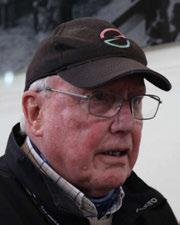
Former trainer Guy Harwood has led the tributes to eminent bloodstock agent James Delahooke, who died in September aged 77.
A renowned horseman with an extraordinary eye for a horse, Delahooke can be credited for laying the foundations of the Juddmonte bloodstock empire, his early purchases on behalf of the late Prince Khalid Abdullah providing the operation with families that would yield Frankel, Enable, Zafonic, Workforce and Dansili.
His partnership with Harwood also illustrated his ability to identify a potential athlete. The pair didn’t always have the luxury of large budgets yet proved time and again their ability to seek out value, especially during the late 1970s and 1980s when Harwood’s Coombelands Stables housed To-Agori-Mou, Kalaglow, ElaMana-Mou and Young Generation.
Dual Group 1 winner Ela-Mana-Mou was bought for just 4,500gns, while the
Evie Stockwell, mother of John Magnier and a successful owner-breeder in her own right, died last month at the age of 97.
Described in Vincent O’Brien’s official biography as a “lady of great style”, Stockwell most recently had a select group of horses running in her colours – the ‘Madonna blue’ and brown that belonged to her late husband Tom – each year.
Every winner brought her joy but in particular she relished the success of the Group 1-winning siblings Brave Anna and Hit It A Bomb, who between them won the Cheveley Park Stakes and Breeders’ Cup Juvenile Turf. The pair were out of Group 3 winner Liscanna, herself a
1984 King George hero Kalaglow cost just 9,000gns.
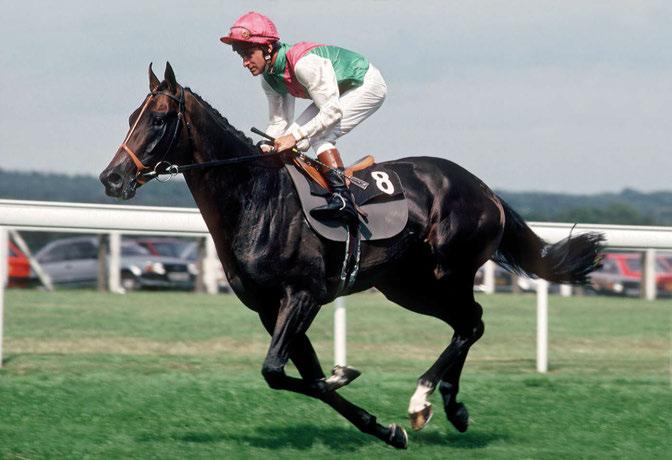
“He really was unique,” said Harwood. “Not only did he have a great eye for a
daughter of Stockwell’s Listed-winning mare Lahinch, named like several of Stockwell’s horses with a golfing theme in mind.
Other good horses to carry her famous silks include Fairyland, winner of the Cheveley Park Stakes and Flying Five Stakes, Luas Line, who was trained by David Wachman to win the 2005 Garden City Breeders’ Cup Handicap at Belmont Park, Toroca, who ran third in the 2001 1,000 Guineas and later landed an Italian Group 3, and Kitza, who was placed in the Irish 1,000 Guineas and Oaks.
Theann, named after Stockwell’s granddaughter Anthea, won the 2007 Summer Stakes at York and later produced Grade 1 winner Photo Call. She also owned Listed winner We Are Ninety with her twin sister Lady Mimi Manton.
Only last year Stockwell got a great kick out of Glounthaune winning the Killavullan Stakes; that colt ran a fine second in the Boomerang Mile at Leopardstown last month.
Stockwell, originally from Cork, wasn’t
racehorse but great pedigree knowledge as well. We met in 1973 when a group of five of us set up Stud and Racing Services. The idea was to promote our services to
born into racing but she enjoyed the sport growing up and in 1947 became fully immersed in the world when she married Tom Magnier, owner of Grange Stud in Fermoy, home of the great jumps stallion Cottage and 1946 Cheltenham Gold Cup winner Fortina, the only entire to ever win the race.
Tom Magnier died in 1962 and Stockwell was left with four children –John, Peter, David and Anne – to raise. John had been studying at Glenstal Abbey but left school at 16 to ensure the smooth running of Grange, then also a working farm. In time, of course, he would become the most successful stallion master of his time, his vision and skill key to driving Coolmore into the force it is today.
David manages Castlehyde and Grange Studs while Anne married Tony O’Callaghan, owner of Tally-Ho Stud; appropriately, the Mullingar farm bred both Fairyland and Glounthaune and both were by Kodiac, a stallion of whom Stockwell was particularly fond.
Peter was also a successful breeder at
the bloodstock industry and create a stallion syndication. It was well ahead of its time. James was appointed by me to buy the yearlings.
“James was the judge. I also had an opinion but he was the judge and he had a huge knowledge of it all and a wonderful eye for an equine athlete.
“In the early days it was very much what we could afford as we didn’t have a lot of money. But it was a lot of fun. In those days, we looked at every colt in the catalogue, and I think that’s why we bought so many good cheap horses, as we looked at everything.”
The pair were not afraid to search high and low for horses and if that meant tapping into international bloodlines, so be it.
“I remember we went to America in the 1970s,” said Harwood. “We were underbidder about ten times and then managed to buy a colt for $35,000. He was unfashionably bred but very goodlooking, and that turned out to be Recitation.”
By Elocutionist, Recitation was saddled by Harwood to win the 1980 Grand Criterium.
“That was the start of our American adventures,” he recalled. “We bought a lot of high-quality horses by good sires out of some of the lesser sales out there. In those days Keeneland would separate the sales – they’d sell in July and September, and
his Brittas House Stud and died in January 2019.
Eddie O’Leary, a close friend of Tally-Ho, paid tribute, saying: “I’ve known Mrs Stockwell for a long time now. She was an absolute lady, always put a smile on your face and knew how to put people at ease. She was a superstar. The world has lost two Queens this week.”
Nancy Sexton, The Owner Breeder’s Bloodstock Editor, said: “I had the pleasure of knowing Mrs Stockwell for the last few years. She had a remarkable zest for the sport, knowledge and by all accounts was an excellent judge of horse flesh.
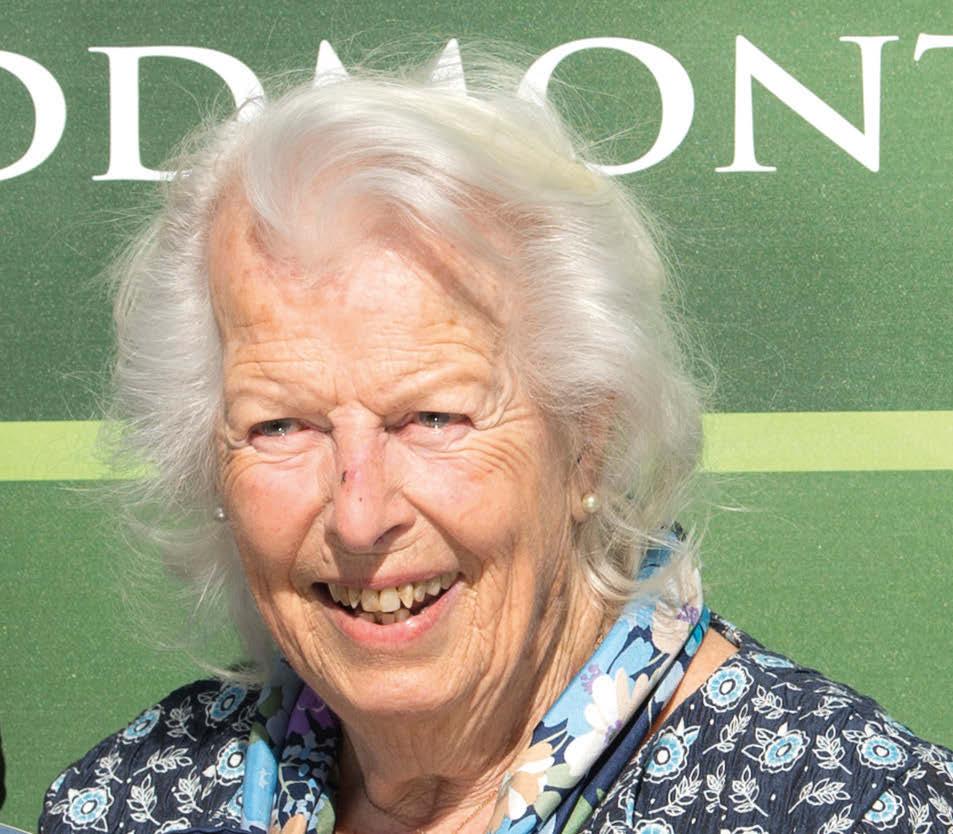
“I remember she took a great interest in the goings on at Tally-Ho Stud from her vantage point in the stallion yard and also naturally had a great pride in watching Coolmore develop into the juggernaut that it is today.
“Through her four children, the architects behind Tally-Ho, Coolmore, Brittas House and the Coolmore National Hunt division, she has left a remarkable legacy and is going to be sorely missed.”
often horses were in the second catalogue for one reason or another. But we did very well buying that kind of horse.”
Delahooke’s greatest achievement, however, was planting the seeds for Juddmonte’s immense success. Recruited to join Juddmonte in its fledgling years, he went on to secure numerous good horses for the Prince, ranging from the Arc winners Dancing Brave and Rainbow Quest to the top miler Rousillon, Group 1-winning sprinter Dowsing and champion two-year-old Bakharoff. There was also the purchase of a His Majesty filly for ‘just’ $350,000 as a yearling in 1982; subsequently named Razyana, she produced Danehill.
Rainbow Quest, who also won the Coronation Cup for Jeremy Tree, was the sale-topping colt at the 1982 Fasig-Tipton July Sale on a bid of $950,000. Dancing Brave was secured two years later at the same sale for $200,000 – certainly not an expensive figure for a horse that would go on to win the 2,000 Guineas, Eclipse and King George in addition to the Arc.
It was one of Delahooke’s ambitions to buy the winner of the Derby, for which Dancing Brave came agonisingly close in 1986. However, few people can boast to have bought both the sires and dams of a winner, and not just once but twice. Delahooke achieved just that courtesy of the 1990 winner Quest For Fame (by Rainbow Quest out of Aryenne) and the
1993 hero Commander-In-Chief (by Dancing Brave out of Slightly Dangerous).
Given his association with Juddmonte, it is easy to forget that for a quarter of a century Delahooke was also a key cog in the success of Adstock Manor Stud, which stood the successful sire High Line.
“He fostered a lot of young pupils in the business, of which I was lucky enough to be one at Adstock Manor,” said Ted Voute. “David Redvers also did a season the same time I was there, when I went back to manage it.
“James looked after his pupils – he always checked in on them, offered advice and nurtured a lot of very good people. He was the ultimate stud manager.
“He was methodical in everything he did. I think all of us will miss his kind advice and presence at the sales. It’s the end of an era.”
In recent years, Delahooke worked with celebrity chef Bobby Flay, and hit another high point last November when Pizza Bianca – out of yearling purchase White Hot – won the Breeders’ Cup Juvenile Fillies Turf.
“I valued my friendship with James for over half a century,” said renowned bloodstock journalist Tony Morris. “I was privileged to chronicle his many achievements and ultimately to recognise his huge contribution to the future of the breed. I learnt from him and had the utmost respect for his knowledge.”
The 2023 fixture list was published at the end of August, at the same time as increases to minimum race values on the Flat and over jumps were unveiled.
The increases are aimed at supporting the international competitiveness of prize-money in black-type races under both codes, improving retention rates of higher-rated horses against the backdrop of a voracious export market, and assisting connections operating at the lower levels of the sport.
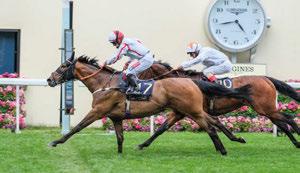
In the upper and middle tiers of racing, the increases to minimum values, applicable from January 1, ranged from £50,000 for Group 1s on the Flat and Grade 1 open chases over jumps, to £3,000 for Class 3 nurseries on the level and £3,500 for Class 2 handicap hurdles with a rating band.
For the lower classes in both codes, there was a £700 rise across the board. Additionally, it was agreed there will be no novice or maiden races at Class 6 on the Flat and Class 5 over jumps, meaning that these races will be permitted only with prize-money of at least £5,300 (Flat), £5,800 (hurdle) and £6,600 (chase). One related knock-on impact
All-weather fixtures over Christmas will become floodlit cards next year
was the closure of the Appearance Money Scheme.
As for the fixture list, which continues to be a major, if not the number one, preoccupation for the sport’s participants and fans, a total of 1,478 meetings have been scheduled for 2023, a figure broadly similar to 2022.
Notable changes include the creation of a new fixture at Aintree on Boxing Day and the St Leger meeting to be run from Thursday to Sunday, instead of Wednesday to Saturday.
Other initiatives include there being a maximum of five fixtures on any Saturday afternoon (and where the BHA has agreed to allocate a fifth fixture, the
Syndicate pioneer Henry Ponsonby, whose familiar white and red silks were carried to big-race triumphs on the Flat and over jumps, was described as “irrepressible and unreplaceable” following his death last month aged 74.
When the Jockey Club, which then governed racing, first allowed syndicates in 1976, Ponsonby took advantage “to fulfil my own ambition of racehorse ownership” and the following year struck with his first runner, Beloved Mistress, at Salisbury.
The partnerships he set up enjoyed hundreds of winners and introduced the likes of Jilly Cooper and Sir Alex Ferguson to the joys of racehorse ownership.
Horses such as First Mohican and Tiger Cliff – who won the Ebor –provided Henry Ponsonby Racing syndicate members with some magical moments with the late Sir Henry Cecil, while Oregon Trail won the Arkle Chase at the Cheltenham Festival.
Affair Of State won her owners a huge pot in the Tattersalls Breeders
Stakes at the Curragh, and Gatwick flew to three heritage handicap victories and finished mid-division in the Derby won by North Light.
Alan King and Nicky Henderson were key trainers for Ponsonby and his members, and Captain Miller, Scots Grey, Kings Bayonet, Red Flare, Seventh Cavalry, Spring Dream, The Betchworth Kid, General Miller, Fleet Street, Sir Jimmy Shand and Lieutenant Miller were among those to represent their owners with distinction.
Who Dares Wins and Scarlet Dragon roared to a fantastic double at Royal Ascot just two years ago, winning the Queen Alexandra Stakes and Duke of Edinburgh Stakes respectively. Scarlet Dragon’s trainer Eve Johnson Houghton said: “My first job in racing was working in Henry’s office and in those days he had horses with Dad [Fulke Johnson Houghton].
“He was larger than life, and all the way through he was a good winner as well as being a good loser. He’s a huge loss to racing, and I would use two words to sum him up – irrepressible
GEORGE SELWYNtotal prize-money at that fifth fixture must be at least £150,000), and increased code breaks, which will especially benefit jockeys but also trainers and stable staff.
Betting-related developments include the staging of two floodlit fixtures on each day of the Cheltenham Festival, and afternoon all-weather fixtures in the Christmas period becoming floodlit cards.

Commenting upon the release of the fixture list and minimum value increases, ROA Chief Executive Charlie Liverton said: “I believe this is really positive progress for the industry. It’s been a timeconsuming and meticulous process getting to this point, however this is an example of a truly collaborative effort, taking into consideration the interests of the multiple stakeholders representing British racing.
“Prize-money in the UK has been a major concern for many owners for a number of years and I’m pleased that we were able to find a way forward to increase minimum prize-money levels and deliver a simplified model across both codes.”
and unreplaceable.”
Mick Channon said: “Affair Of State helped get me going when he won a big sales race at the Curragh for one of Henry’s syndicates. We always remained friends even though we had rows at different times, and I say that in a nice way. He was a real character and came to our shoot every year.
“We then had Gatwick who we supplemented for the Derby after he won an £80,000 handicap at Haydock. He came there going well, but didn’t stay. We had a lot of good times, but if you didn’t have a row with him, you didn’t know Henry.”
Ponsonby is survived by ex-wife Jane and daughter Christine.
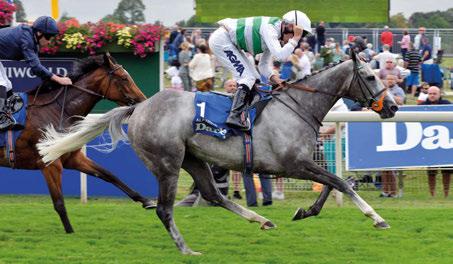
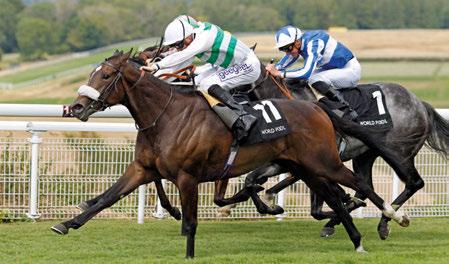
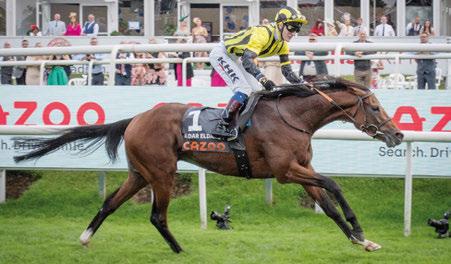
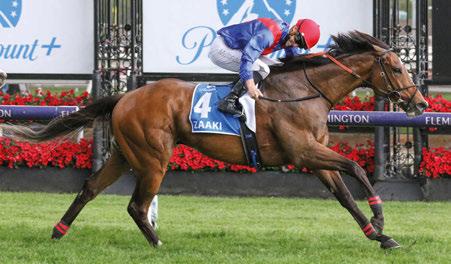
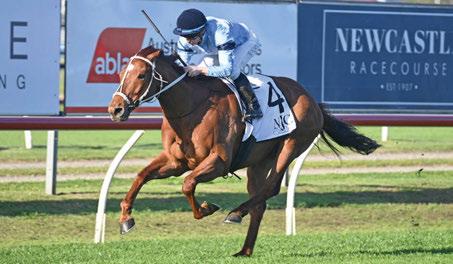
Lancashire trainer who hit the heights with high-class sprinters Tedburrow, Reverence and Ridge Ranger will retire at the end of this season.

Academy that assisted Khadijah Mellah launches a special course aimed specifically at those with little or no experience of horses/riding.
Famous silks will again be seen in the Willie Mullins stable after Michael O’Leary returns to the Closutton trainer after six years apart.
Jockey will no longer be retained by Olly Murphy although will still ride for the Warwickshire-based trainer, who plans to use Sean Bowen.
Champion apprentice jockey in 2021 is suspended by the BHA following a failed drugs test.
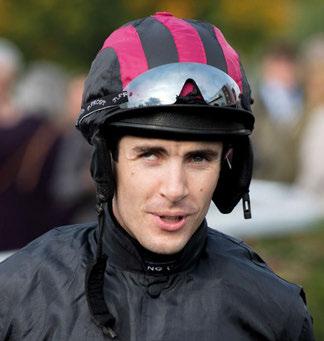
Andrew Braithwaite
Succeeds Grant Harris as Chief Executive of the British Racing School – he was previously the Newmarket-based charity’s Finance Director.
Flat jockey who rode 128 winners quits the saddled aged 30 citing a lack of opportunities – his new career is in the energy services industry.
Coroebus 3
Godolphin’s 2,000 Guineas and St James’s Palace Stakes victor suffers a fatal injury in the Prix du Moulin at Longchamp.
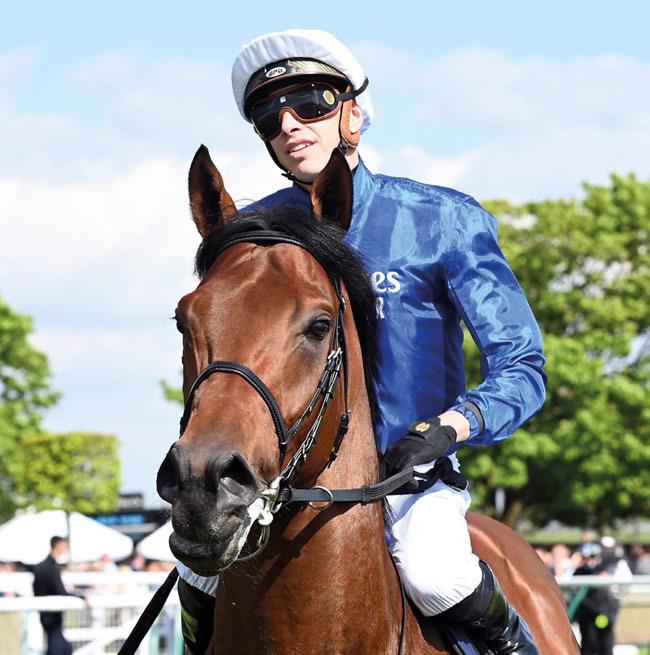
National Defense 8
Stallion dies at Widden Stud in Australia having shuttled from Ireland. He sired Breeders’ Cup scorer Twilight Gleaming.
Trainer receives a £3,333 fine following a four-day disciplinary hearing having failed to call a vet to treat a horse in his care following an injury.
Appointed as new Director of Communications and Corporate Affairs at the British Horseracing Authority.
Former top jockey will retire from the training ranks this year; he guided the career of Goldikova, winner of 14 Group 1s across five seasons.
Chief Executive of the Association of Irish Racecourses will step down in March next year having been in the role for two decades.
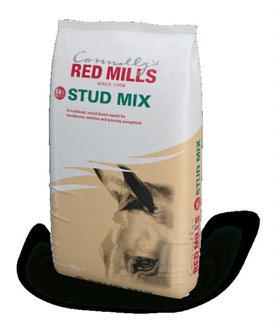
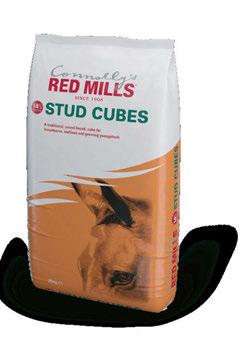
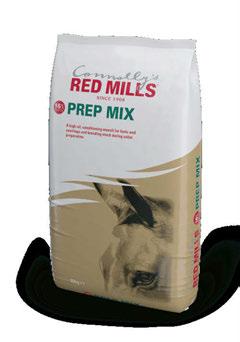
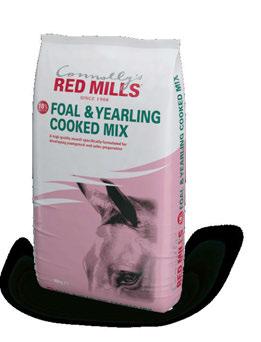
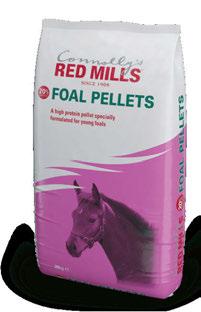
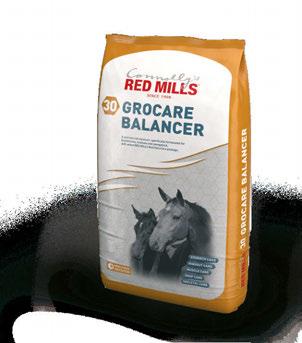
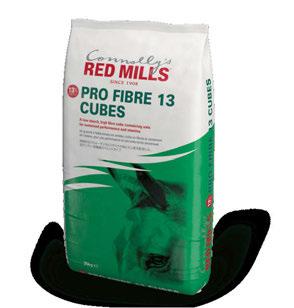
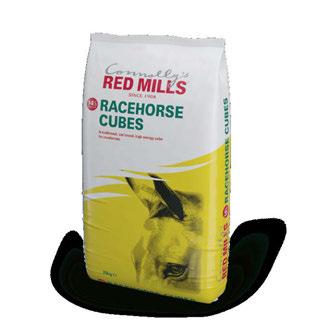
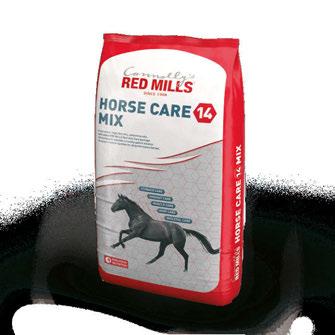
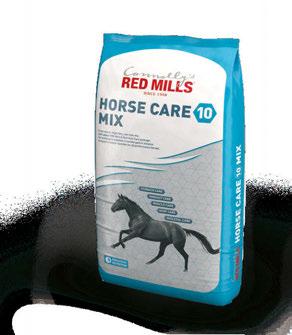

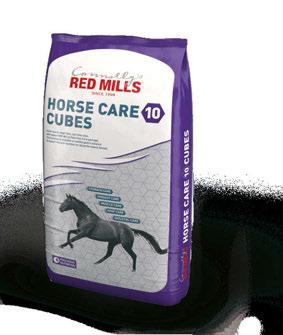
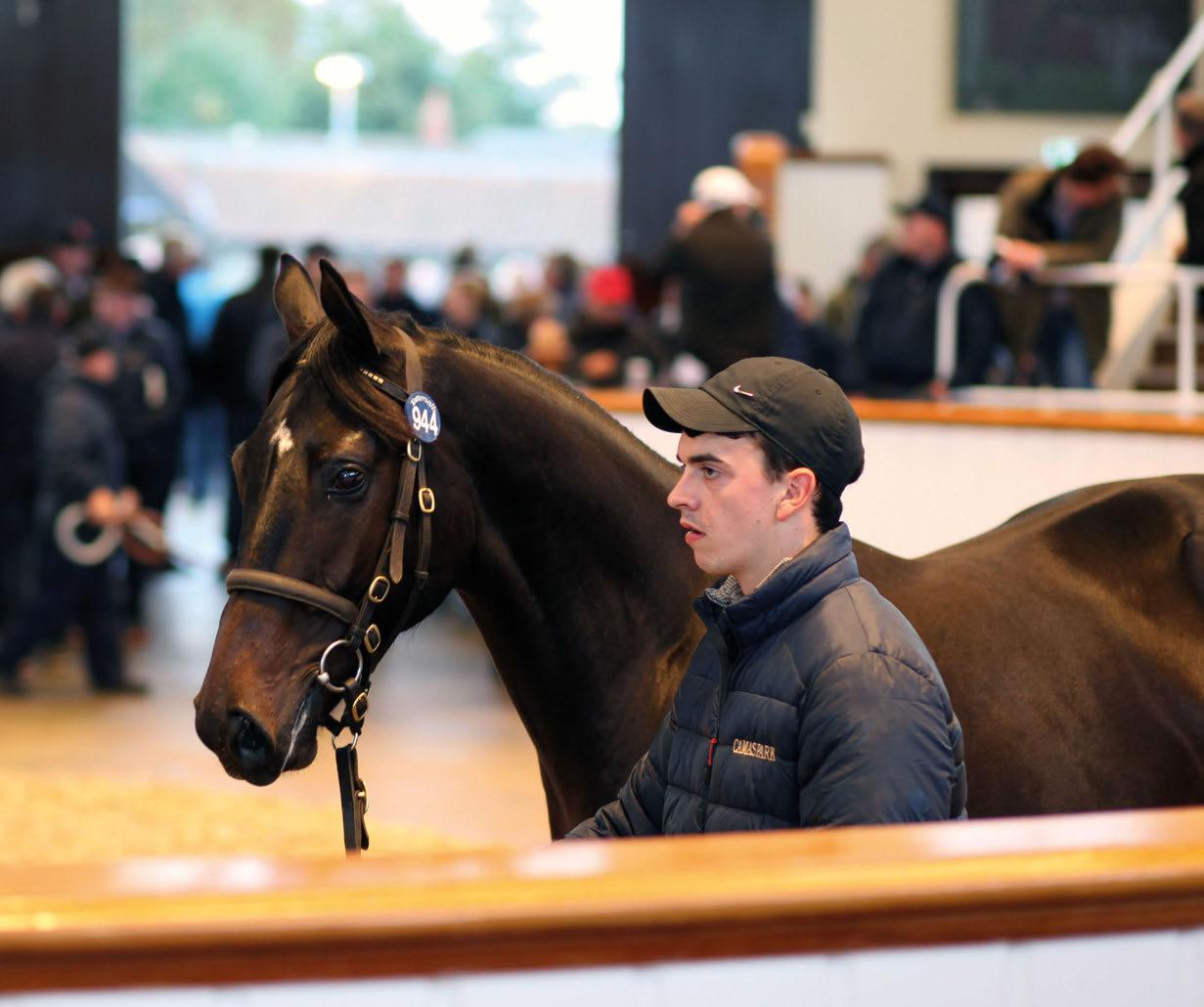
Sprint Cup winner, trained by Owen Burrows for Shadwell, is retired having fractured his left knee in the Haydock contest. A stud career awaits.
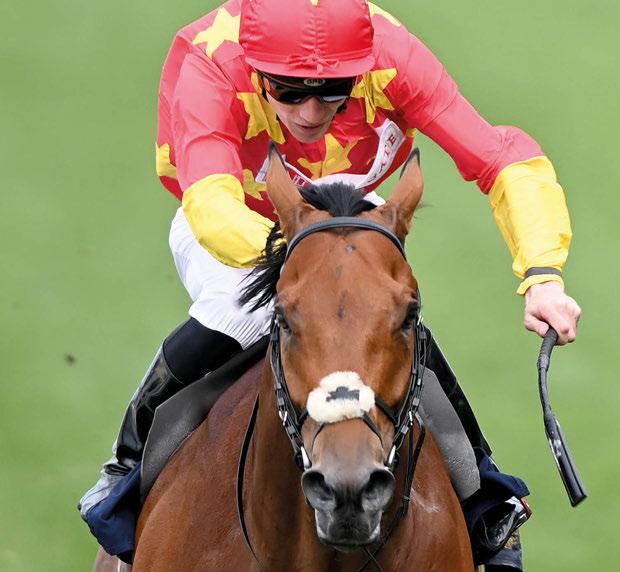
Son of Uncle Mo, winner of this year’s Belmont Stakes, is retired from racing and will stand his first season at Spendthrift Farm for $20,000.
US racing superstar, unbeaten in five races to date, will stand at Lane’s End Farm for a syndicate when his career on the track concludes.
Son of Into Mischief, winner of the Kentucky Derby and Haskell Stakes in 2021, is retired to Juddmonte’s Kentucky stud. His fee is $25,000.
Sire of 1,000 Guineas heroine Cachet relocates from the National Stud to trainer Martyn Meade’s base at Manton along with Advertise.
Globetrotting performer for the Joseph O’Brien stable, winner of four top-level contests across three continents, is retired aged four.
Her Majesty was Britain’s longestserving monarch and the most famous racehorse owner and breeder in the world (see tribute pages 8-19).
James Delahooke 77
Renowned and respected bloodstock agent who unearthed Dancing Brave in America for Prince Khalid Abdullah.
Johnny Jeffreys 79
Chairman at Kelso for 25 years coowned Sebastian V, runner-up to Lucius in the 1978 Grand National.
Mother of John Magnier was a hugely successful owner-breeder, enjoying big-race success with Hit It A Bomb and Fairyland.
Charles Wilson 87
Editor of The Times and Editorin-Chief of The Sporting Life bred and owned six-time chase winner Delgany Gunner.
Barry Baxby 62
Long-serving employee of Luca Cumani who in later years was a horsebox driver for Newmarket Racehorse Transport.
Pioneer of syndicate ownership in Britain, enjoying big-race wins with Oregon Trail, Tiger Cliff and Who Dares Wins
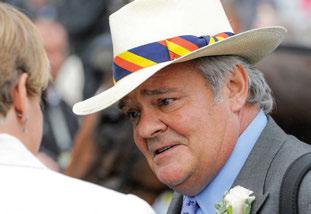
Amateur was leading rider at the 1980 Cheltenham Festival; the following year he won the Gold Cup on Little Owl.
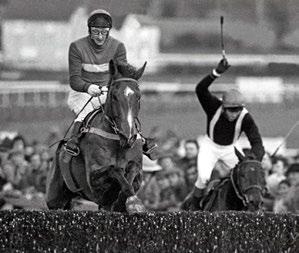
Jack de Bromhead 13
Son of trainer Henry de Bromhead dies after a fall at Glenbeigh horse and pony races in County Kerry.
John Budden 83
Former schoolmaster was a racing commentator and writer who penned a regular column in The Sporting Life
When

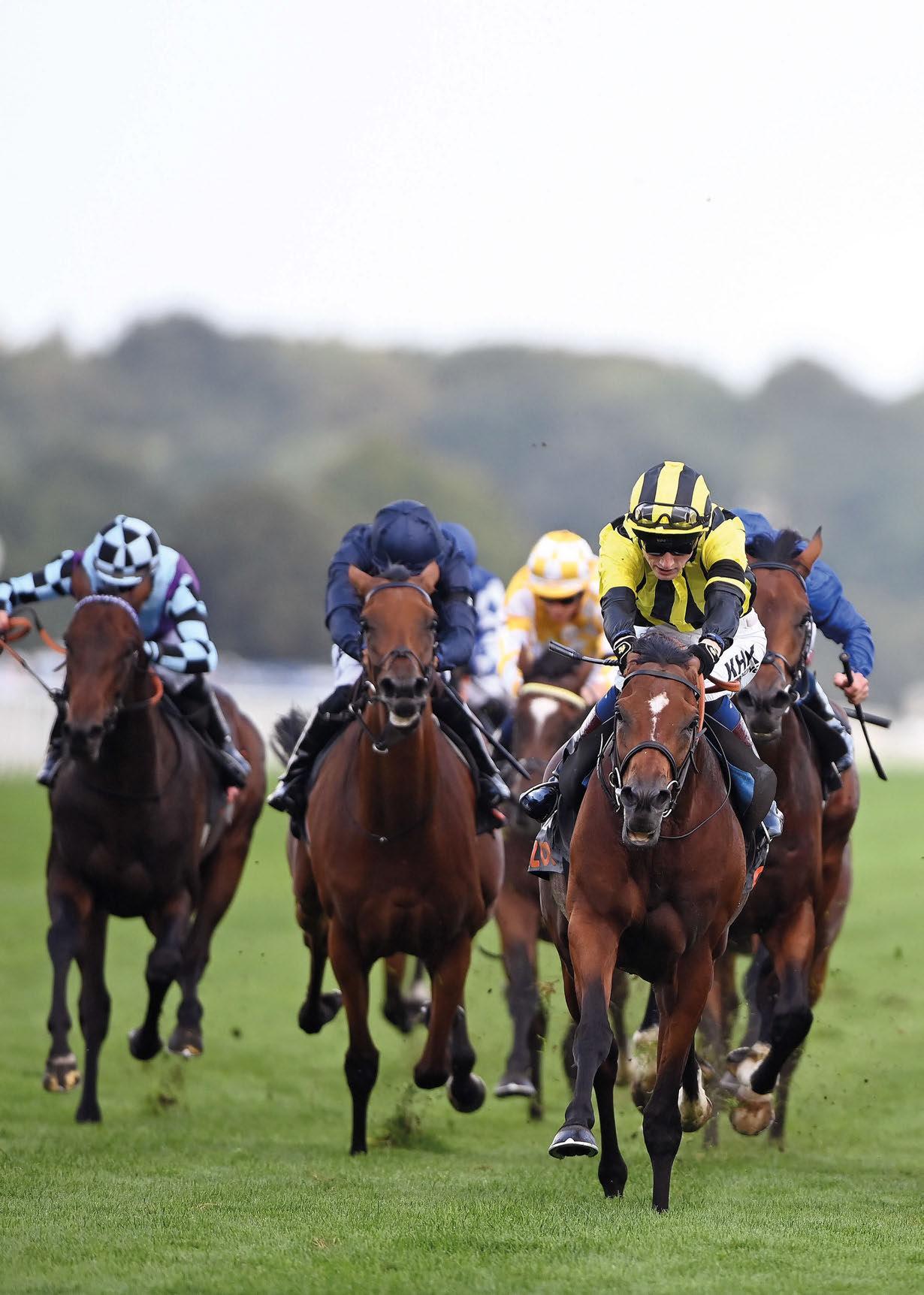
While William Buick has the jockeys’ title sewn up, there’s no doubt David Egan has also been one of the stars of the weighing room this year, not letting his split with Prince Faisal knock him off his stride and bagging his first Classic victory on Eldar Eldarov in the St Leger at Doncaster. The duo streaked clear to win from Haskoy (second right), who was subsequently demoted for causing interference. The winner is trained by Roger Varian for KHK Racing.
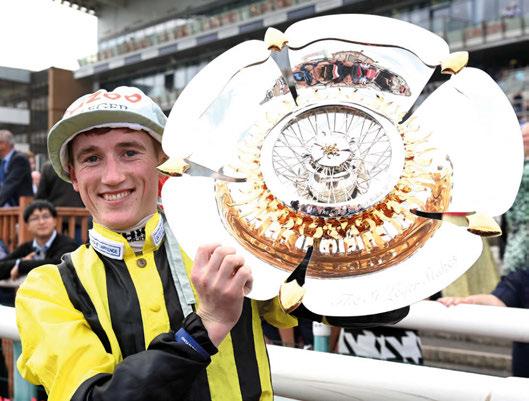
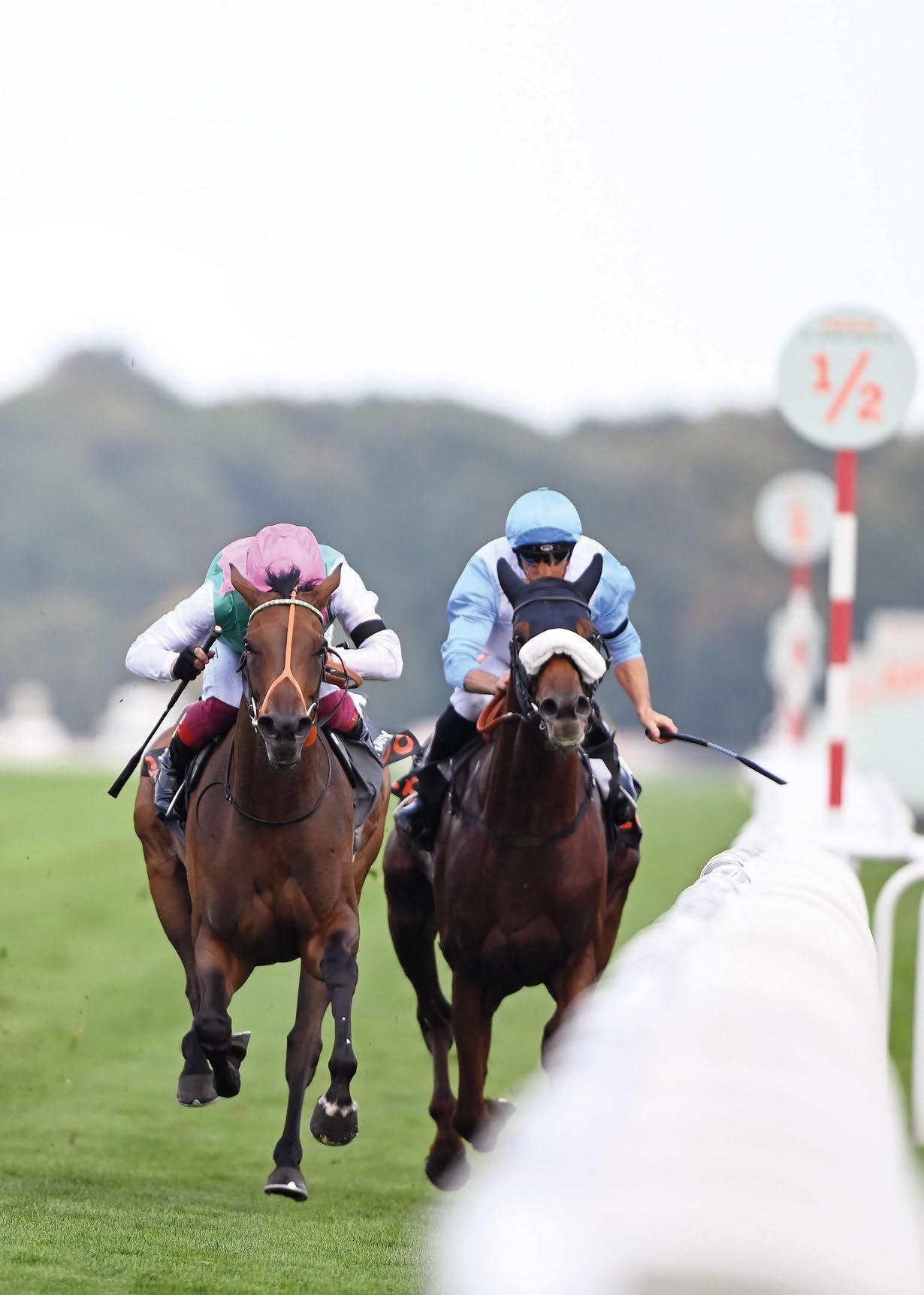
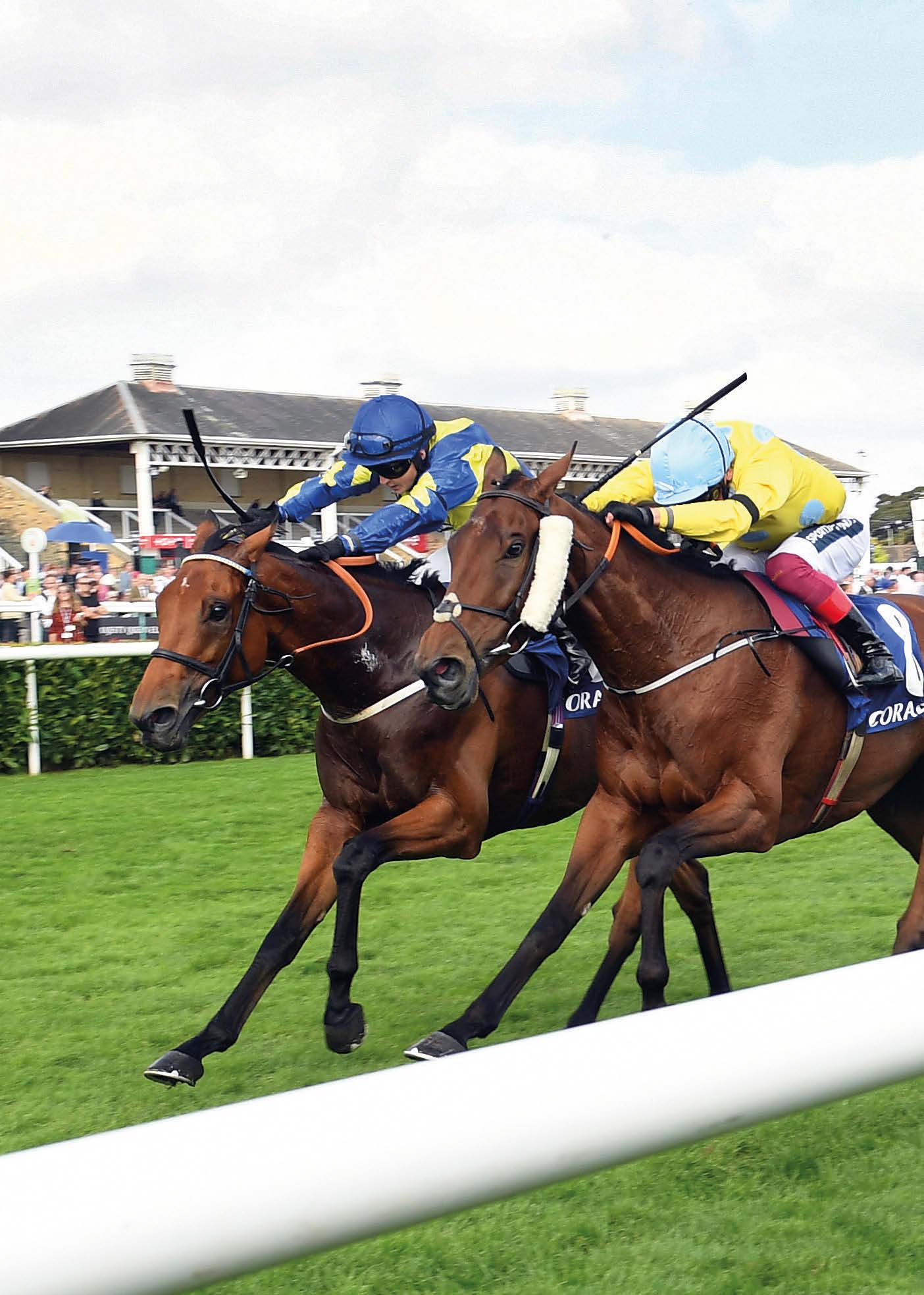
Stradivarius and Kyprios were missing but the Group 2 Doncaster Cup still served up one of the treats of the St Leger meeting, with just a neck and a short head separating the first three home. Coltrane raced against the rail and emerged on top under David Probert from Trueshan (left), with Lismore a close third. The winner, carrying the silks of Mick and Janice Mariscotti, is trained by Andrew Balding and has improved steadily as a five-year-old this season, also landing the Ascot Stakes at the Royal Meeting.
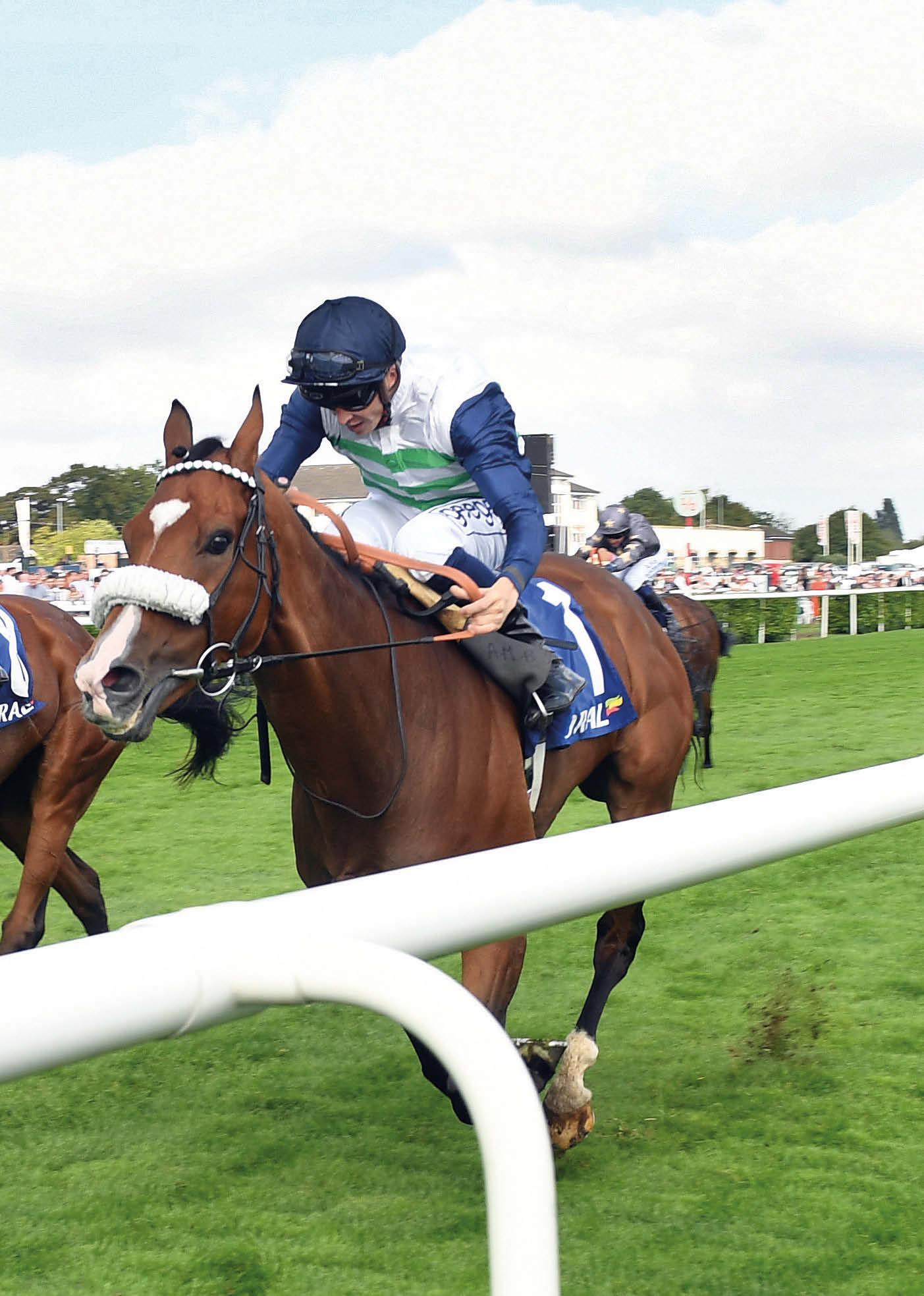
Coltrane hits the right note
Goodluck to Greg Swift, the BHA’s new Director of Communications and Corporate Affairs. Never mind corporate affairs, the pursuit of which appears to be one of those several activities with loose definitions that have crept into modern personnel appointment jargon, communication has been an Achilles’ heel of the BHA for some time.
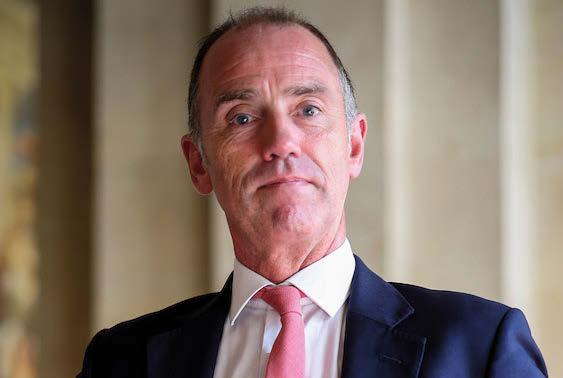
For the best part of five years, ever since previous Chief Executive Nick Rust promised regular press briefings and little materialised beyond untimed, occasional and often impersonal interviews on the satellite racing channels, the paucity of meaningful communications emanating from racing’s governing body to the media and beyond has been a featured bone of contention in this section of the magazine.
One suggestion did take root, in that since 2020 the BHA has followed the Levy Board’s example by publishing a summary of matters discussed at its board meetings. However, the very nature of this box-ticking exercise means that its dissemination of detailed discussion is virtually non-existent.
As for the BHA’s annual reports, which used to contain a full rundown of the previous year’s events and identification of the personnel who had steered them, the Publications section of the organisation’s website demonstrates how bereft of officially published information the sport has become.
Even allowing for difficulties brought on by the change of working patterns to combat Covid-19, the documents for 2019 and 2020 were pared back to the limit of the Chief Executive’s report and a set of accounts, leaving 2018 as the last time there was any meat on the bones of a proper annual review.
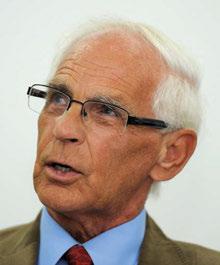
The situation had seemed much more positive in October 2017, when Martin Fewell was recruited as the BHA’s first
Greg Swift is the BHA’s new Director of Communications and Corporate Affairs
Director of Communications and Corporate Affairs, with his “high level of capability and experience in the areas of media, campaigning and digital” hailed at the time by Rust.
Fewell’s previous five years as Director of Media and Communications at the Met Police may no longer look quite as shiny as they did at the time, but his earlier 25 years at the coalfaces of BBC and ITN seemed to provide the right pedigree to tackle responsibilities of the new role that included “media relations, stakeholder and internal communications, political liaison and building the BHA’s digital presence.”
No-one can argue about the BHA’s digital presence, since
While Britain meanders towards the great misnomer of the Flat season known as British Champions Day, five Gulf states prepare for their new racing campaigns, which in each case promises to be pivotal.
Saudi Arabia has rapidly emerged from behind self-contained status, and its push for further recognition on the world stage will carry on apace. Promotion through the Asian Racing Federation’s first new internet bulletin, which promises to feature member nations, is no coincidence.
Bahrain is also on the march; maybe not quite on the coattails of its more prosperous and well-established neighbour but still making great strides, which will have had their importance enhanced by the latest overseas success through St Leger hero Eldar Eldarov.
Even Kuwait is threatening to
advance too, although its translation to an international power seems several years away. Which leaves the two longest established nations, Qatar and the UAE, for whom the future seems less certain, and where the season’s activities could set the pattern for some time to come, especially as far as British interests are concerned.
Qatar’s emergence beyond involvement in Arabian racing came a decade ago. More recently, loss of certain well-regarded overseas administrators to national interests and the sidelining of experienced promoters has resulted in a marked lessening of interest from international owners and trainers without local patronage.
And so to the UAE, which will celebrate the 20th anniversary of the Dubai World Cup Carnival against a backdrop of general contraction that has been going on for at least five
years. The fixture list might have grown; bigger races have been added to the Carnival programme and there may be a fresh stated desire to strive for Gulf-wide co-operation, but there is no disguising that the days of largesse for everyone taking part are over.
Changes tend to be conducted without fanfare, so the abrupt departure of senior handicapper Melvin Day in February, after nearly 27 years’ service, had to be marked privately. The arrival from Ireland of Mark Bird as Day’s assistant a year ago went by without publicity, as did his taking over for the World Cup ratings exercise and subsequent return to Ireland last month.
Whether the recent imposition of 15 per cent cuts to Dubai Racing Club and Emirates Racing Authority staff remuneration will ever be acknowledged remains to be seen.
without Twitter its day-to-day news messages would be lost, but for the rest, Fewell’s report card on quitting his post in October a year ago would read: Who? and What? Who was he, and what did he achieve?
It’s probably true that the best proponents of public relations are those who never appear in print or on audio or video; if they are the story, they are not doing their job. But there is anonymity and there is the unknown, and when Fewell left to join the London Business School he could likely count on the fingers of one hand the number of close media contacts he had made in British racing.
follow-up comment seems like a stretch of the imagination: “My team has led major industry projects, developing a vision for the future of racing and a horse welfare programme; we support change management activity across the BHA.”
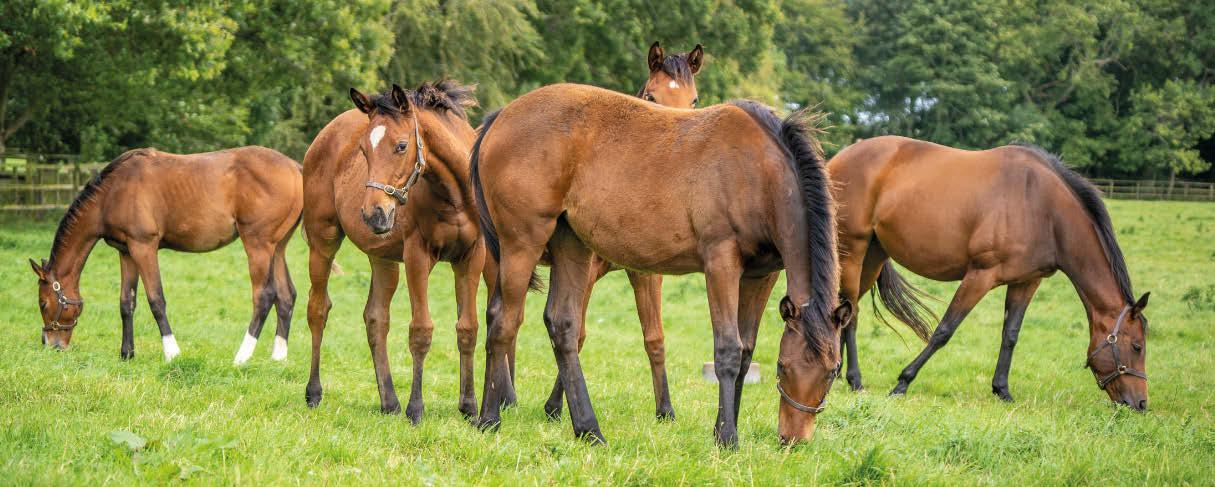
A vision for the future of racing seems as far away – if not farther away – than when Fewell left, and although the provision of a horse welfare programme is complete, the formation and early stages of the Horse Welfare Board’s existence have hardly been a seamless and stress-free exercise.
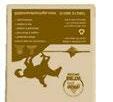
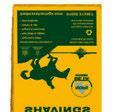
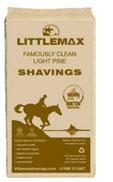
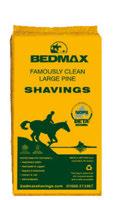
And so to the change management activity across the BHA, which, of course, has included the departure of Fewell himself, just a couple of months after the inadequately-explained exit of Will Lambe, whose service of more than 18 years for the BHB and BHA ended at his much admired duties as Head of External Affairs.
Fewell’s exit was followed by a year’s interregnum monitored by Alison Enticknap, former Head of Communications at the RSPB, whose chief activity seems to have surrounded her input to the long-awaited whip review.
Fewell’s biggest achievement may well be traced to the coronavirus pandemic, for under the BHA experience in his LinkedIn profile, he notes: “I have led the Covid crisis management on behalf of the £4 billion racing industry, developing a plan to co-ordinate the industry response and facilitating the work of our crisis group.”
Only those closest to the action, including Dr Jerry Hill, the public face of the campaign, will know whether this is an embellishment of the deep-down truth, or not, but Fewell’s
She has stepped down – heading another long-awaited eventuality as the BHA’s new Director of Strategy and Change –in favour of Greg Swift, who will arrive at BHA HQ at the end of this month “to lead a newly restructured communications and corporate affairs department,” according to the official notice of his appointment, which added that his responsibilities would also include “leading the sport’s liaison with and lobbying of government and senior figures in the national media.”
A further, private note to members of the media said: “We’ll make sure that Greg gets to meet a number of you.” Let’s hope he is not using Mr Fewell’s book of contacts.

global pandemic
her training
gone from
 Words: Julian Muscat • Photos: Bill Selwyn
Words: Julian Muscat • Photos: Bill Selwyn
The measure of all young wannabes is their ability to manipulate a set of unfavourable circumstances to their advantage. In that respect Alice Haynes passes the litmus test.
It seemed like an act of lunacy when Haynes baptised herself as a trainer by opening for business at the height of the Covid lockdown in February last year. With social distancing rules preventing owners from visiting their horses, Haynes dived headlong into a profession where direct contact with people is considered paramount.
The only other Newmarket trainer to follow suit was Harry Eustace, although his circumstances were contrasting. Eustace took over an established business from his father James at Park Lodge Stables, where Eustace was born and raised. Haynes, then 29, had no familial links with racing. She was a lone messenger fortified only of a love of horses.
“You’ve got to be completely mad to train horses at the best of times,” Haynes says from her rented yard at Cadland Cottage Stables in Newmarket, “but I was in a position where it was now or never. I’d got 12 horses together, and when you look back you wonder whether it would have been any different if I’d started one year later.
“I think that would have been just as daunting. And anyway,” she says with a smile, “it was probably quite good that my owners couldn’t come to visit. It meant we could get on with establishing the routine and get going. Then the social media side of things took off.”
That’s largely because Haynes had
plenty to regale social platforms with. She entered the winner’s enclosure at Wolverhampton three weeks after saddling her debut runner. The location was apt, since she’d ridden her first winner as a teenage apprentice at the Midlands track ten years earlier.
Her rich vein of form has continued unabated. Haynes set herself a target of ten winners in 2021 and posted 20. Having raised the bar to 30 winners this year she overhauled it before August was out. The Listed victory that garnished last year’s exploits has been supplanted by Lady Hollywood’s recent triumph in the Group 3 Prix d’Arenberg at Longchamp. She is registering career milestones at a rate that identifies her as one of the most promising young trainers on the block.
Lady Hollywood has been the catalyst. The two-year-old filly is owned by football super-agent Kia Joorabchian’s Amo Racing in partnership with Omnihorse Racing, the latter entity a cryptocurrencybased virtual venture linked to the oscillating value of Amo’s horses.
Joorabchian places a strong emphasis on youth, which is how he entered Haynes’ orbit.
“When I’m buying horses, I always look at everything Robson Aguiar is selling,” relates the 31-year-old. “I’ve been lucky with what I’ve bought from him. Robson knows Kia quite well and told him he should send me a horse. That’s how Mr Professor came to us.”
Mr Professor started life with Joe Tuite, for whom he made the last of three starts as a juvenile in June last year. “He was rated 65 and was running over sprint ››
not
from
and it
to
thanks to the
Lady Hollywood could yet put a bigger smile on the face of trainer Alice Haynes with the Breeders’ Cup on the horizon
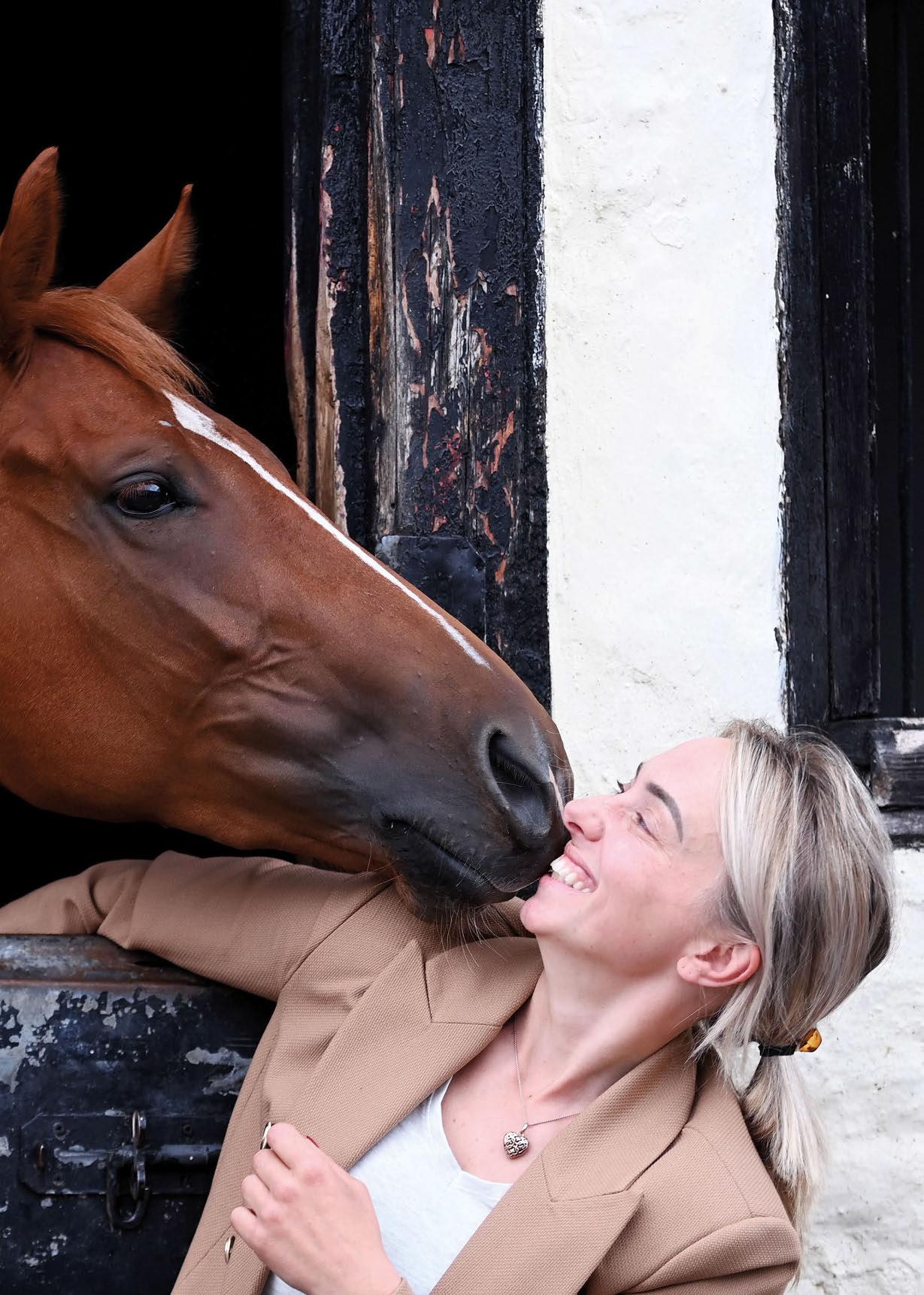
›› trips,” Haynes relates. “We had no idea at all what we were getting.”
Mr Professor wasn’t long in showing his mettle. He won his first two starts for Haynes before closing a busy campaign by winning a Listed event at Pontefract. “Kia sent us a couple of horses after that,” says Haynes.
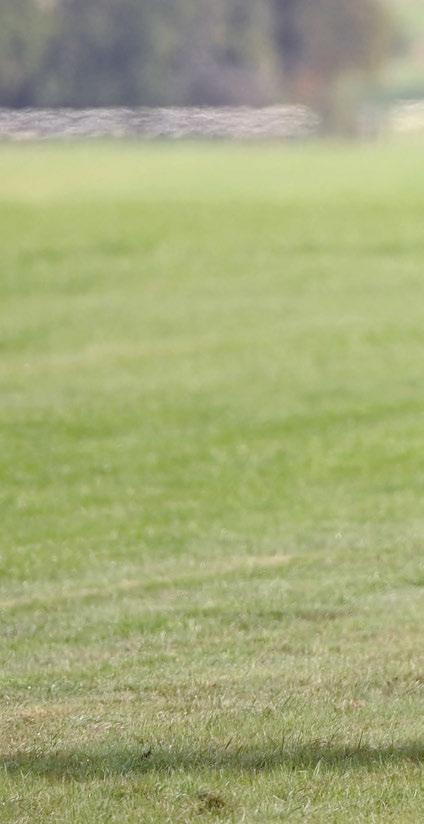
One of them was Lady Hollywood, a 64,000gns Tattersalls breeze-up purchase who has banked that sum in prize-money in winning four of her seven juvenile starts to date. In consequence she has become a staple on Haynes’ Instagram page.
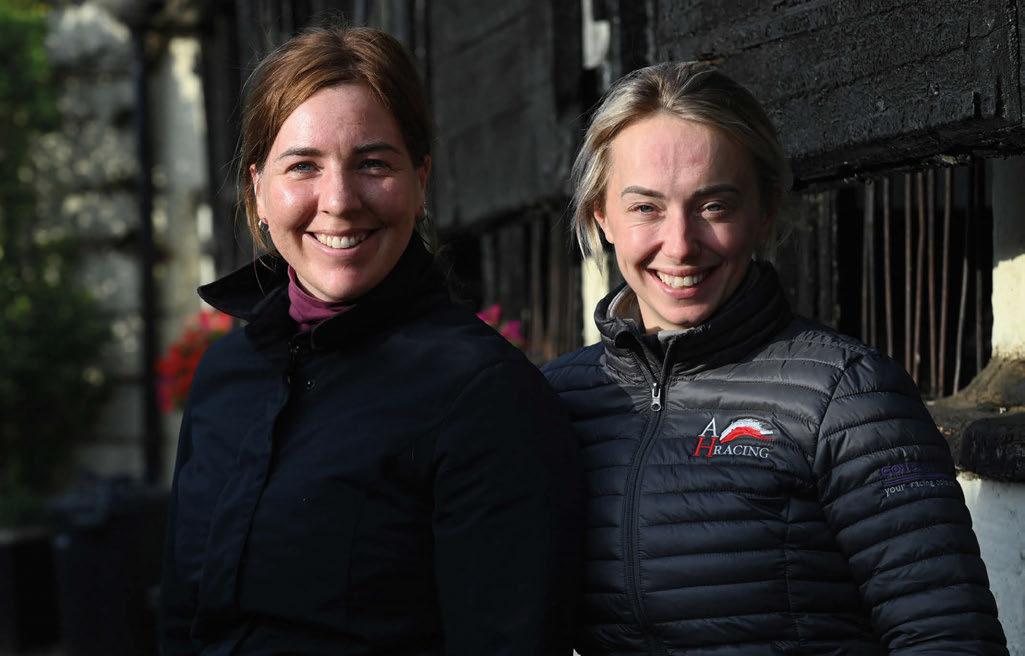
As you’d expect, Haynes frequently uses social media as a marketing platform for her business.
But she maintains such platforms are merely tasters; the best way for any
trainer to promote themselves is by results.
“I love Instagram,” she starts. “It’s a good way of connecting with people and it is free advertising. I’m also getting a new website designed. I’ve had a couple of new owners connect via the website, so that is still a good tool.
“I was surprised about that because I thought it might be a bit passe, whereas Instagram is more like real life. You can post something that happened that morning with a comment, and you can boost your best days when you have winners.
“But this is a results-based business,” she continues. “You can buy a yearling and put it on Instagram, other social media platforms, but will it actually sell through that? Probably not. You still need to speak to people face to face.”
That’s why Haynes frequents the sales at every opportunity. It’s not something she particularly enjoys but she recognises that opportunity knocks. The day before my visit she’d coursed through the Sommerville Yearling Sale catalogue, identified what she wanted and then set about finding new owners for them. She was two more yearlings to the good by the day’s end.
“Sometimes I find it tedious talking to a load of new people at the sales but
it does pay off,” she says. “Going out to places like London isn’t really my cup of tea, to be honest. Maybe for a night out every now and then, but it’s such a hassle getting there and back. I’m not somebody who welcomes the limelight.”
For Haynes, the trouble with the social whirl is that it takes time away from being around her horses. She is absolutely fullon committed to them. She rises at 5am, often does the morning feed and rides out five lots to complete her morning’s work. Then follows the rounds of evening stables.
She admits she is frequently tired come the evening. She has enlisted help with the administrative side of things, all of which she used to do herself, while Charlie Sutton takes care of form study and assists with making entries. It is a small, closely-knit team, which is just as she likes it.
There is ample anecdotal evidence that Haynes struggles to achieve the requisite work-rest balance. She recently made
a conscious decision to put her phone away by 7pm, by which time she has been active for 14 hours, asking owners to contact her during the day. However, that still leaves the daily diet of evening racing to tempt her into staying engaged.
And relaxing is a relative thing. So much minutiae is seared into her memory – each horse’s official rating, how much it cost, how it fared on each of its runs, where it runs next – that she must spend hours poring over the data to make it stick.
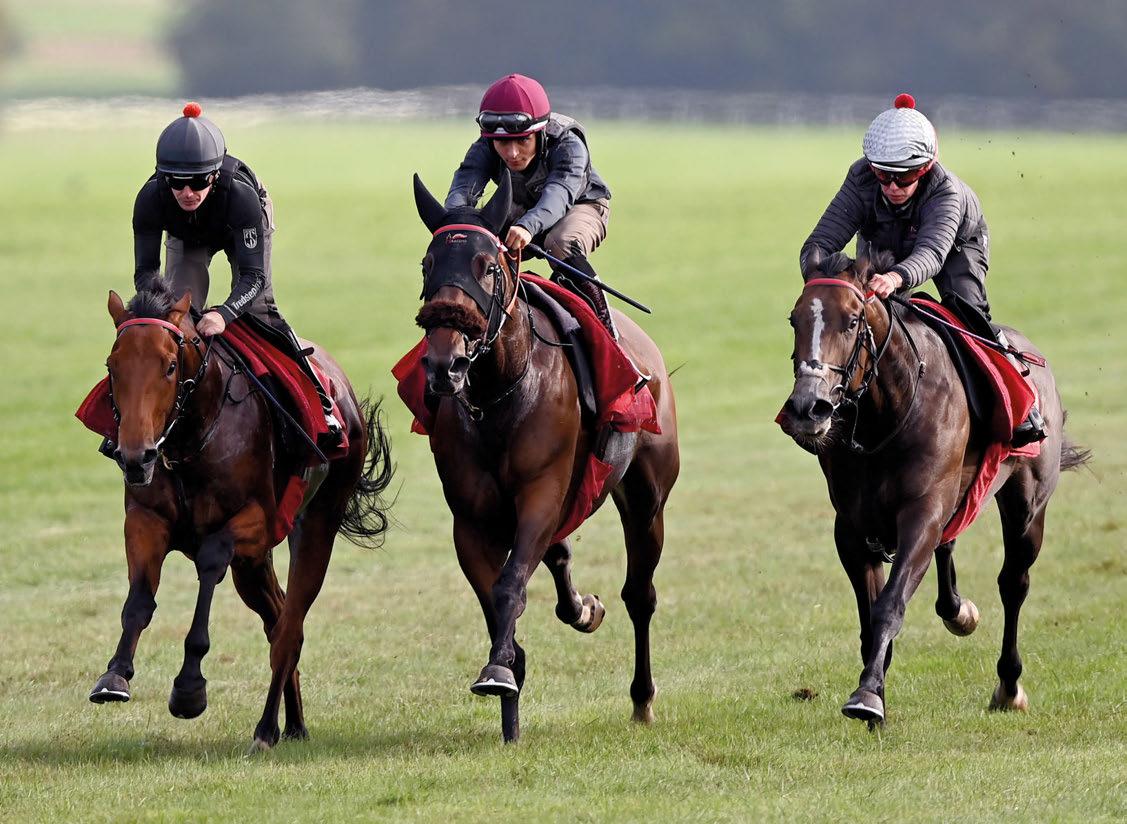
There is no secret to her success. She is making waves because of her indefatigable work ethic. She is literally forcing herself to succeed, determined to prove that good things come to those with a burning desire. One suspects it was ever thus, despite recent efforts to temper her driven nature.
“I don’t have any other hobbies,” Haynes reflects. “I like to tell myself I go to the gym, but I haven’t been for a long time. I’m in a relationship and have
good friends but they are all in the racing world because they wouldn’t otherwise understand what we do. It’s difficult not to get engrossed in this game.”
It’s an energy-straining existence yet Haynes wears that particular badge with pride. It’s a by-product of trying to break into a profession populated largely by those whose parents went before them.
Haynes was very young when her parents separated. Her mother, who owned and managed a doctor’s surgery, was supportive of her daughter’s desire to make a life with horses. Haynes’ brother, by contrast, cannot abide horses and works in London.
Having started riding and walking simultaneously as a toddler, Haynes rode eventers to international standard before she was captivated by Henrietta Knight’s exploits with Best Mate and Racing Demon. She duly wrote to Knight requesting help.
That letter captures the Haynes philosophy. She saw two horses ››
Haynes, seen here with winning two-year-old Girl Magic, is always looking to improve the quality of her string
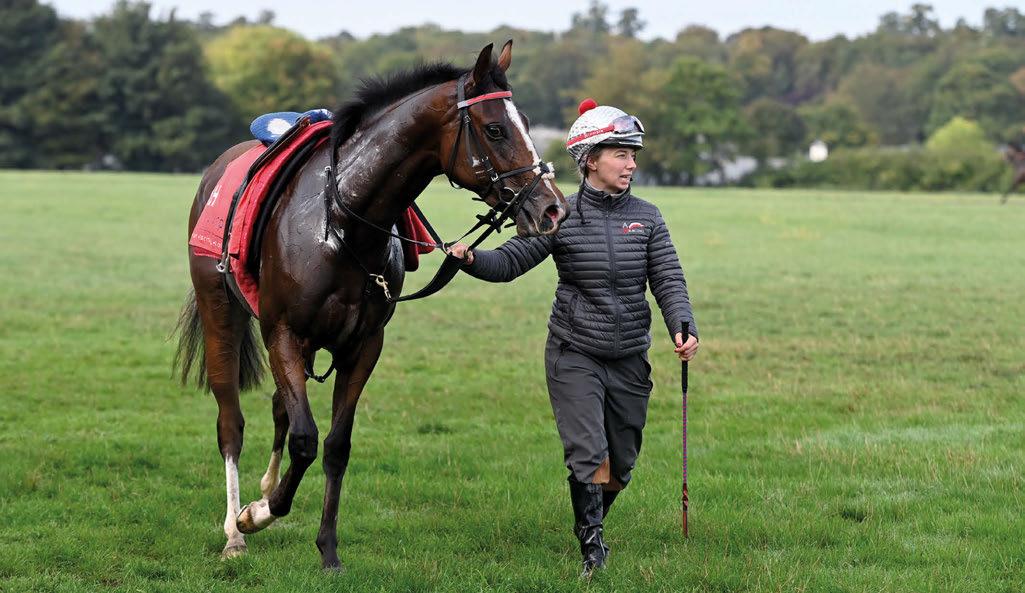
enthralling the nation and thought nothing of pitching herself to their trainer, who was herself at the top of the tree. Knight, in turn, must have sensed Haynes’ yearning and gave her a chance. She was soon schooling horses tucked in behind AP McCoy on the gallops.
Spells with Mick Channon and in Australia followed before she landed at David Simcock’s Newmarket stable with her amateur rider’s licence.
Having realised she would not make a professional jockey, she turned to pretraining in her determination to run her own show. After four years it was time to part Covid-infested waters and take the plunge.
She has already learnt some harsh lessons. After some agonising, she rooted some bad payers out of the stable. “It left a nasty taste,” she says. “You start trusting people less, which is probably no bad way to be in this business.”
And her success has raised hackles. “You do hear some horrible comments,” she reflects. “People are always nice to your face on a good day but they don’t really mean it. You realise they are envious but I have learnt to laugh it off. I kill them with kindness.
“I have got more laid-back since I started training,” she continues. “In the past if someone annoyed me I’d put them back in their place straight away, but not now. It’s a question of your own health as well. You don’t want to be in a stew for
too long.”
Nor does she have much truck with the so-called ‘snowflake’ generation, which is scornful of the concept of competitiveness. “Getting a pat on the back just for taking part is not how it should be,” she avers.
“You need to learn from your mistakes and be tough on yourself, rather than consoling yourself by thinking that at least
less than two years into the job who is prepared to move horses on quickly. More commonly, they persist with them for extended periods only because their owners pay the bills. Yet while an empty box generates no income, Haynes cannot abide the emotional strain promoted by a bad horse.
“To me, it’s demoralising going racing when you have no chance of winning,” she says. “Why do it? You’re leading good owners on, then you dread it when they ring for a chat so you end up emailing them instead. You beat yourself up on bad days anyway and that’s how I’d feel if I knew I had two bad horses running next week. The only thing you get out of it is grief.”
you tried. You’ve got to write a list of what you’ve done wrong and not do it again. You’ve got to push yourself. I see it with young staff these days; many of them are a lot softer.”
She sees her horses through a similar lens. “They have to be a bit like soldiers,” she says. “Some are tough; they have setbacks and they come back from them. Others have setbacks and that’s the end of them, in which case you have to move them on.”
It’s rare to come across a trainer
No grief will be involved when Haynes travels to Keeneland to supervise Lady Hollywood’s bid for the Breeders’ Cup Juvenile Turf Sprint on November 4. It’s an audacious target for the filly, but then Haynes is audacious by nature.
“When Kia asked if I liked any of the horses he’d bought at the sales I told him I liked Lady Hollywood,” she recalls. “I didn’t go for any of the more expensive ones; I didn’t feel I was in a position to do that at the time.
“You look at Lady Hollywood today and she’s a plain-Jane chestnut filly. There’s nothing big or flash about her but she wears her heart on her sleeve. If she wins at the Breeders’ Cup I’ll feel like I can ask Kia for anything.”
››
“You need to learn from your mistakes and be tough on yourself”

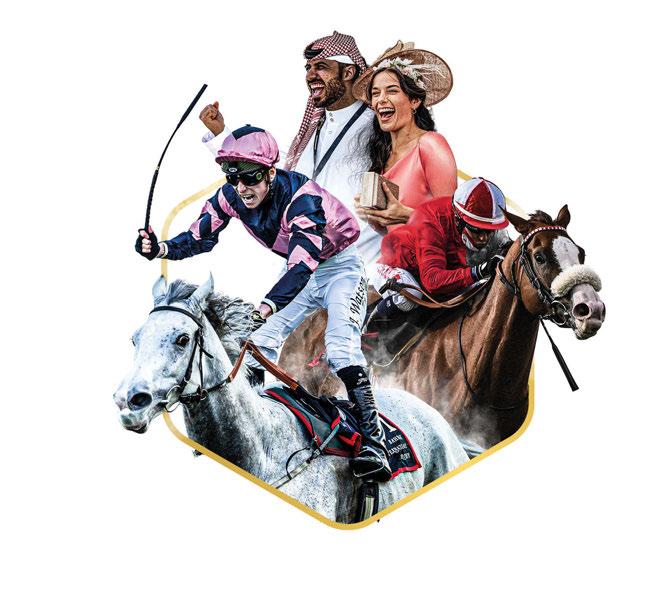
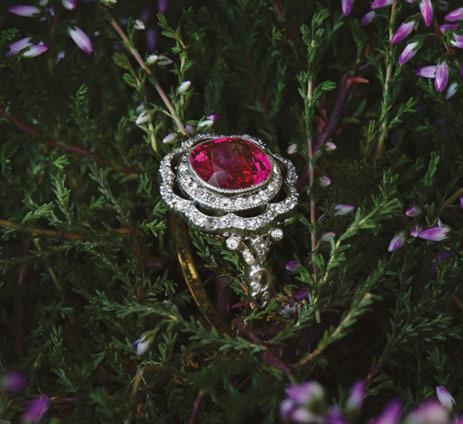
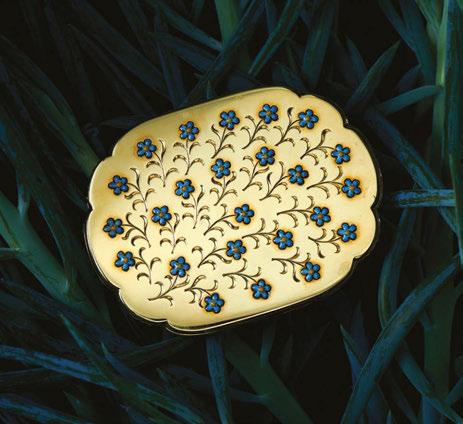

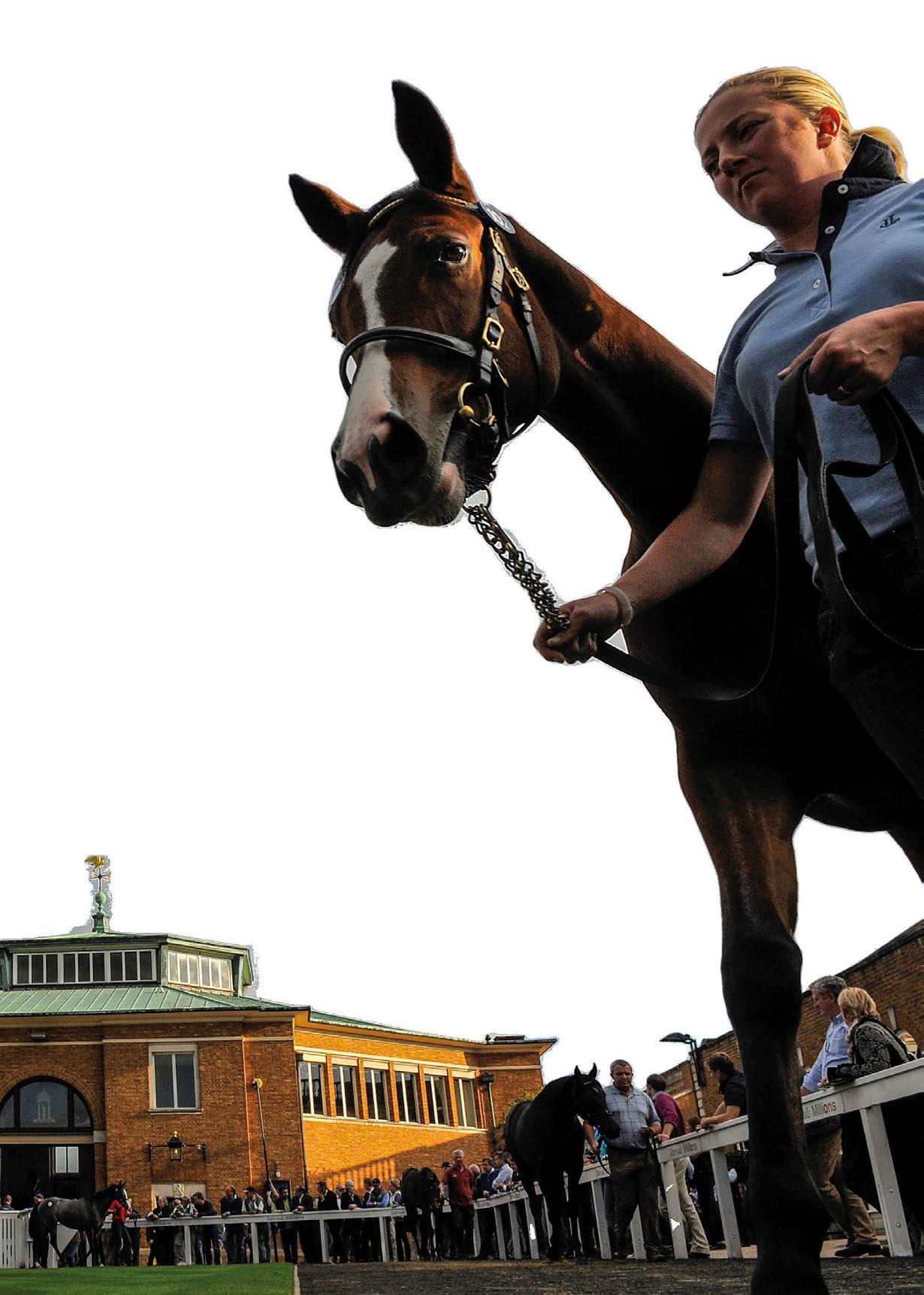
been in existence; with that in mind, the promise of confidentiality, which was missing before, has been a most welcome addition.
“The previous code, which was the first of its type in the world, had served the industry well but it needed to be updated and rewritten,” says BIF Chairman Jimmy George.
“It took a while to complete the process but that reflected the rigorous nature of the process. It was very important that BIF produced a robust code that was up to date, would stand the test of time and that was fundamentally easy to comprehend. It was key to have reasonably simple mechanisms put in place to address the major issues, and I think it’s been recognised that it’s a good document in that respect.
“There was a lot of legal input into its production. But then it had to be robust and we had to cover every angle as best as we possibly could.”
He adds: “Another aspect was raising awareness of the new code throughout the industry and making the importance of it clear to all. It has been crucial to draw the attention of participants in the sales scene - people have to understand the code and be clear on how to comply with it. In essence it’s not a particularly lengthy document but it is reinforced by detailed explanatory notes. They are a lot longer than the code itself but this represents the concerted effort to explain things as clearly as possible.”
The code is published in its entirety within every sale catalogue produced by the Tattersalls and Goffs groups in Britain and Ireland. It can also be found on websites belonging to both sale companies in addition to those hosted by the BHA and TBA. It is also publicised across the sale grounds.
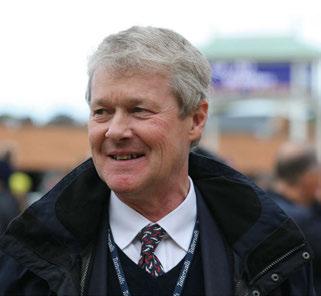
“This started off as an initiative in England but we were all adamant that it should be an Anglo/Irish initiative,” says Goffs Group CEO Henry Beeby. “The
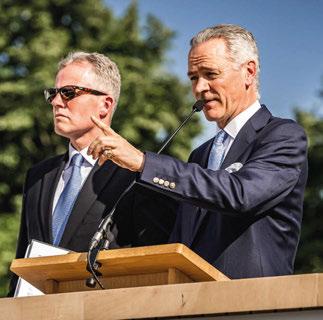
Code of Practice is a long, comprehensive document but then it needed to be.
“It is not there to restrict business. It is designed to stop what is seen as underhand practices. Whatever the headlines said, Justin Felice’s report said that in his opinion only five per cent were bad apples. So it’s a very small minority trying to gain an unfair advantage.
“The key point is that the code is very well publicised. It’s on all the relevant websites, is printed in all the catalogues, there are posters on the sale grounds with QR codes that link to it and we highlight it at the start of every session of every sale.”
George adds: “It’s very clearly flagged up in as many places as it can be, and that’s key – to keep it at the forefront of people’s minds.”
George notes that its release was well received but, crucially, those who have gone on to use it have had a positive experience.
“The process put in place has been utilised,” he says. “People were understandably nervous about putting
confidentiality aspect is very important and we worked hard at how to best address it. There is a lawyer based in Ireland and a lawyer based in England, and their contact details are published for everyone to see. They are there to offer free and confidential advice, and that is funded by BIF.”
Now is not the time for the industry to rest on its laurels, however. If the code is to continue tackling the issues highlighted in the BHA report and in turn lend confidence to the market, it needs to remain relevant and at the forefront of the industry. To that end, both sales houses are committed to ensuring that it evolves.
“It was probably a failing of the previous code that it just sat there,” says Beeby. “Like the conditions of sale, this one will evolve. The work will never be finished. It will continue to evolve and should help strengthen and improve the British and Irish marketplace.”
their head above the parapet on something that they may or may not be right about. That was an issue with the last code. Now there is full confidentiality, and that is one of the key elements –there are mechanisms whereby someone with an issue can avail of independent legal advice at the expense of BIF. That was the aim, for it to be easier to have any concerns addressed in the first place. And once you have that free, independent, legal advice, then you can make an informed decision on how to take that forward.
“The feedback has been positive from the people who have used it. And I think the fact that it’s been used is a strong endorsement of the process put in place.”
Beeby echoes those sentiments. “We as a group were very conscious when updating it that confidentiality was an issue with the previous code,” he says.
“People might previously have been wary of bringing issues to attention for fear of being shunned. So the
George adds: “BIF meets several times a year. One part of the remit is to look at the code again come the end of a sales season and consider any matters that might have arisen over the year. It’s only been in place for a year so there’s been no need to tinker with it. But it’s part of the remit, to adapt and evolve it accordingly. It’s an ongoing commitment from the industry and a responsibility for us all.
“It’s up to all of us to preserve the reputation and integrity of the industry in the interests of everybody – both those who are existing participants and those who are coming into it for the first time.
“Everybody knows that the bedrock of the sales is integrity but regular reminders of the collective responsibility we all share are very important. We can’t be complacent with matters of integrity. And the way the new Code of Practice has been embraced is a reminder that nobody underestimates the importance of maintaining and improving confidence in the bloodstock marketplace.”
“The feedback has been positive from the people who have used it”
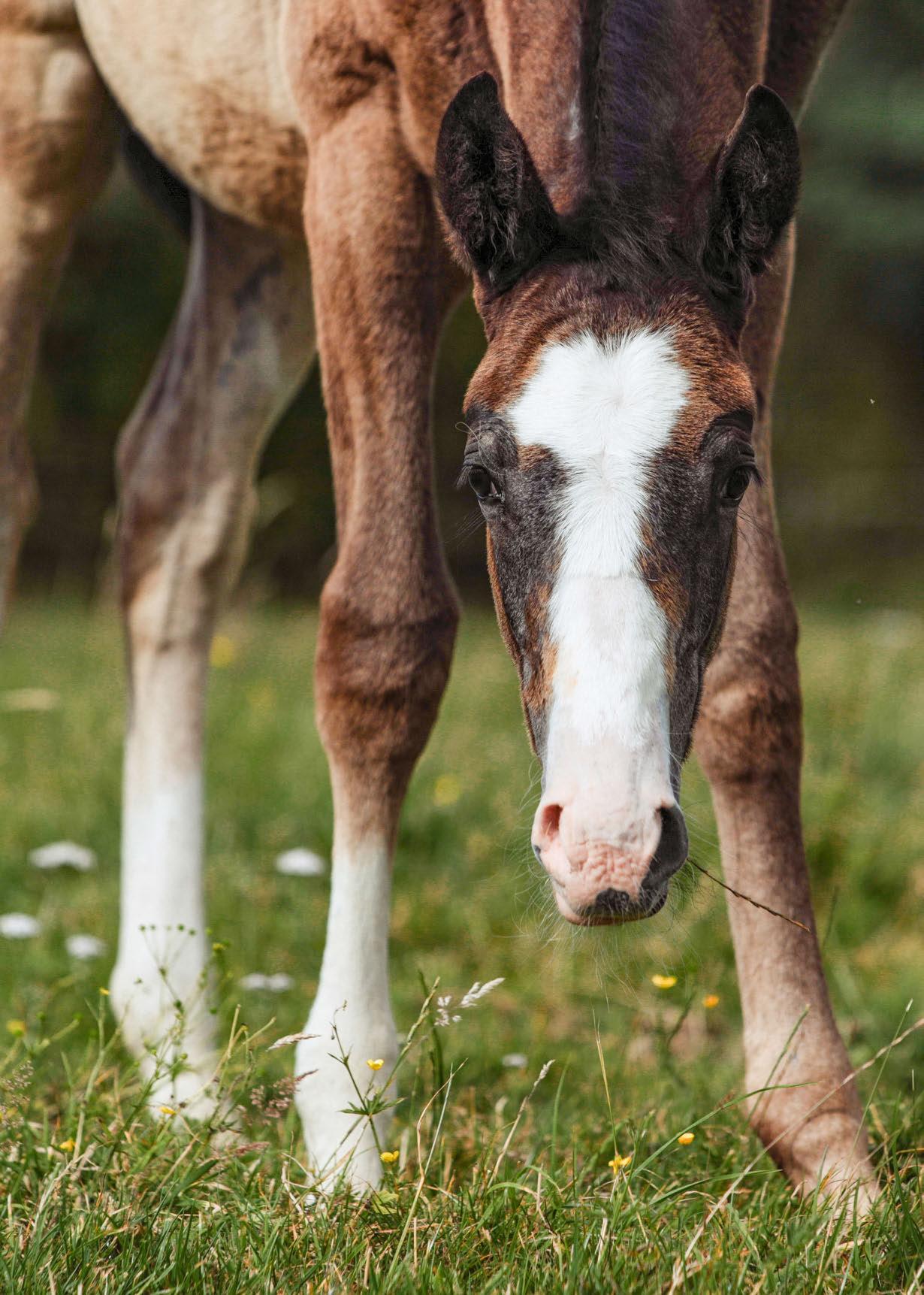
fingerprints can be found all over the history of the Irish Champion Stakes, stretching back to 1979 when Fordham, the Vincent O’Brientrained son of Forli, stuck under Tommy Carberry in the colours of pioneering owner Robert Sangster.
Three years later Assert, a son of Be My Guest trained by Vincent’s son David, carried the Sangster silks to victory in the ten-furlong Group 1, followed two years later by the race’s most influential winner.
No-one could have predicted what was to come when Sadler’s Wells denied Seattle Song by three-quarters of a length in the 1984 renewal staged at Phoenix Park. But suffice to say that the homebred son of Northern Dancer proved a gamechanger for Robert, his fellow ‘brethren’ in John Magnier and O’Brien, and, in time, the thoroughbred breed itself.
A trace of the Sangster prints were also found on this year’s Irish Champion Stakes winner Luxembourg, who is not only a descendant of Sadler’s Wells but was bred by Robert’s son, Ben. The Aidan O’Brien-trained son of Camelot produced a performance right out of the top drawer to prevail by a hard-fought half a length from Onesto, with Vadeni back in third and Mishriff in fourth.
“It was a fantastic thrill,” says Sangster as he relives Luxembourg’s Leopardstown heroics. “I thought he looked a picture in the paddock and it was a top-class race with the Grand Prix de Paris winner in second and a French Derby and Eclipse winner in third. It was the best race of the year so far, in my humble opinion.”
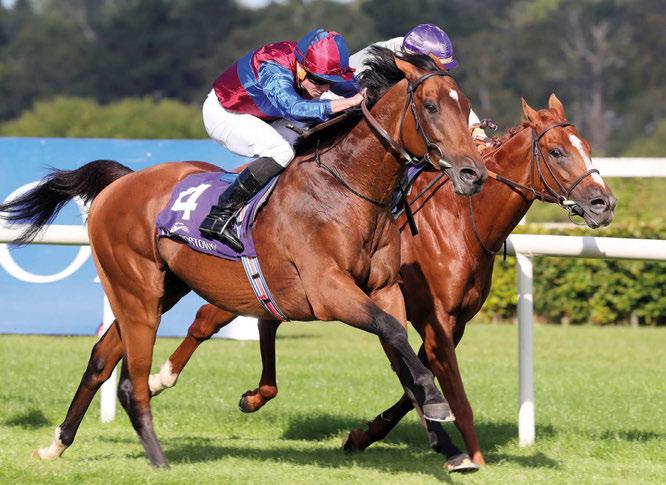
That was Luxembourg’s second Group 1 triumph following an unbeaten juvenile campaign that offered much and promised even more. A ready win
in a Killarney maiden was followed by comfortable victories in the Group 2 Beresford Stakes and the Group 1 Vertem Futurity Trophy.
Those performances saw the colt, who is owned by the Coolmore partners and Georg von Opel’s Westerberg, catapulted to the head of the ante-post market for the Derby, and his staying-on third behind Coroebus in the 2,000 Guineas did little to dampen enthusiasm. However, a muscular injury prevented Luxembourg from running at Epsom, and he wasn’t seen again until a belated reappearance in the Group 3 Royal Whip Stakes in midAugust, when he seemed to make heavy weather of denying Insinuendo.
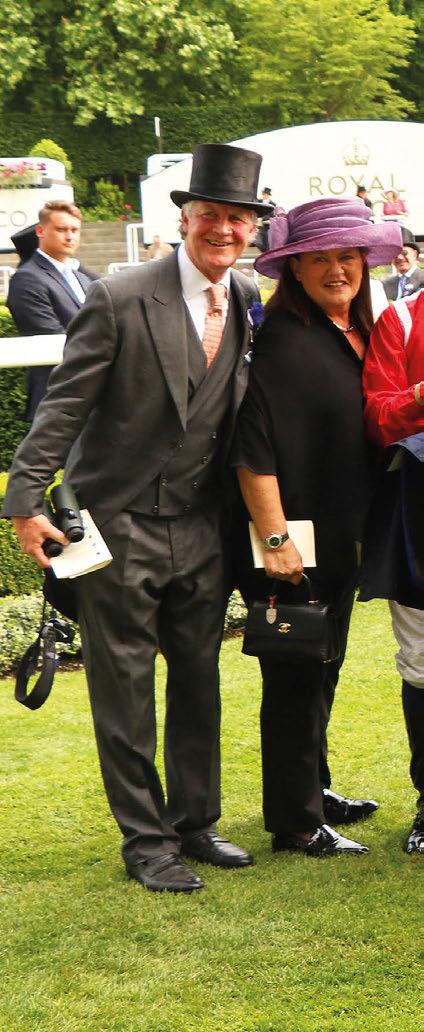
“We’d had all winter getting excited about him and the possibility of him
Luxembourg (nearside) has the measure of Onesto in the Irish Champion Stakes
running in the Derby,” says Sangster.
“Obviously when he had that mishap earlier in the year it seemed as though that might be that, but it was a brilliant training performance to get him back and to put him back where he belongs, at the top of the three-year-old tree.
“I’d spoken to Aidan a couple of times before he ran in the Royal Whip and he told me it was going to be a push to get him there. I know all the pundits were saying what a moderate performance it was in scrambling home, but only Aidan and the Ballydoyle team knew where they had him in fitness terms.”
While it would be an almighty stretch to suggest that Luxembourg could follow in Sadler’s Wells’ breed-shaping footsteps once his racing days are over, his latest Group 1 success has undoubtedly enhanced his stallion credentials. Indeed, he could yet have a major role to play in the survival of the Montjeu line, and Sangster is convinced he is the kind of animal that breeders would flock to at stud.
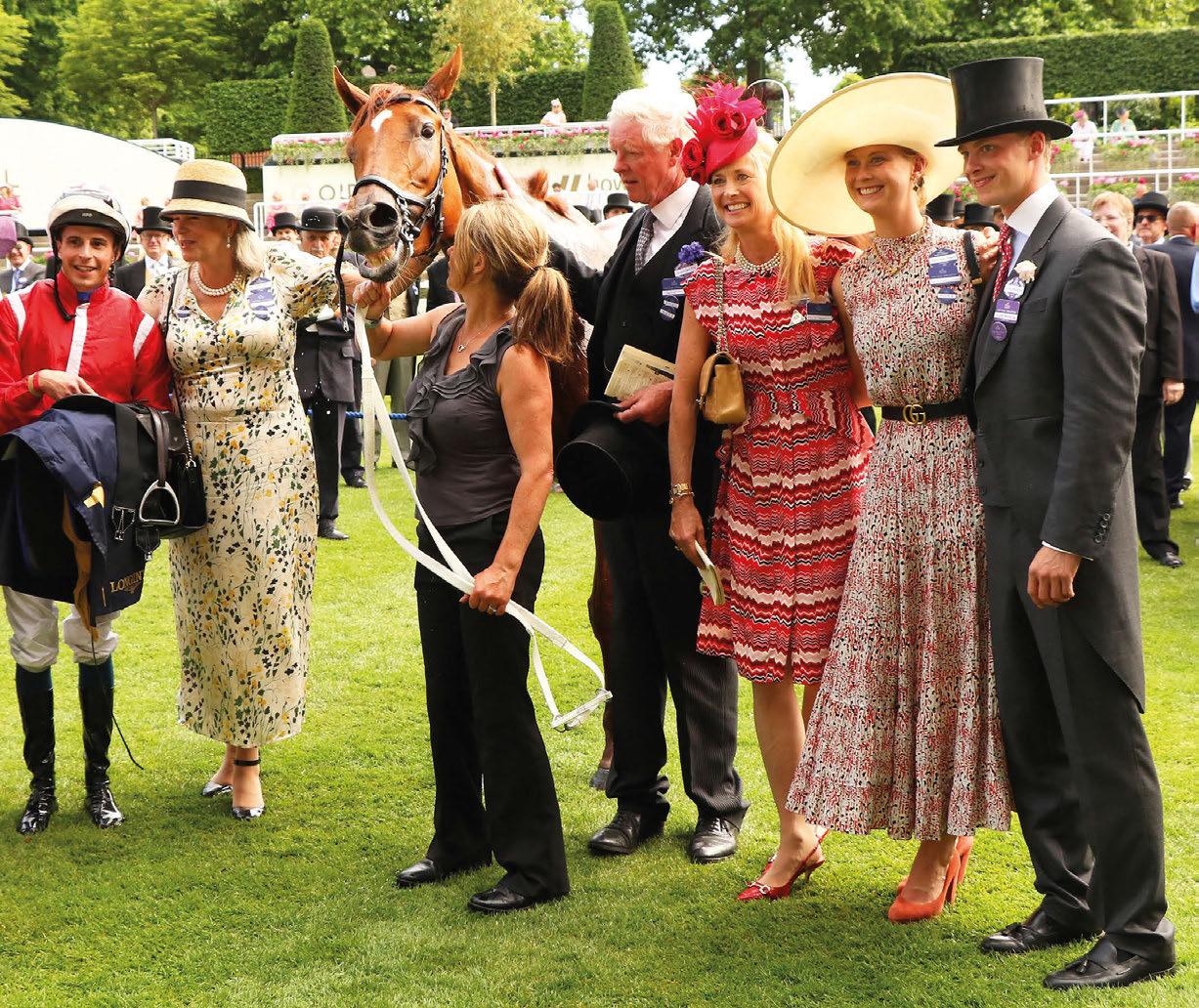
“He’s got a wonderful pedigree, he performed at Group 1 level at two and three, and who knows what he can do from here,” he says. “He’s got a gorgeous
conformation and he’s a big, scopey, handsome horse with a great walk to him. He’s what breeders would love to use, I’m sure.”
Incidentally, Luxembourg is not the first Irish Champion Stakes winner that Sangster has had a hand in, as he was involved in pinhooking the 1992 victor Dr Devious.
The son of Ahonoora was sourced with Paul Shanahan for 52,000gns at Tattersalls in December 1989, and resold to Robert through Demi O’Byrne for 56,000gns at the following year’s Highflyer Yearling Sale. According
to Horsetrader, Patrick Robinson’s unmissable biography of Robert, the new owner named the colt in honour of O’Byrne.
Having initially raced in Robert’s famous emerald green and blue colours, Dr Devious won the Dewhurst Stakes for Italian businessman Luciano Gaucci before Jenny Craig bought the colt as a birthday present for her husband, Sidney, for a reported $2.5 million. Dr Devious duly won the Derby on just his third outing for the American owner.
“Paul Shanahan and I bought him as a foal, although it was probably more his judgement than mine,” recalls Sangster. “We couldn’t sell him so we ended up putting the father into him and he ended up being Dr Devious. Everyone, all the way along the line, had a good time with him as he was such a magnificent horse.”
Sangster has long admired Luxembourg’s female line and has bought into the family on more than one occasion. Luxembourg is the fifth foal out of Attire, a homebred daughter of Danehill Dancer who didn’t cut much ice on the racecourse but has since revealed herself to be a producer of incredibly rare merit.
She has bred five winners from as many runners, three of whom have gained black type, with Luxembourg joined by Group 2 Mooresbridge Stakes scorer Leo De Fury and the Group 3 Leopardstown 1,000 Guineas Trial third Sense Of Style.
Luxembourg’s Group 1 triumph at two helped his year-younger full-brother Hiawatha top day two of last year’s Goffs Orby Sale when MV Magnier struck a bid of €1.2 million. The O’Brien-trained colt looked destined for bigger and better things when breaking his maiden at the
Curragh by three and a half lengths.
The mating between Attire and Camelot has been repeated for the last three years, and the mare has a yearling filly and a filly foal by the sire, and is safely back in foal to the Coolmore resident, who stood 2022 at a career-high fee of €75,000. Attire’s winning and Group 3-placed daughter Sense Of Style is also part of Sangster’s broodmare band; she too is in foal to Camelot.
“Camelot is an incredibly potent force,” says Sangster. “Attire is a Danehill Dancer mare so we were semi limited with where we could go and I think Camelot is a superb stallion. He’s had ten Group 1 winners and I think he’s probably reasonable value. Basically I just thought he’d suit the mare and we got lucky.”
Sangster first bought into the family with Afrique Bleu Azur, from whom
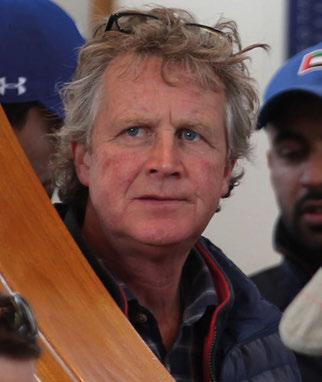
Robert bred the Caerleon filly Cape Verdi, winner of the 1998 1,000 Guineas for Sheikh Mohammed. Afrique Bleu Azur’s siblings include Prix d’Ispahan and Breeders’ Cup Classic hero Arcangues and the Group 3-winning Agathe, who is better known as the dam of three-time Group 1 scorer Aquarelliste. Another sibling is Asnieres, whose brood includes the Group 3 scorers Forgotten Voice and Australie, as well as Attire, who now resides in Ireland.
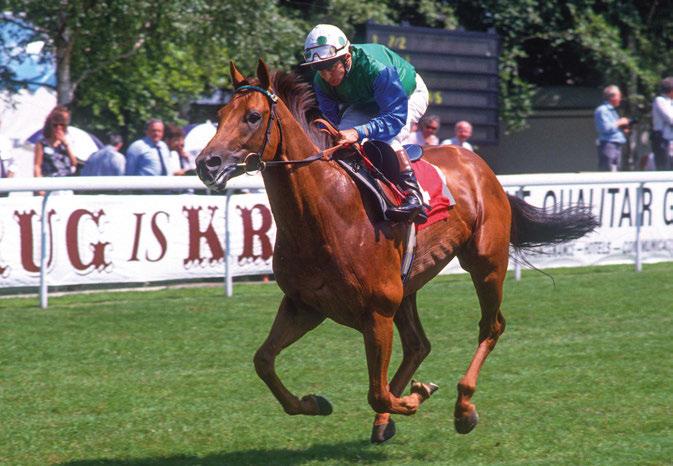
“I bred Attire and had Luxembourg’s grandmother, a mare called Asnieres who I bought a long, long time ago from Daniel Wildenstein,” says Sangster. “I love the family, it’s one of those deep Group 1 pedigrees. When you see that kind of form in prominent places in the pedigree they’re normally pretty good.
“We had a lot of luck with this family back in the day, probably around the time that I acquired Asnieres actually, as we had a filly called Cape Verdi. We’ve had so much luck with this family before that I thought I should go back to the well again.”
He continues: “Attire lives at Coolmore on one of the satellite farms called Kilsheelan. It’s not a huge farm but it’s a rich vein of land just outside Clonmel. That’s where Attire resides and it’s where Luxembourg was born and bred.
“She’s been a blue hen and they don’t happen very often so I feel blessed. I’m lucky to be involved in her and lucky to have the horse reared and bred with top-tier people down at Coolmore, and I’m even luckier that the horse went into a great spot in Ballydoyle.”
While some would argue that you make your own luck in a game as unpredictable as racing and breeding, no-one can deny that a bit of serendipity usually goes a long way. That is certainly the case with Saffron Beach, who Sangster owns in partnership with his son, Ollie, and James Wigan.
The Jane Chapple-Hyam-trained filly was in action shortly after Luxembourg’s Irish Champion Stakes triumph, and ran a valiant second behind Pearls Galore in the Matron Stakes to cap a memorable day. “We had a hell of a day,” says Sangster. “You never know what those days are going to be like, they can be a complete disaster or the opposite. Thankfully this was a red-letter day.”
When Sangster took ownership of Saffron Beach, a 55,000gns foal purchase by Liam Norris of Norris/Huntingdon, it was never the intention that she would race in his colours, but then fate took what initially seemed like a cruel twist.
“I bought her through Liam Norris,
who’s an extremely astute judge of a horse,” says Sangster. “We buy a few foals every year with a view to reselling them as yearlings but, in this particular instance, in the July time of her yearling year Saffron Beach met with a setback so couldn’t be sold. She missed every date she had at the sales so the next port of call was to put her into training.”
Sangster says that Saffron Beach, a first-crop daughter of Ballylinch Stud’s rising star New Bay, rather hid her light under a bushel during her time at Manton, and as such his initial aspirations for the filly were rather more modest than winning international Group 1s.
“She was reared here and she was a beautiful yearling,” he says. “No-one knew much about the sire at that time as she’s from his first crop but she had a nice enough pedigree. She was lame for a lot of her time here, so once she started cantering we basically just hoped that she’d stay sound. It’s been a great ride
Ben’s breeding accomplishments are not the only exciting thing happening in the Sangster family at present, as his son Ollie is on the verge of embarking on his training career from the Redpost yard on the Manton estate.
“Obviously I’m excited but I think apprehensive would be a fairer reflection at the moment,” Ollie says. “I’ve done all the online courses and I’ve got three modules to do during the autumn, so come the end of the year I should have the licence.”
The 25-year-old has had the gallop resurfaced and added some fresh bits of stable infrastructure, and will soon be ready to put into practice the lessons he has learned during his time spent at the side of some hugely successful trainers.

“I started with Barry and Charlie Hills right out of school and then worked in America for two years with Wesley Ward,” he says. “That was great and was probably my most formative time as the nature of the American system means you get thrown in at the deep end a bit as they can have different stables in different states. Since then I’ve looked after Wesley’s international runners when they’ve come over for Ascot too.
“When I came back to England I did a year with Hugo Palmer and I’ve been at Joseph O’Brien’s for the last two years.
“That was great and he’s clearly a very talented guy as he’s already chalked up over 1,000 winners. Obviously the facilities are different but a lot of the things he’s doing are in the same vein as what they do at Ballydoyle. There are a lot of interesting things happening there and that was another really educational experience.”
Of course, any trainer, new or established, relies on sourcing the right raw materials and Ollie has been working this year’s European sales hard, albeit without quite hitting the mark just yet.
“I’ve been outbid quite a few times this year!” he says. “I think I was underbidder four times at Doncaster, which is fine but when you’re working to a budget you have to stick to your parameters.
with her, an absolute dream.”
Saffron Beach has now won six of her 12 races, a record that includes a brace of Group 1s in the Prix Rothschild and the Sun Chariot Stakes, as well as the Group 2 Duke of Cambridge Stakes at Royal Ascot.
A repeat bid in the Sun Chariot Stakes is being considered, as are the Queen Elizabeth II Stakes and the Breeders’ Cup Filly & Mare Turf. Saffron Beach’s final engagement of the year will see her make a belated sales ring reappearance, as she is set to be among a star-studded line-up at the Sceptre Session on the Tuesday of the Tattersalls December Mares Sale.
Luxembourg and Saffron Beach are not Sangster’s only success stories this year, as he also bred Chester Vase and King Edward VII Stakes winner Changingoftheguard, who, like Luxembourg, races for the CoolmoreWesterberg axis. He is, however, adamant that the biggest piece of the puzzle has been good fortune.
“I’m just the recipient of being incredibly lucky,” he summarises. “It’s not being smart, it’s being lucky.”
“Equally, from a numbers perspective I don’t want to go buying horses just because they’re there and within budget. I have to like the horse as well and I’d rather have fewer that I liked than more that I don’t. But there are so many more horses to come [at the later sales], and good horses too, so it’ll be interesting to see how we go.”
While Ollie is from a family steeped in racing success, he is the first member of the Sangster dynasty to enter into the training ranks. Explaining what drew him towards taking out his licence, he says: “I love pedigrees and enjoy helping Dad with mating plans and looking at foals and yearlings, but I particularly love the day-to-day, hands-on nature of training and just being around the horses.
“I rode a lot when I was younger, so I spent a lot of my teens in racing yards, which is perhaps where I differ from other members of my family.”
Ollie is taking a pragmatic approach to his ambitions, long and short term, and is well aware that the financial realities of training racehorses in Britain in 2022 means his aims have to be adjusted accordingly.
“My short-term aim is to train a winner!” he says. “In the longer term you have to be realistic and my business isn’t necessarily going to pay its way by just being a B&B, so when the opportunity arises to sell horses who are having to run for less [prize-money] than they should be, I think more often than not my decision would be to sell.
“Unless you’re Mr Gosden or Mr Haggas training Group 1 winners, that’s the only way I can see it making sense from a commercial point of view.”
He adds: “I think you have to take the sentimentality out of it and ultimately it’s a business, and if you’re not making money it’s not going to be a business for very long.
“Don’t get me wrong, everyone wants to train black-type Saturday horses but equally you have to keep the show on the road. Hopefully I can strike a happy medium but I’d be only too delighted to sell a horse well.”
“It’s been a great ride with Saffron Beach, an absolute dream”
We have been breeding Thoroughbreds for 25 years and have never had a foal arrive on time, let alone early, as our mares are predisposed to late foaling. Using Equilume Light Masks this year had a dramatic effect on our mares’ gestation lengths, with reductions of 19 and 24 days, the production of mature, healthy foals and improved post foaling fertility. We are delighted and only wish we had started using Equilume sooner. This technology works and the customer support is second to none.”


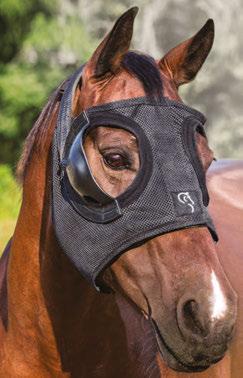
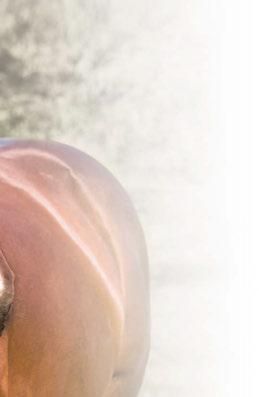
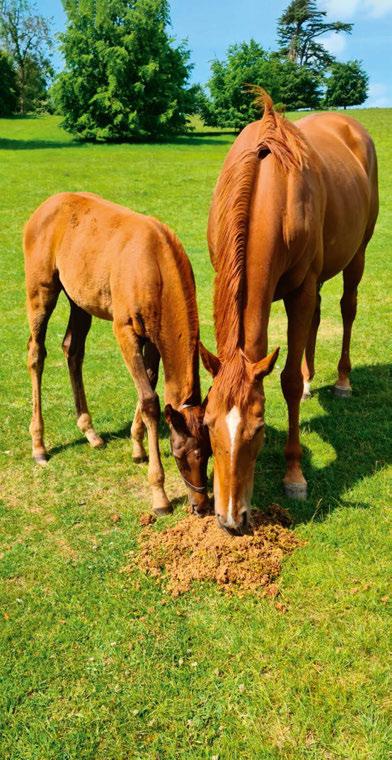
Brent

Breeder,


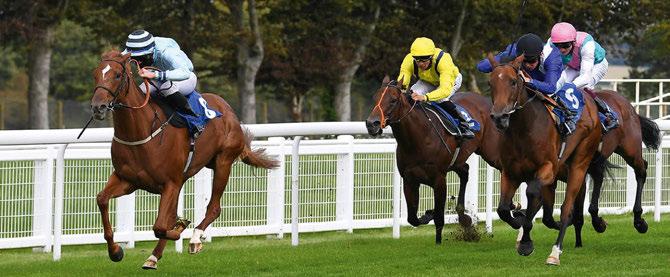
ilume.



Aswith anything, it is hard to quantify loss until it is experienced.
For racing’s tightknit bubble, the death of the Queen represents a colossal loss. Others have obviously exerted a greater influence within the sport, but then quite often she was the person who drew these people in, the high spenders who were keen to participate in the sport of kings and queens.
For here was someone who revelled in the sport itself, and for the love of the horse. It is said that as a young child she accompanied her grandfather, King George V, as he walked the Royal Studs at Sandringham. The King had taken great pride in the triumph of his Captain Cuttle filly Scuttle in the 1928 1,000 Guineas and indeed it is most likely that the future Queen inherited her lifelong passion for horses and racing from her grandfather, who had also given her a first pony, a Shetland called Peggy, for her fourth birthday.
The sport owes a great debt of gratitude for the fact that horseracing was her hobby, likely a release from the challenges of royal life. First and foremost, she was a highly accomplished horsewoman, yet also very knowledgable when it came to pedigrees. There were the occasional public flashes of insight, the depth of which would have put some seasoned racing observers in the shade. Her recollection of her father’s 1946 1,000 Guineas winner Hypericum, for example, revealed an important understanding of the filly’s bloodlines.
“Hypericum was a typical daughter of Hyperion, some of whose fillies were absolute devils,” she was quoted as saying. “Hypericum charged the tapes before the 1,000 Guineas and disappeared into the car park. I was there as a very young girl and it was a source of terrible excitement. She was caught and brought back, and of course, the extraordinary thing was, she then won.”
The Queen’s first advisor, Captain Charles Moore, had been a proponent of inbreeding and it is interesting to note that her 1957 Yorkshire Oaks and Ribblesdale Stakes winner Almeria was
closely inbred to Hyperion in what was an early – and successful – example of a curiosity to experiment with bloodlines.
Hypericum was a daughter of Feola, a 3,000gns yearling acquisition in 1934 by Brigadier General ‘Mouse’ Tomkinson. Over time that line would become a bedrock family of the Royal Studs, leading to the likes of 1974 1,000 Guineas and Prix de Diane heroine Highclere and her Group-winning daughter Height Of Fashion, subsequently an outstanding broodmare for Sheikh Hamdan.
However, the Queen also recognised the need to invigorate the stud with new bloodlines. Some additions were naturally more successful than others. Of those that survive today, Contralto, who was bought to inject some speed into the stud during the late 1970s, remains relevant via the line responsible for classy sprinter King’s Lynn, while the private purchase of the high-class twoyear-old Memory in late 2011 provided the Queen with the unbeaten Groupwinning juvenile Recorder, now at stud in France, alongside the smart stayer Call To Mind.
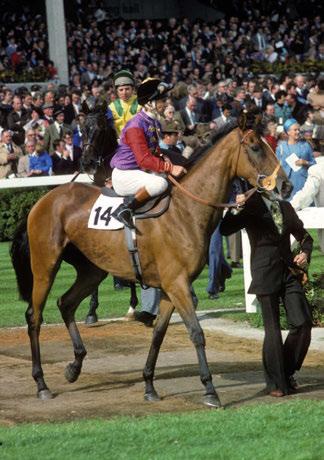
The tale of her visit to Doncaster sales in 1956 also bears recognition, given that the yearling Luminary filly that she picked out and subsequently
bought for 1,150gns was Stroma, the dam of her 1965 Eclipse Stakes winner Canisbay (another horse who was quite closely inbred, in his case to Prince Chevalier) and granddam of her 1977 Oaks and St Leger heroine Dunfermline, whose Classic sweep arrived in the monarch’s Silver Jubilee year.
It can’t have helped that for many years the Queen was restricted in her use of Irish stallions. Instead, however, she embraced what America had to offer, initially sending one mare, Nearco’s daughter Near Miss, to Native Dancer in 1963. Travelling stock across the Atlantic was nowhere near as straightforward then as it is today, and by that token there was seemingly a determination to use Native Dancer, subsequently a breed-shaping stallion, at his Maryland home.
By the 1980s the group of Kentuckybased royal mares were sizeable enough to be split between Mill Ridge and Lane’s End Farms. Ultimately, such use of Kentucky stallions probably didn’t enhance the broodmare band as much as anticipated. However, recent decades have represented something of a revival under the eye of manager John Warren, with the use of Irish stallions and the opportunity to tap into various bloodlines provided by Sheikh Mohammed and the Aga Khan key in a number of recent successes. Indeed, King Charles III has inherited quite the broodmare band, one that includes Memory, Ascot Gold Cup heroine Estimate, top Australian sprinter Sweet Idea and Portfolio, a stakes-performing daughter of Deep Impact.
With the death of the Queen, racing and breeding has arguably lost its most important champion. For the vast majority of us, there has not been life without her. Her constant presence, whether it be the annual certainty of a Royal Ascot or Derby appearance or the evident delight taken from the everyday winner, has been a driving force in helping racing retain a highlevel relevance to the outside world for so long. Yet there have been times when that has most likely been taken for granted.
Few have exerted such an important presence over our sport.
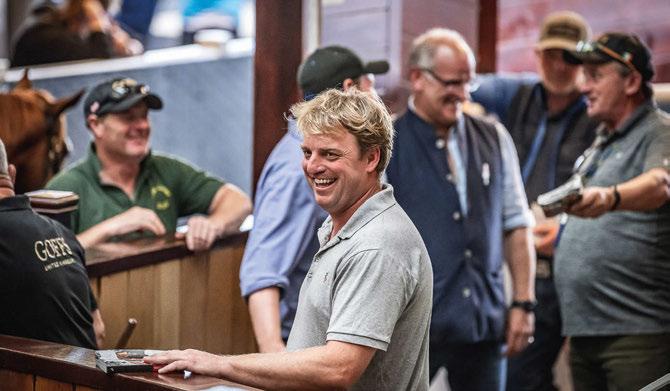
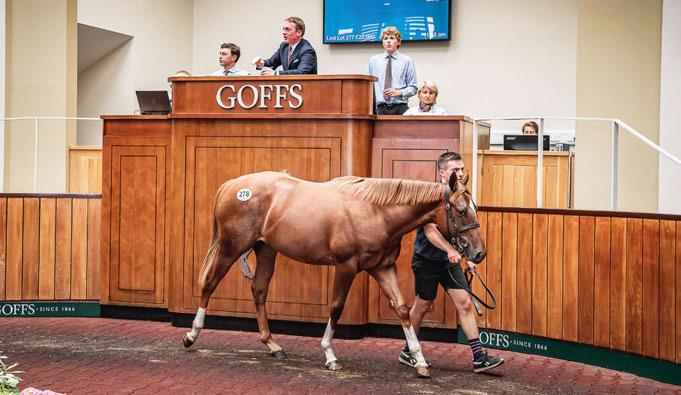
This was another excellent rendition of a sale which ignites the yearling sales season in Britain and has achieved such good results on the racecourse.
Trade was up, the mood was buoyant, and there were plenty of profitable pinhooks to provide optimism for foal vendors who are about to start prepping their stock. No fewer than 23 yearlings made a six-figure sum, ten more than last year, while seven hit the £200,000 mark, five more than in 2021. They included a Night Of Thunder filly who topped trade when selling for £240,000 and helping to lift turnover to under £16 million, a rise of 20 per cent that was helped by an additional 40 offered lots.
The average and median prices had both made 20 per cent gains in 2021, so to add another eight per cent on the average price (£44,043) and nine per cent on the median (£35,000) was a pleasing outcome.
Traders had just one catalogue to work with because Goffs UK dropped the Silver Sale, which in the past required a stand-alone session, but which last year filled up day two. The company has instead offered vendors of Silver yearlings a place in the Autumn Sale which has been renamed the October HIT & Yearling Sale.
The aforementioned sale-topper was offered by the O’Callaghan family of Tally-Ho Stud and knocked down to Blandford Bloodstock’s Stuart Boman,
who was acting for German racehorse owner Jurgen Sartori. Tally-Ho sold 24 lots for £1,544,000 to take leading consignor by aggregate honours.
Night Of Thunder, whose stellar season to date has included a hat-trick of Group 1 victories by the John Quinn-trained Highfield Princess, was also responsible for the leading colt, a £230,000 belter who left Mountarmstrong Stud after being knocked down to agent Mark McStay on behalf of an undisclosed client.
Other highlights included the £230,000 sale of Whitsbury Manor Stud’s Havana Grey filly out of Showstoppa, who ten years ago became
Showcasing’s first foal. Ed Harper of Whitsbury Manor Stud recalled how he received a message informing him of the birth, and while he immediately pictured a bay colt to give his new stallion a promising start he was informed “she’s a little chesnut filly”. Some filly, however, for Showstoppa won four races and her only two foals to race have gained black-type. Little wonder Highclere agent Jake Warren was keen to secure her latest offspring for Sheikh Isa of Bahrain, and duly did so.
The pick of the pinhooks involved a Dark Angel colt bought last year for 40,000gns by Guy and Serena O’Callaghan of Grangemore Stud. When reoffered in Doncaster he was sold for £200,000 to Ross Doyle, who was acting for Richard Hannon, while that trainer’s former jockey, Richard Hughes, paid the same sum for a Frankel colt who was consigned by Highclere Stud. Bids of £200,000 also gained Doyle a New Bay colt from Baroda Stud and the Hong Kong Jockey Club an Acclamation colt from Trinity Park Stud.
Doyle and his father Peter proved to be the leading buyers, gaining 17 horses for £1,162,000, while John Dance’s Manor House Farm in North Yorkshire became a prominent buyer or underbidder on a number of highervalued lots. Dance, bidding through his racing manager Maria Ryan and agent Ed Sackville, picked up nine yearlings for a total of £837,000.
F
F
-
Grey
C Acclamation
C New Bay
C Dark Angel -
C Frankel
C
Canarie
Park
C
F
C
-
-
Bloodstock
Bloodstock
Agency
& Ross Doyle Bloodstock
& Ross Doyle Bloodstock
Hughes
Spencer/Phil Cunningham
Manor House Farm
Manor House Farm
240,000
32,000 220,000
27,000 170,000
35,000 440,000
Europe’s yearling sales season continued on to Germany for this one-day event where the figures followed trends seen in France and Britain.
A 77 per cent clearance rate was not as high as those achieved at the Arqana August Sale and Doncaster, but German breeders tend to be less willing to take the ‘there’s a price for everything’ attitude to which their counterparts in other European countries adhere. They simply take horses home if bidding stalls below their valuation, and that valuation can be higher than the market indicates.
However, a 25 per cent increase in turnover to a mark just over €8.3m and similar percentage gains in the average price of €53,258 and median of €53,751 indicate the appeal of German bloodlines. They have been coursing through too many big winners to be ignored, and so this chance to buy into some of them drew an international group of buyers to BBAG’s Iffezheim sales complex near the River Rhine and border with France.
Kentucky-based bloodstock agent Jason Litt of Solis/Litt Bloodstock flew
in hoping to snare a quality yearling and duly gained the sale-topper, a €450,000 son of Kingman consigned by Gestut Fährhof. It transpired Litt was acting for Larry and Nanci Roth and their daughter Jaime who race under the banner of LNJ Foxwoods and keep horses in training
on both sides of the Atlantic. The Roths came into racing ten years ago and their biggest success to date was delivered at the 2019 Breeders’ Cup by the filly Covfefe. At Arqana’s August Sale in Deauville, they sold to Godolphin a €2m Dubawi colt which they bred in
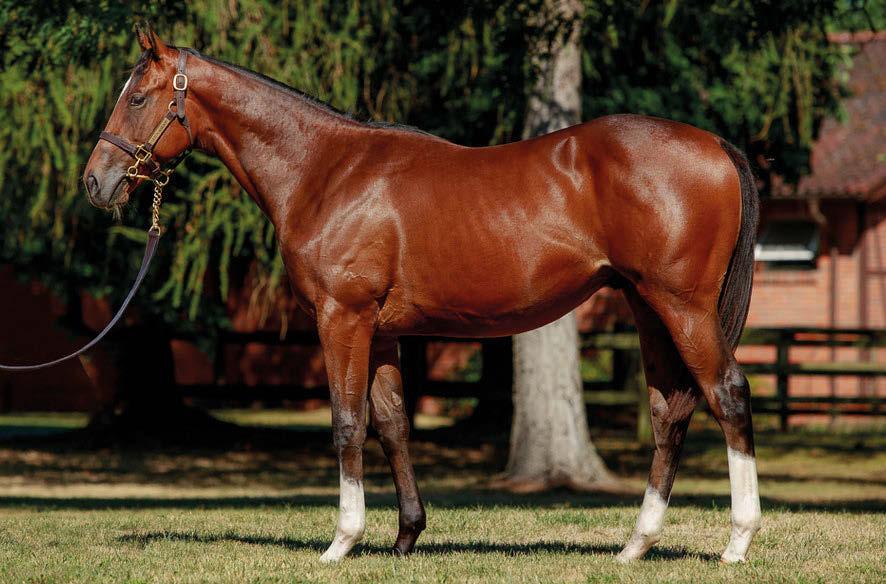
with Ecurie Des Monceaux.
Jacobs’s Gestut Fährhof also sold the sale’s second-highest valued horse, a colt by Night Of Thunder who realised €325,000 to a bid from trainer Andreas Suborics. He was acting for racehorse owner Jurgen Sartori who gained the £230,000 sale-topper – also by Night Of Thunder – at Goffs UK’s Premier Sale.
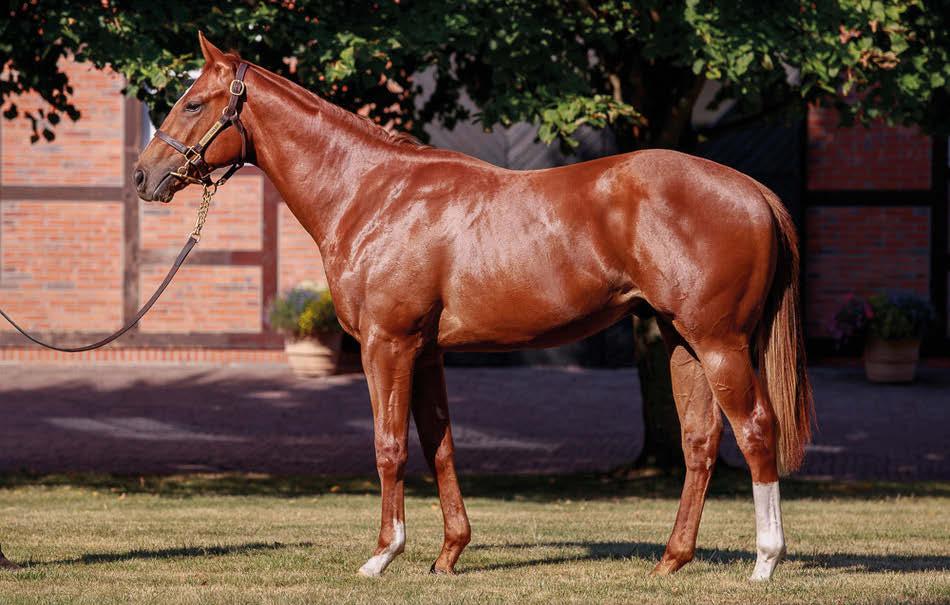
Yuesheng of Yulong Investments left with one of two headline fillies in the shape of a daughter of Frankel who was knocked down to BBA Ireland agent Michael Donohoe for €250,000. She was consigned by Ronald Rauscher, who had earlier been a buyer when going to the same sum in order to gain a Sea The Stars filly on behalf of owner Dr Christoph Berglar.
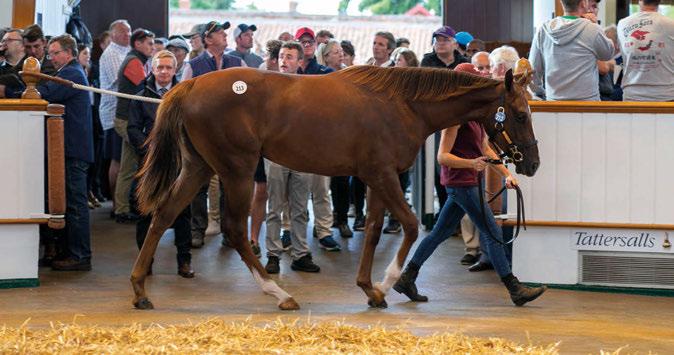
the
member
family to head the
the
– but
is very much a precocious young talent.
last year when it took over from a late summer sale of yearlings held at Ascot, it made a very good start with some healthy figures, but could be viewed in an even better light when its graduates started racing.
Stakes winner Bradsell – who sold for 12,000gns – gave it a thumping endorsement, as did Weatherbys Super Sprint winner Eddie’s Boy –
since in a Group 3 race at Chantilly – among others.
Not surprisingly Tattersalls was able to increase numbers slightly for this second edition, but the buyers were happy to swallow the larger banquet on offer and the 88 per cent clearance rate was up two points. An additional 20 horses walked the ring, taking the total to 290, and they turned over 7,746,000gns, a 56 per cent increase. Four horses made a six-figure sum, compared to one last year, while the average and median prices made considerable gains, coming in at 30,377gns (up 42 per cent) and 26,000gns (up 60 per cent) respectively.
Michael O’Leary’s racing investments came back into focus in September, predominantly through the announcement by his brother Eddie that Gigginstown House Stud would be ››
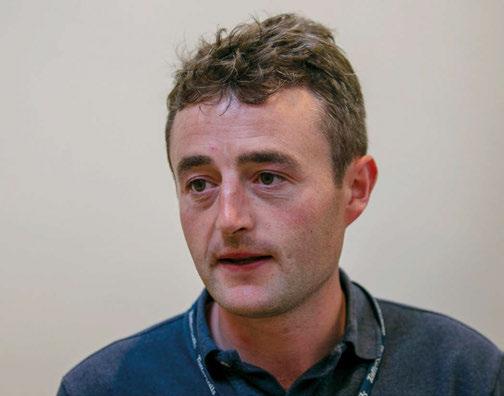
• There is plenty of evidence that training is a challenging business, not least on the financial front, as witnessed by a steady trickle of retirees.
Among more surprising recent additions to the ‘I’m giving up’ list has been Harry Dunlop, who aims to close his yard when the Flat season ends, plus Robert Tyner in Ireland and Caroline Bailey in England, who have already shut down their businesses. The last-named pair cited staff shortages as their reason for folding.
Yet there is no shortage of keen young people willing to give the game a try, and some get away to a very good start through support from enthusiastic owners who take pleasure in giving a newbie a leg up – and are often well rewarded. George Boughey is an obvious example, while James Horton, with the support of John and Jess Dance, has enjoyed some excellent results in his first season.
The next hot young talent could be Ben Brookhouse, who has yet to gain a licence, but is already buying yearlings in expectation of opening a yard next year. At the Goffs UK Premier Sale his purchases included a £150,000 Too Darn Hot colt, while at the Somerville Sale he picked up a son of Footstepsinthesand for 90,000gns.
Brookhouse’s father, Roger, an engineer and a longstanding racehorse owner who has enjoyed the bulk of his success over jumps, is backing his son’s career move.
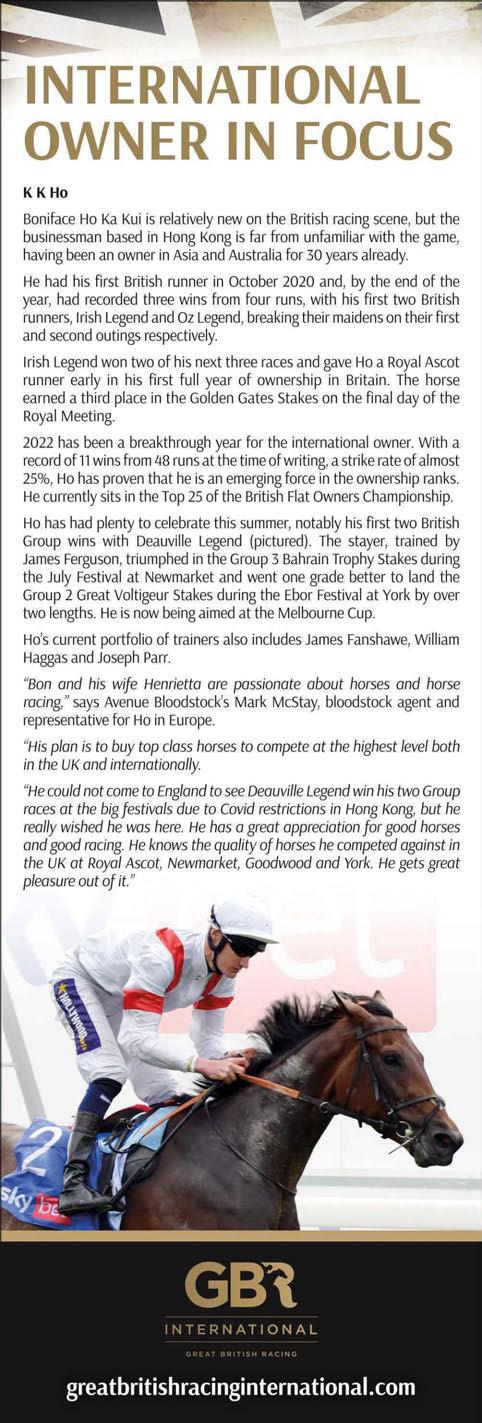
sending horses back to Willie Mullins after a six-year break. Michael also had a key role at this sale by courtesy of a filly and colt which he bred and offered for sale through his Newmarket-based Plantation Stud.
The filly, a daughter of Zoustar, headed trade when selling to Richard Hughes for 160,000gns, while the colt,
a son of Shalaa, added 120,000gns to the sale’s turnover when knocked down to Oliver St Lawrence. Both horses had failed to change hands at a much lower level when offered in the same ring as foals, but had grown and developed in the intervening nine months.
The ubiquitous Peter and Ross Doyle teamed up with Robson Aguiar to land
a colt by Mehmas for 135,000gns. Laurence and Michael Gleeson of the County Westmeath-based Aughamore Stud bred the colt when Mehmas’s fee was just €7,500, an absolute snip given his achievements, but that was before his first offspring began racing. Kia Joorabchian’s Amo Racing will campaign the colt.
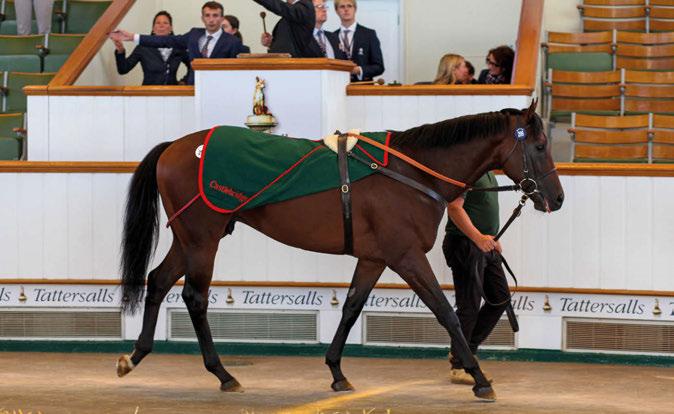
Reducing in size, but continuing to produce healthy figures, this one-day sale took place on the final day of August at Tattersalls’ Newmarket headquarters.
It was first staged as a three-day event in 2020 when Covid was causing upheaval to the racing programme and the sales company introduced an August sale for owners of horses in training who had missed out on selling stock at the traditional July Sale. The outcome was successful, and so the August Sale came back last year albeit reduced in size and held over two days.
The latest edition involved a single session following another reduction in the catalogue, from which 236 horses walked into the ring. Demand was high and 217, or 92 per cent, found a buyer, generating turnover which almost matched the previous year’s bigger catalogue.
The aggregate figure of 5,267,300gns was down just two per cent despite 77 fewer lots being on offer, the average price gained 29 per cent at 24,273gns while the median rose 40 per cent at 14,000gns.
Nine horses sold for a sum of 100,000gns or more and were headed by the three-year-old War Front colt
Operating, who joined the drift from Britain to overseas destinations when selling for 250,000gns to Saudi Arabia’s Najd Stud. Owned by Coolmore interests, Operating had been trained by John and Thady Gosden to win at Windsor and Nottingham ahead of his ring appearance. Najd Stud is now a leading buyer at the horses in-training sales, and gained the 350,000gns top
lot Fabilis at this event 12 months ago.
Middle-Eastern countries love a proven racehorse who can fit into their own racing programme, and four-time winner Mr McCann did just that, having shown a decent level of ability and an aptitude for quick ground. Exiting Hugo Palmer’s stable, he was sold for 210,000gns to Alastair Donald on behalf of a Bahraini client who will be aiming
their recruit at the island’s new series of valuable handicaps.
One of the stories of the season was concluded when three-year-old Mostly Cloudy was sold for 150,000gns to Australian agent Guy Mulcaster, a key component of the powerful yard run by Sydney trainer Chris Waller. Until Mostly Cloudy soared up the ratings with five handicap victories during the summer, the Tutty family of Yorkshire was best-known for success with point-topointers – Nigel Tutty won more than 150 races as an amateur, while his wife Karen and daughters Pip and Gemma all trained and/or rode winners.
Aiming to take over the trainer’s licence held by her mum, Gemma bought Mostly Cloudy for 23,000gns at last year’s Tattersalls Autumn Horses in Training Sale and, after stepping him up
• Once again the delicate subject of selling horses abroad came up for discussion during Tattersalls’ August Sale.
It is well-documented that owners are being tempted to sell by the rewards they can gain in the ring, rather than the money they can earn on British racecourses, but the timing of the August Sale raises the stakes. If owners keep horses on the go until the traditional third week of October and Tattersalls’ big Horses-in-Training sale, then trainers benefit from another eight weeks of training fees, which can be very handy, particularly for smallstring operators.
However, advocates of the August Sale – which includes bloodstock agents – point out the third week of October is later than ideal for shipping horses to warmer climates, particularly to those countries whose racing programmes gather pace in October. Sell in August, before horses start growing winter coats, and you not only get paid quicker, but you know your position ahead of the biggest European yearling sales.
in trip, unlocked the key to him in no uncertain terms, leading to Mulcaster’s interest and successful bid. It was tough
for the Tuttys to see their stable star leave, but what a result for a fledgling trainer.
This sale in the south-west of France is losing ground to competitors, if the shrinking size of its catalogue and leading prices are a guide.
A two-day sale for many years it was reduced to a single session when the latest edition was held, the number of yearlings on offer collapsing from 261 in 2021 to 132. The average price held steady at €11,633 while the median gained 11 per cent at €10,000, but worryingly for Osarus turnover dipped below €1m for the first time since 2010.
Back in 2014 it appeared to be the only way is up for France’s second bloodstock sales company. After gaining ground and good results, Tattersalls
stepped in and bought a majority share in the company, but appears to have departed – without fanfare or a press release – in the past couple of years.
Reflecting on the latest edition of its annual yearling sale, Osarus’s Managing Director Emmanuel Viaud took some comfort from a slightly improved clearance rate and the presence of overseas buyers, while acknowledging that Arqana had taken some yearlings which he hoped to offer. Most pertinently he said: “We will work on it. It might not be a top-class sale, but it’s very useful for the small breeders especially.” A lot of people would drink to that.
Florent Fonteyne of TrottingBloodstock secured the sale’s top lot, a €45,000 Intello filly consigned by Elevage de la Seguegne, and there will have been small profits for vendors of two fillies and a colt by Dabirsim who each made €30,000. Dabirsim was standing for €12,000 at Haras de Grandcamp in 2020, although his fee was down to €8,000 this year.
Visitors from abroad included shrewd pinhookers Con Marnane and John Bourke. Marnane secured seven horses for €68,000, and will only need one good one to emerge – either as a breezer or as a racehorse in France – to be in profit, while Bourke’s buys under his Hyde Park Stud banner included a €25,000 filly by Zelzal.
A busy week for Goffs’ Henry Beeby and his staff on either side of the Irish Sea opened with this one-day auction in Doncaster, followed 24 hours later by a selling stint at Yorton Stud in North Wales.
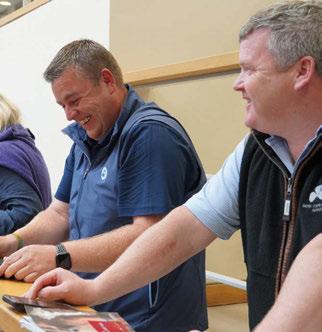
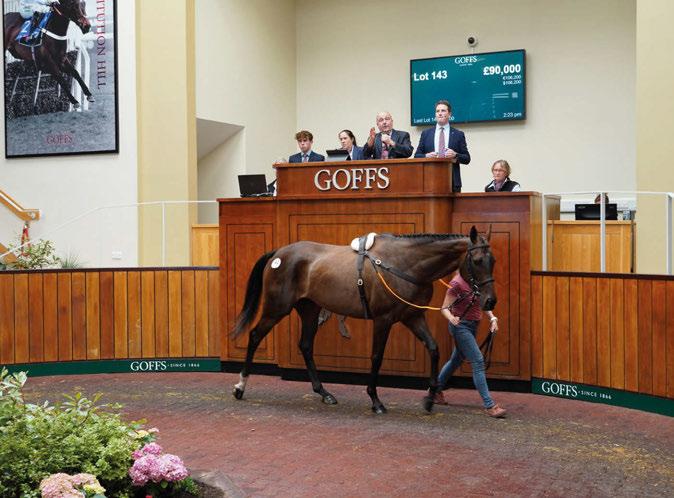
It was then off to Ireland for the Champions Sale at Leopardstown, although with just four lots that event was not as hectic as Goffs would have liked, and just one of the quartet found a buyer. That was the three-year-old filly Freedom Of Speech – a winner for Jim Bolger at two and placed in Group 3 company this season – who was knocked down to Bobby O’Ryan for €140,000.
This was the first Champions Sale since 2019, and in the interim period online sales have become part of the landscape, if not fully established. Whether that lay behind the size of the catalogue is hard to judge, but Beeby said the event has a future as part of the two-day Irish Champions Weekend.
Catalogue size was also a factor in Doncaster where the September Sale involved offered 113 lots, down from 152 last year and 243 in 2019. How Goffs UK would have liked another 100 horses, and the buyers were certainly out in force, resulting in 106 sales, or 94 per cent of those who walked the ring.
The average price was up three per cent at £12,209, the median gained six per cent at £8,500, but the smaller catalogue resulted in a drop in turnover to £1,294,200, a fall of 15 per cent.
Goffs UK Managing Director Tim Kent commented on his gratitude to the O’Leary brothers for steering another 16 Gigginstown House Stud horses to the sale as part of its annual cull. Offered
without reserve they all found new homes, headed by Battleoverdoyen, a nine-year-old with some smart form and who ran two good races without winning at the Galway Festival.
He was sold for €67,000 to Aidan O’Ryan who revealed the gelding would be heading back to his box at Gordon Elliott’s yard having been bought by syndicate organisers Pioneer Racing. Other Gigginstown sales involved a £48,000 transaction involving nineyear-old Tout Est Permis who was knocked down to agent Marcus Collie on the way to a stint of hunter chasing under amateur rider Brodie Hampson. There was no need to ask who will train the grey, for Hampson
Archie Watson, a leading Flat trainer who does well with jumpers.
was headed, however, by the winning four-year-old filly Royal Creek, bred, owned and raced by Edmond Kent of Ballyhampshire Stud and sold to
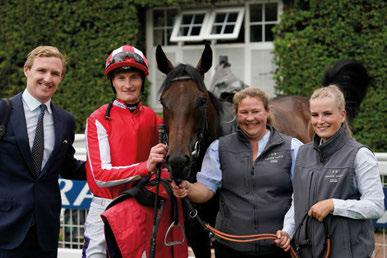
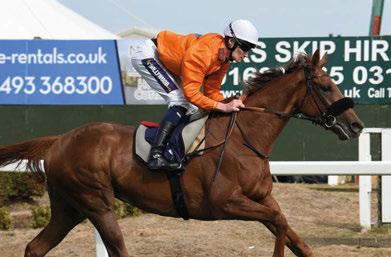
racehorse owner Kevin Jardine for £90,000. Jardine, whose other purchases included the six-year-old novice chaser Ganapathi for £38,000, was buying for partnerships who will place their horses with Patrick Neville.
The last-named relinquished his Irish trainer’s licence a couple of years ago, but has been working at Ann Duffield’s Yorkshire stables and is on the way to gaining a BHA licence to open a yard in England.
7 wins Captain Kane is leading the George Scott Team from the front, being the winning most horse in the UK this year.

is having his most successful season to date, with 32 winners so far in 2022, striking at 20%
majority of these winners have come from modestly priced horses, sourced by George from the European yearling sales.
Turning a stud farm into a sales complex for a day takes some doing, but Dave Futter and his family and staff have become adept at the art.
For this, the fourth edition of Yorton’s sale of jumping stores, lines of artificial grass walk ways had been laid down, while the usual paraphernalia needed to stage a modern-day auction – including cameras and digital accoutrements to relay live pictures to Goffs UK’s website – were in position. There is also the small matter of a well-stocked bar and plenty of food for the pre-sale party and refreshments on the day, which only adds to the logistical challenges.
With that in mind it was good to see Yorton being well-rewarded with another highly satisfactory sale involving turnover that once again powered into seven figures. Within hours of the sale’s end, and while the final pieces of paperwork were being worked upon, news came through that HM The Queen had died, a sombre note on which to end a buoyant occasion.
Yorton made another small change to this year’s catalogue by restricting it to two-year-olds and omitting yearlings. The goal was the same, to trade young Yorton-bred horses or those bought as foals or yearlings, and then hope buyers will be rewarded either on the racecourse or by pinhooking their purchases as three-year-olds next year.
Results so far have been good and a large audience arrived, including a number of people who are based in France or who hoped to buy and then
send their purchases across the Channel, the French racing programme offering plentiful opportunities to threeyear-old jumpers.
Britain’s new series of juvenile hurdle races is also likely to prove a boost to
this sale, and it certainly was in the mind of Gloucestershire trainer Ben Pauling, who purchased no fewer than six of the 41 lots on offer. A total of 36 horses changed hands, a clearance rate of 88 per cent, generating turnover of £1,147,000, a one per cent rise.
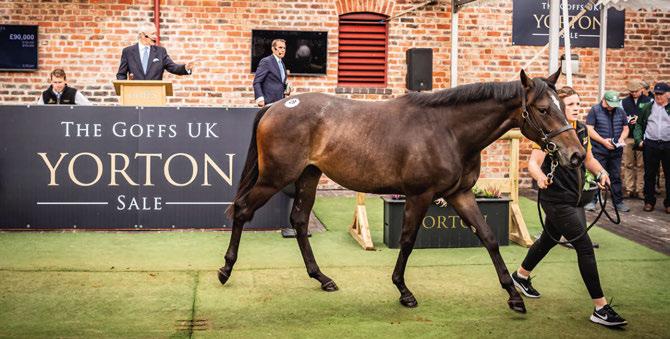
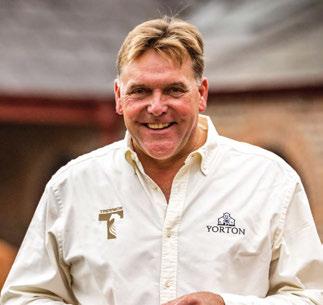
The average price of £31,861 and the median of £30,000 were both rises of 15 per cent. Futter noted that turnover would have been even higher but for the eleventh hour withdrawal of a couple of desirable lots by Blue Bresil due to minor knocks, although he will no doubt find homes for them before long.
Teaming up with the Highflyer Bloodstock team Pauling gained the top lot, a £90,000 filly from the family of high-class racemare Bitofapuzzle and sired by Blue Bresil, the Glenview Stud stallion who, as predicted, was to have such an influence on the day’s takings.
RACING

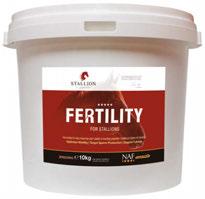
“Flo” STUNNING 3yo filly by SEPTEMBER STORM ex MATERIAL WORLD

or 25% shares available
a five time winner and a multiple black type performer rated 149 over hurdles, despite having only the one eye,
won over
Half-sister to bumper and hurdle winners

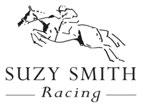
is the
Unraced and
prize money
WORLD and STRIKE THE FLINT
and has had great success
time winner LONGHOUSE SALE
STORM
moves
has just started hack cantering.
beautiful Angmering Park Estate.
SMITH
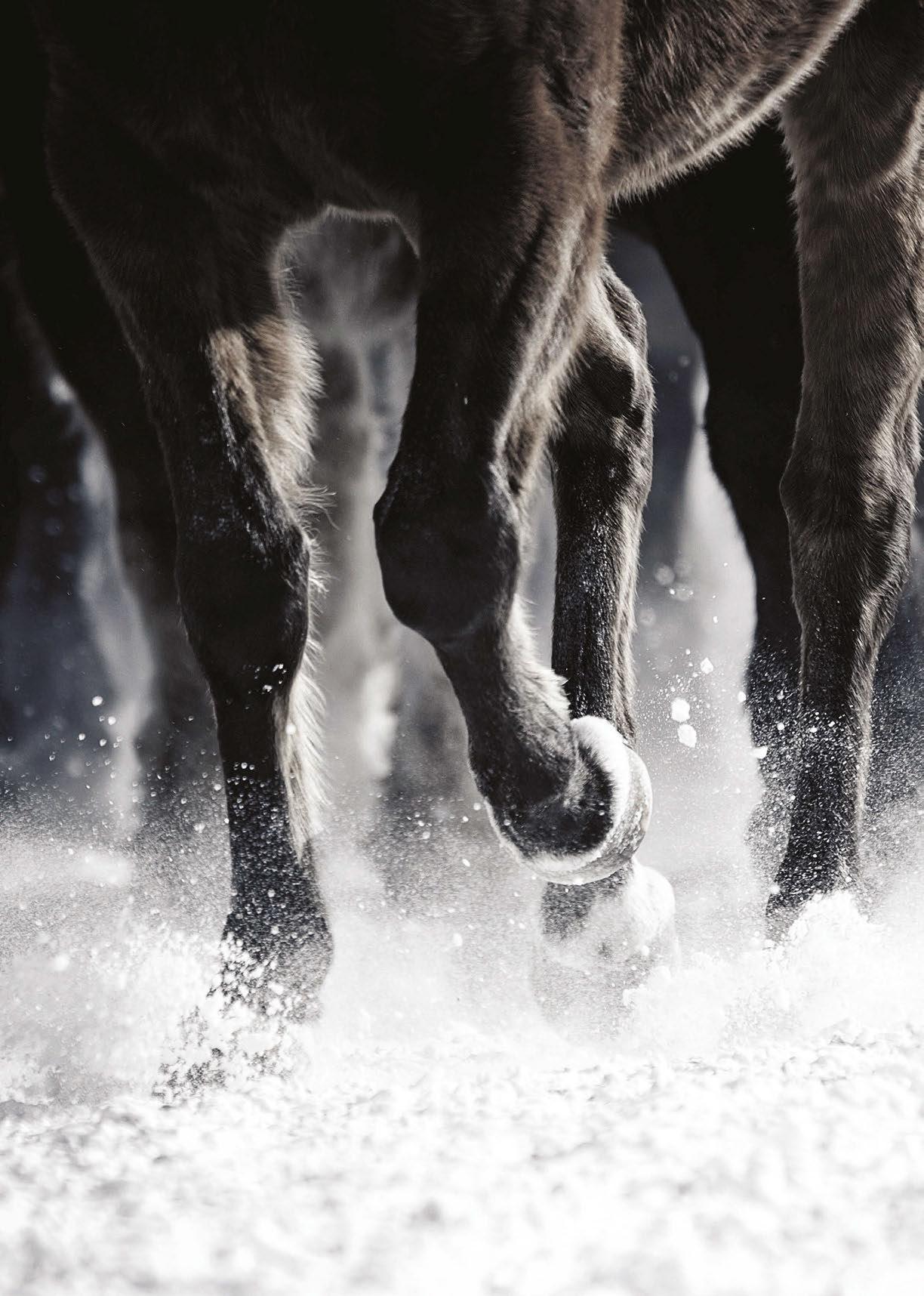






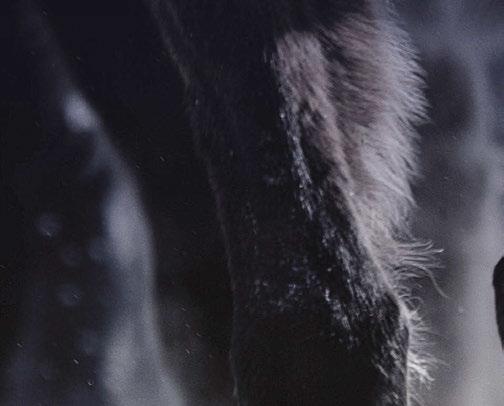
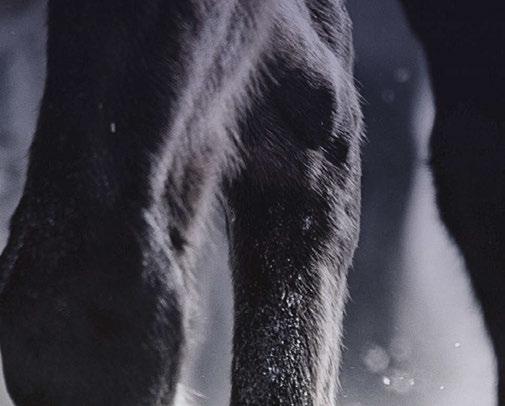

One of jump racing’s leading sires –think Constitution Hill and you need think little further – he was represented by 13 lots who had been conceived when he stood at Yorton Stud before moving to the Cashman family’s Glenview Stud.
When buying the top lot Pauling was acting for The Megsons, aka Andrew and Jane of that surname, who, as the Yorton Sale was unfolding, were watching their progressive two-year-old filly Polly Pott land her fourth race in a row when taking the May Hill Stakes at Doncaster for trainer Harry Dunlop. It is ironic that Dunlop should find himself handling such a horse just as he is
This new, two-day sale took place in Deauville and was effectively a replacement for Arqana’s V.2 auction which in recent years was held immediately after the company’s August Sale.
The goal of finding and selling precocious types remained the same and the outcome was a satisfactory opener, but with questions to ponder. Of the 274 yearlings who went under the hammer 203, or 74 per cent, found a new home turning over €3.9m at an average of €19,236 and a median of €15,000.
Bearing in mind the former V.2 version of the sale often achieved similar turnover in a single session, and the average price only dipped below €30,000 once – in its debut year of 2013 – and you can see why Arqana will be looking at modifications. Eric Hoyeau and Freddy Powell’s jointstatement at the close of play said: “We still have some adjustments to make to the format of this young sale, which
about to give up training, but in the case of Polly Pott it turns out the beneficiary will be Pauling, a man noted for his skills as a NH trainer, but now with a talented Flat performer to handle next year.
Other Pauling purchases at this sale included a £55,000 son of the Germanbased Protectionist who will also carry The Megsons’ colours. Yorton had bought the gelding for €26,000 at Baden-Baden in October.
Visitors to the sale included Fran Berry, no stranger to Blue Bresil having married into the Cashman family which stands the stallion. Berry was happy to part with £68,000 to gain one of Blue
Bresil’s sons who he said will be reoffered next year. Bloodstock agent Tom Malone gained another son of the sire, paying £55,000 on spec, while Joey Logan and Alan Harte, two men who have done well buying three-yearold stores and then reselling them after a point-to-point run, gained a £52,000 half-brother to Listed-winning hurdler Midnight Tour by Blue Bresil.
Logan, who bought three horses for £128,000, said he and Harte would be sending their acquisitions to France to take advantage of the racing programme. It seems Britain’s new juvenile hurdle series cannot come quick enough.
Marais agency which is based in Paris. Para secured nine horses for an aggregate of €234,000, including the session-topper on day two, a €74,000 daughter of Goken who goes into training with Fabrice Vermeulen and will carry the colours of Bernard Giraudon.
The racehorse-owning and breeding Chehboub family, who own Haras de la Gousserie in the Mayenne region of France, secured the sale’s overall top lot, a Toronado colt who was sold to Mathieu Alex on day one for €120,000. A filly by the same stallion topped last year’s V.2 sale when making €140,000.
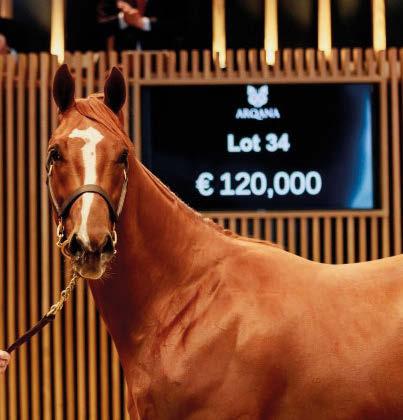
must find its place.”
The two men took comfort in the number of French trainers who attended the sale, but visitors from Britain and Ireland were not so plentiful. Johnny Hassett made his presence felt, as did John Bourke, Nick Bradley and Paul Harley, although leading buyer honours went to Jeremy Para’s Le
Hassett’s purchases include a colt by first-season sire Inns Of Court who was knocked down for €85,000 in the name of Get In The Game, a project he created last year and which enables investors large and small to share in a pinhooking plan. The Inns Of Court colt could be offered at next year’s Tattersalls Craven Breeze-Up Sale, said Hassett, whose Get In The Game website offers information to those who fancy joining in.
Ten years old, this sale of jumping stores was able to post a new high when the top lot, a son of Doctor Dino, made €70,000.
That was comfortably the best price achieved at the event since Arqana joined David Lumet in organising the auction at his pre-training complex Ecurie de la Ridaudiere, near Angers. It bears similarities to David Futter’s Yorton Sale, although Lumet sells two- and three-year-olds and gives buyers the chance to view horses loose cantering plus film of them jumping. The latest sale also staged sales of nominations to the stallions Nirvana Du Berlais and Goliath Du Berlais which raised a total of €13,200, some of that money going to charity.
Since Arqana became involved the sale has been a tale of growth, with


turnover at the most recent edition rising 33 per cent to a figure of €846,000. The average gained 20 per cent at €18,391, while the median rose four per cent to a mark of €13,000.
Davide Satalia, a relative newcomer to the training ranks in Chantilly, secured the sale-topper, who came from the close family of Paul Nicholls’ superb chaser Politologue and the dual Grand Steeple Chase de Paris winner Docteur De Ballon.
Another quality chaser who Nicholls trained, Le Prezien, appeared in the pedigree of his half-sister, a filly by Great Pretender who was knocked down for €65,000 to agent Florent Foneyne of Trotting Bloodstock.
Visitors from abroad who bought horses included JD Moore, who gained five lots, headed by a €38,000 Kapgarde gelding, while the Bleahen Brothers and Richard Venn also made a mark.
From the moment the first horse into the ring realised $850,000, it was clear that the 2022 renewal of the Keeneland September Sale in Kentucky would surpass all expectations, writes Nancy Sexton.
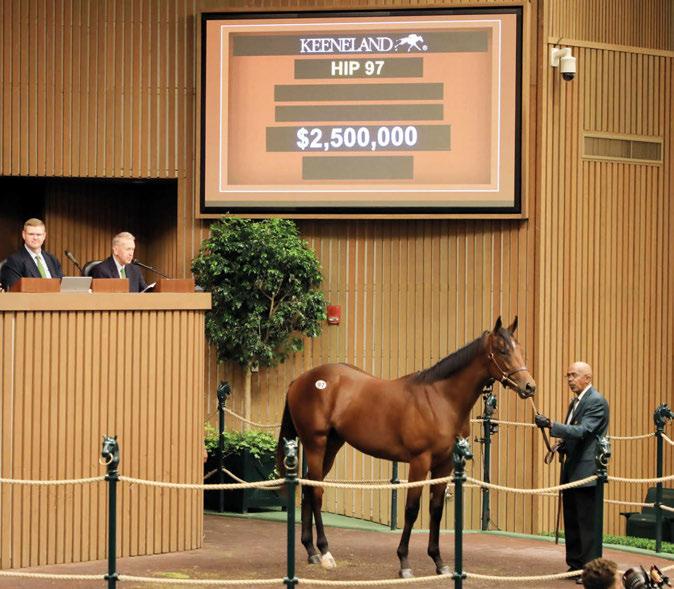
It’s doubtful that we will see a yearling sell beyond $10 million again in the near future, as Meydan City did in 2007 when knocked down to John Ferguson for $11.7 million. But in return for a more measured trade, there appears to be a deeper market across all levels. With various powerful racing partnerships keen to show their hand, no fewer than 30 youngsters broke the million-dollar mark across the first two books – the most since 2007 –while come the end of Book 3, 161 had realised $500,000 or more.
It was a momentous sale for Chiquita and Jeff Reddoch’s Stonehaven Steadings, whose draft contained seven yearlings to break the $500,000 mark headed by the $2.5 million sale-topping Quality Road colt. A homebred out of the Grade 3-placed True Feelings, he was purchased by Talla Racing, Woodford Racing (headed by Bill Farish of Lane’s End Farm) and West Point Thoroughbreds, the same trio who teamed up to purchase last year’s $1.7 million sale-topper by City Of Light. A busy 2021 sale for the partnership had also featured the purchase of True Feelings’ Justify colt for $1.55 million; given their determination in outbidding Coolmore this time around, it seems likely that the Justify colt, now named Nuclear, is pleasing connections.
In all, Talla Racing, Woodford Racing and West Point Thoroughbreds wound up with $6.5 million of stock with which to go to war with. In the case of the sale-topper, West Point’s Terry Finley confirmed that he would head to
California to join John Sadler, handler of the world’s highest-rated horse Flightline for another partnership that also includes West Point and Woodford Racing.
Other partnerships also flexed their muscles, notably Mike Repole and Vinnie Viola’s St Elias Stables, which teamed up to buy 31 yearlings worth $12.84 million during Books 1 to 3. Agent Michael Wallace also spent close to $4 million on behalf of St. Elias while Repole partnered with various other entities to land another eight lots, including a $1.1 million City Of Light colt. Meanwhile, the BSW/Crow Colts Group/Spendthrift/Gandharvi spent $4.29 million on ten yearlings and Donato Lanni, acting on behalf of SF/ Starlight/Madaket – otherwise known as ‘The Avengers’ – shelled out $12.85 million for 21 yearlings.
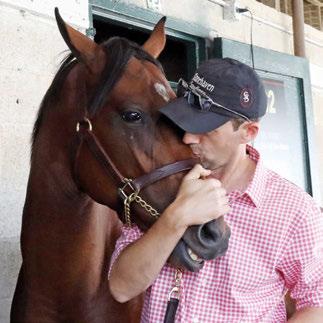
British agent Richard Knight also made the trip over a worthwhile one, spending $4.875 million to acquire six youngsters, among them seven-figure yearlings by Constitution, Gun Runner and Justify. Plans call for them to stay in the US to be trained by Graham Motion and Brendan Walsh on behalf of an undisclosed client.
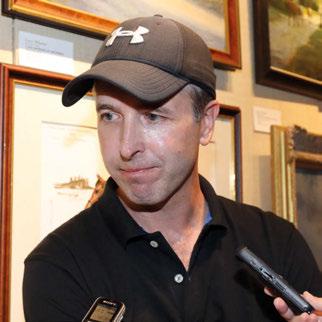
However, for all that spending power, perhaps no sight was more welcome than the return of Shadwell Farm to the buyers’ sheets. With Jonathan Smyth,
co-manager of Shadwell’s Kentucky branch, among those working the sale grounds, the team came away with three well-bred fillies for a total of $2.1 million, namely a Constitution half-sister to this year’s Preakness Stakes winner Early Voting at $750,000, a Medaglia d’Oro filly out of Grade 1 winner Centre Court at $700,000 and a Ghostzapper three-parts sister to champion Knicks Go at $650,000.
Established sires such as Into Mischief, Curlin, Quality Road and Tapit were each represented by million-dollar yearlings but the focus very much also honed in on some of the younger American sires coming through, none
Time, a son of
special
returning a $402,692
to 2 –
of
Figures
a
113,660,000
2,500,000
1,600,000
2,000,000
With significant increases across the board, Canada’s premier yearling sale made a welcome return to pre-Covid levels, writes Nancy Sexton
Gross sales increased by 22 per cent to C$3,837,700 while the average rose by 28 per cent to C$19,901. Particularly encouraging, however, was the median, which leapt by 95 per cent to C$19,500.
Unsurprisingly, progeny of Kentuckybased stallions dominated the top end
of the market with a colt by Airdrie Stud’s Cairo Prince leading the way at C$115,000. The sole yearling by his successful sire on offer and the second foal out of minor Canadian stakes winner Hopping Not Hoping, he was knocked to Dr Robert McMartin for C$115,000.
While the sale was once again primarily the domain of domestic buyers, Irish pinhooker Johnny Collins of Brown Island Stables was one
international investor to make the journey – and he made it worthwhile with the purchase of a first-crop son of Yoshida (a Grade 1-winning grandson of Sunday Silence who stands at WinStar Farm in Kentucky) for C$46,000. It was another example of the breeze-up community leaving no stone unturned in the quest to secure ammunition for next spring, and indeed within 24 hours, Collins was in Germany working the BBAG September Sale.

The spectacular first Dubai Breeze Up Sale recorded the highest price and highest average of any Breeze Up Sale conducted by a European auction house.
Nominations close 1st December 2022
Contact Nick Nugent or Tom Taaffe at Goffs for more information or visit Goffs.com
Thereare two sides to every coin and, as such, in the shadow of immense success comes some inevitable drawbacks.
In thoroughbred breeding, one example has been the dominance of Northern Dancer. Whether in Europe, the US or Australasia, it has become a ubiquitous force, giving us Sadler’s Wells and his son Galileo alongside the likes of Danzig, Storm Cat, Nureyev and Lyphard among many others. At the same time, however, other lines have been squeezed out. Perhaps they would have petered out anyway as part of a natural cycle.
However, I can’t help thinking that the process has been accelerated in recent years by a collection of factors; for instance, the arrival of big books and increased importance of the commercial market to go with the power and popularity of Northern Dancer and his descendants.
At the time of writing, 22 of the top 25 stallions on the champion sires’ list descend in one form or another from Northern Dancer. The outliers – Dubawi and his sons Night Of Thunder and New Bay – are descendants of Mr Prospector.
Matters are slightly more varied in the US, where the current top ten consist of two male line descendants of Northern Dancer (Into Mischief and Not This Time), five belonging to Mr Prospector (Quality Road, Curlin, Speightstown, Munnings and Gun Runner), two descendants of A.P. Indy (Tapit and Tonalist) and one welcome representative of Caro (Uncle Mo). Even so, it’s a far cry from the days when the likes of Roberto, Halo, In Reality, Ribot and Princequillo exerted a weighty presence.
Similarly in Europe, those lines descending from the likes of Mill Reef, Blushing Groom, Known Fact and Sharpen Up – all important influences of their day – today hang by a thread while others, such as Dante and Habitat, have more or less died out. And with Le Havre, arguably the last major European-based representative of Blushing Groom, having died earlier this year without a major son to his credit, the book has likely closed on the Blushing Groom sire line.
By the same token, Overbury Stud’s Cityscape and Jack Hobbs represent the sole access to Sharpen Up in these parts, while it is now up to Dream Ahead, a
recent switch to Bearstone Stud, and his French-based son Donjuan Triumphant to provide access to Warning, himself a rare descendant of Man O’War via In Reality. When Frankel became champion sire last year, he became the first British-based stallion to do so since Mill Reef landed the second of his two titles posthumously in 1987. At the time of his death in 1986, Mill Reef’s sire line appeared in good health. His first Derby winner, the 1978 hero Shirley Heights, had already sired his own winner of the Epsom showpiece in Slip Anchor, successful in 1985, while another son of his, Darshaan, had defeated Sadler’s Wells and Rainbow Quest in a Prix du Jockey Club for the ages in 1984.
By the American champion two-yearold Never Bend, Mill Reef provided direct access to Nasrullah, being a grandson of the influential Aga Khan-bred sire, and stood at the National Stud in Newmarket at a time when that sire line also flowed strongly through Red God, sire of Blushing Groom, Grey Sovereign, whose line thrived in France, and Riverman, another son of Never Bend. Sadly, none of those lines are easily accessible today.
However, in the years following his death, Mill Reef continued to remain very relevant through Darshaan. Under the Aga
Khan’s management, Darshaan sired close to 90 stakes winners, among them the brilliant miler Mark Of Esteem alongside the highly accomplished middle-distance performers Hellenic, Kotashaan and Dalakhani. He has long also been an outstanding broodmare influence, his record in that department fuelled by a successful alliance with Sadler’s Wells.
Dalakhani was a yearling when Darshaan succumbed to colic aged 20 in 2001. A half-brother to Daylami, he was swift to serve notice that Darshaan had saved his best until last by capping an unbeaten two-year-old year with a victory in the Criterium International before sweeping the Prix du Jockey Club and Arc during a brilliant season at three. Dalakhani ended 2003 as the year’s champion three-year-old colt and duly retired to Gilltown Stud in Ireland at a fee of €45,000.
Darshaan’s record of a sire of sires was at that time fair, with the achievements of Mark Of Esteem balancing out underwhelming sons such as Kotashaan, Mutamam and Josr Algarhoud. And Dalakhani, aided by good mares and the support of the Aga Khan, initially lived up to expectations, joining Mark Of Esteem as a Classic-producing sire when his first
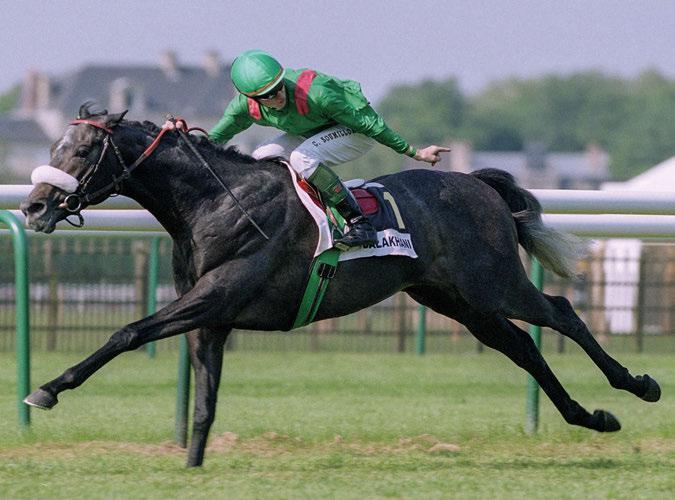
crop threw the Irish Oaks heroine Moonstone and St Leger hero Conduit.
The fact Dalakhani spent his final season covering at €15,000 tells a story; it didn’t always help that his progeny often benefitted from time and middledistances. But he was capable of also imparting plenty of class, as illustrated by a stud record that includes 55 stakes winners, among them ten at the top level.
As such, Dalakhani is now a key cog in the fight for the Darshaan sire line to retain its relevance. As with others before it, the line is steadily being squeezed out, although there remains a small pool of British and Irish-based representatives led by Mark Of Esteem’s Derby-winning son Sir Percy, a very capable yet affordable resident of Lanwades Stud in Newmarket, and 24-year-old Olden Times, virtually a private stallion nowadays for Prince Faisal who sprang to prominence earlier in the year as sire of Feilden Stakes winner and 2,000 Guineas fourth Eydon.
As for Dalakhani, his legacy as a sire of sires rests on the Prix du Jockey Club winner Reliable Man, who stands for €6,500 at Gestut Röttgen in Germany, and Solario Stakes winner Fantastic Moon, who stands for €1,000 at Haras du Taillis in France.
Reliable Man is a capable stallion in both hemispheres as the sire of 19 stakes winners headed by the Australian Group 1 scorers Inspirational Girl, Miami Bound and Miss Sentimental. However, as with Sir Percy (himself the sire of two Group 1 winners), time is running out for him to produce a legitimate sire son – and even then it is doubtful whether one such horse would be given a fair crack of the whip by the market.
On the other hand, Dalakhani has become a broodmare sire of note, as underlined by results from the current season.
In doing so, he is following the example set by Darshaan and his damsire Miswaki, while he obviously benefitted, particularly in his early seasons, from books of high-performing and well-connected mares.
Nevertheless, he deserves credit for a broodmare sire record that to date consists of 50 stakes winners led by champion two-year-old Pinatubo, by Shamardal, top Japanese sprinter Tower Of London, by Raven’s Pass, and American Grade 1 winner Shantisara, by Coulsty. Other high-profile runners include Royal Lodge Stakes winner Royal Patronage (by Wootton Bassett), Dante Stakes winner Thunderous (by Night Of Thunder) and Derby runner-up US Army
Ranger (by Galileo), one of five stakes runners out of Moonstone alongside Nelson (by Frankel), Nevis (by Dansili), Stubbs (by Danehill Dancer) and Words (by Dansili).
Indeed, so far this season he has featured as the damsire of six stakes winners in Europe, who between them have won over £2 million in earnings, enough to place him within the top 20 European broodmare sires.
The stakes-winning sextet are a varied group, ranging from the Group-winning juvenile fillies Meditate (by No Nay Never) and Lakota Sioux (by Sioux Nation) to the Group 3-winning colt Checkandchallenge (by Fast Company) and accomplished sprinter Double Or Bubble (by Exceed And Excel). The latter was bred by Deerfield Farm out of Mango Lady, also dam of another quick Group 3 winner to Exceed And Excel in Mix And Mingle.
Daddy as a grandsire and, as fast, hardy two-year-olds who were plying their trade early this year, have already demonstrated the attributes for which the sire line has become admired.
Meditate hails from the first €100,000 crop of Coolmore’s No Nay Never, bred in the aftermath of an excellent first group of two-year-olds that included the Middle Park Stakes winner Ten Sovereigns. Confidence has been riding high in the horse, himself an excellent two-year-old who won the Prix Morny, within his home camp since and so far it appears to be well placed, with his current crop of juveniles also highlighted by the Phoenix Stakes winner Little Big Bear, Prix Morny hero Blackbeard and Group 2 winner Aesop’s Fables alongside Meditate.
As for Lakota Sioux, she sits alongside Prix Six Perfections winner Sydneyarms Chelsea as one of two Group 3 winners from the first crop of Coolmore’s Phoenix Stakes winner Sioux Nation. At an opening fee of €12,500 (which has since been dropped to €10,000), Sioux Nation has been an affordable Scat Daddy option from the outset and as such hasn’t lacked for ammunition. Even so, he is making the most of those opportunities, as a group of six stakes performers and a tally of over 30 winners illustrates.
It doesn’t take too much imagination to envisage Meditate, bred by Lynch Bages and Rhinestone Bloodstock out of Pembina, becoming the next Group 1 winner out of a Dalakhani mare.
Having swept the Albany Stakes at Royal Ascot and Debutante Stakes at the Curragh for Aidan O’Brien, she most recently ran a fine second to Tahiyra in the Moyglare Stud Stakes to consolidate her place within the top rank of her generation.
Lakota Sioux didn’t fare quite so well in the Moyglare, fading out of the picture after racing prominently, but prior to that she had looked progressive and high-class when landing the Sweet Solera Stakes at Newmarket.
Bred by Fethard Bloodstock out of the Aga Khan-bred Group 3 winner Shemiyla, she is a half-sister to the Group 1-placed Sheraz and on those connections alone was very well bought by her trainers Mark and Charlie Johnston for £15,000 at last year’s Tattersalls Ireland September Yearling Sale.
Meditate and Lakota Sioux share Scat
Coolmore’s association with the sire line stretches back to the days of Storm Bird via his grandson Hennessy, who left behind the brilliant Ballydoyle two-yearold Johannesburg. However, it is off the back of the success of Johannesburg’s Grade 1-winning son Scat Daddy that it has accelerated its involvement, which has also included investing in the American Triple Crown hero Justify to stand at its Kentucky arm, Ashford Stud.
Justify has an army of almost 140 first-crop two-year-olds, most of them extremely well connected, as befits his opening fee of $150,000. Unsurprisingly, he was the subject of plenty of hype, but in return he has been quick to satisfy expectations to the extent that he currently reigns as North America’s leading first-crop sire, his tally of winners buoyed by the presence of Saratoga Grade 3 winner Just Cindy amid an array of smart-looking debut winners at some of the big American tracks.
Yet Justify has also been quick to make his presence felt in Europe thanks to the Group 3-winning fillies Statuette and Aspen Grove, both of whom appeal as legitimate Classic candidates for 2023. Needless to say, the ability to throw high-class performers on both turf and dirt is going to stand him in extremely good stead going forward.
“Dalakhani is following the example set by Darshaan and Miswaki”
Noprizes for guessing that the great Coolmore sire Galileo is well on his way to yet another leading European broodmare sire title, or for that matter that his closest rival and sometime collaborator Pivotal is a clear-cut second on the list. But there are some younger sires beginning to emerge as worthy successors in Europe and among those born this century there are plenty of exciting new names to conjure with.
Oasis Dream is one potential future champion broodmare sire and among this younger cohort the top-class sprinting son of Green Desert has a solid lead by the number of stakes winners produced by his daughters this year. As the Banstead Manor Stud stallion hurtles towards his first 100 stakes winners as a broodmare sire – he’s currently on 83 – his daughters can already boast such fine racehorses as Sir Dragonet (by Camelot), Twilight Payment (by Teofilo) and Siskin (by First Defence), not to mention leading firstseason sire Sioux Nation.
This season has also witnessed the emergence of the upwardly mobile Grade 1 winner Nations Pride, another son of Teofilo, and Richard Hannon’s Chindit (by Wootton Bassett), who is enjoying a fine four-year-old season thanks to his victory in the Summer Mile, while Quickthorn (by Nathaniel) and Iresine (by Manduro) have both also won at Group 2 level.
The youngest broodmare sire making waves in Europe this year is Sea The Stars, with nine stakes winners on the board, including two Group 1 winners. The French colt Onesto (by Frankel) opened Sea The Stars’ Group 1 account as a broodmare sire with his victory in the Grand Prix de Paris. Funnily enough, Onesto had Sea The Stars’ second winner at the highest level behind him in fourth that day. Since then Eldar Eldarov (by Dubawi) has gone on to Classic glory in the St Leger, while Onesto, for good measure, franked the Grand Prix de Paris form with his second to Luxembourg in the Irish Champion Stakes.
Sea The Stars’ excellent broodmare daughter My Titania provided two more 2022 stakes winners in Iffraaj’s smart son My Prospero, a Group 2 winner in France, plus the Dubawi gelding My Oberon, who scored at Listed level. Although it is very early days as a broodmare sire, the
born later than 1999)
Name Born Sire
OASIS DREAM
DUBAWI
SEA THE STARS
SHAMARDAL
TEOFILO
NEW APPROACH
DALAKHANI
DUKE OF MARMALADE
FASTNET
Gilltown Stud stallion has a pretty healthy 6.5% stakes winners to runners so far, which places him firmly among the elite broodmare sires.
Daughters of the late Kildangan stallion Shamardal continue to produce stakes winners at the very efficient top-class rate of 6.9% to runners and his nine in Europe this year are headed by the recent Canadian Group 1 Summer Stakes hero Mysterious Night – a full-brother to Dark Angel’s dual Grade 1 heroine Althiqa – plus a couple of Group 2 winners in Lilac Road (by Mastercraftsman) and Showcasing’s Lowther Stakes winner Swingalong.
Fellow Kildangan sire Teofilo is also having a fantastic year with his broodmare daughters. He was responsible for three major winners at this year’s Guineas meeting, providing both the Guineas winners Coroebus (by Dubawi) and Cachet (by Aclaim), plus Lope De Vega’s Dahlia Stakes heroine Dreamloper, who has since completed a Group 1 double at Longchamp in the Prix d’Ispahan and Prix du Moulin.
Yet another Darley stallion, New Approach, is next on our table with seven stakes winners of 2022. His poster boy is Dubawi’s Classic-winning son Modern Games, who recently added the Group 1 Woodbine Mile to his earlier success in the Poule d’Essai des Poulains. In between, the fast juvenile filly Mawj (by Exceed And Excel) took the Duchess of Cambridge
Stakes, while Jim Bolger’s Boundless Ocean, by Teofilo, is a dual Group 3 scorer.
Another Exceed And Excel filly, Double Or Bubble, is one of the Group winners among Dalakhani’s list of 2022 stakes scorers as a broodmare sire, but pride of place among the group must go to triple Group scorer Meditate (by No Nay Never), who won the Albany Stakes at Royal Ascot and Debutante Stakes at the Curragh before coming up against the brilliant Tahiyra in the Moyglare Stud Stakes. Dalakhani’s other Group winners this term are Checkandchallenge (by Fast Company), Lope De Vega’s Group 3 John Porter winner Max Vega, plus juvenile filly Lakota Sioux, a daughter of the prolific first-season sire Sioux Nation.
Quite where this group of young broodmare sires will be in ten years’ time is not certain, but rest assured that it is the broodmare sire whose daughters most complement the elite sires of the day that will thrive. The fact that Sea The Stars’ first two Group 1 winners are by Frankel and Dubawi may be very significant.
Remarkably, the Frankel/Sea The Stars cross, which creates 3x3 inbreeding to the Arc heroine Urban Sea, has already produced two Group winners from just 12 runners. And, of course, we are all aware of the strong affinity between Dubawi and Sea The Stars’ half-brother Galileo. No wonder the Gilltown Stud stallion is off to such a fast start.
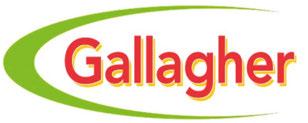
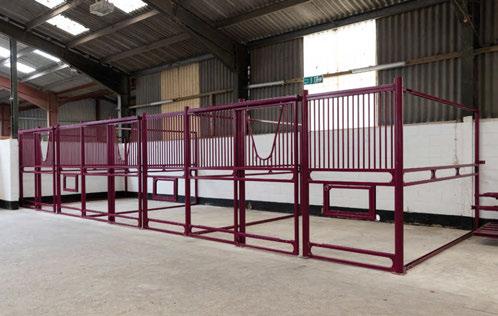
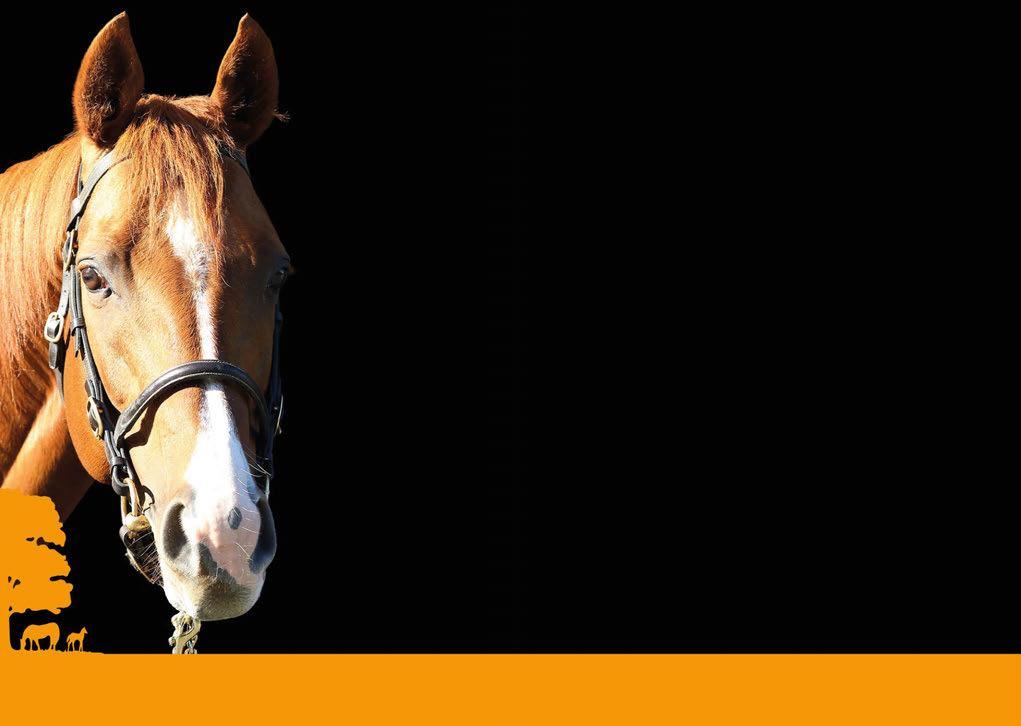
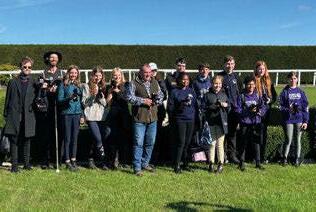
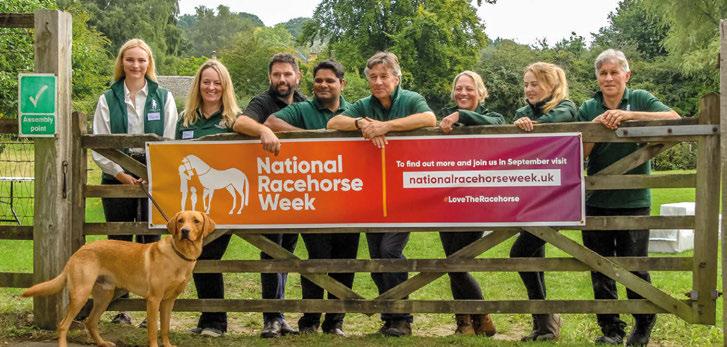
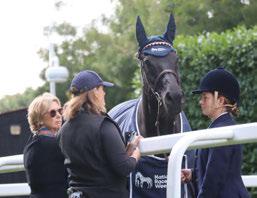
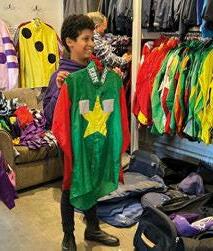
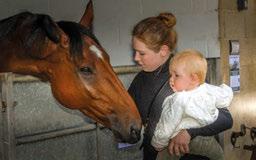
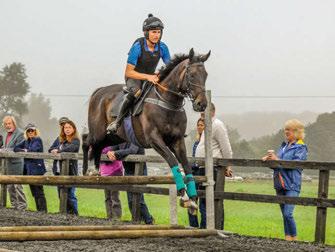
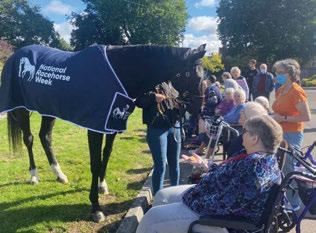
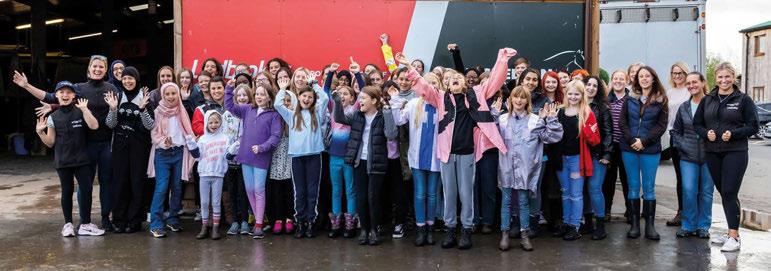
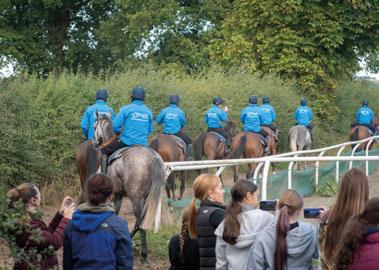
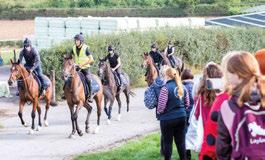
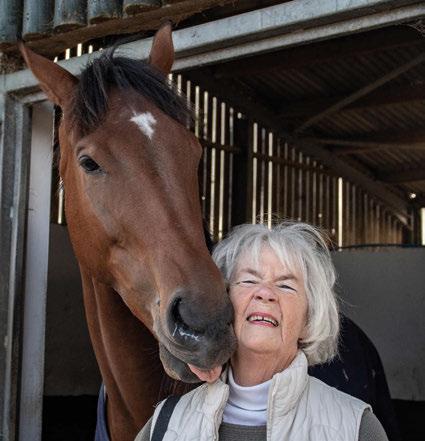
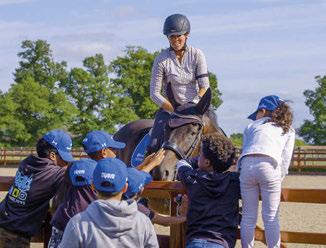
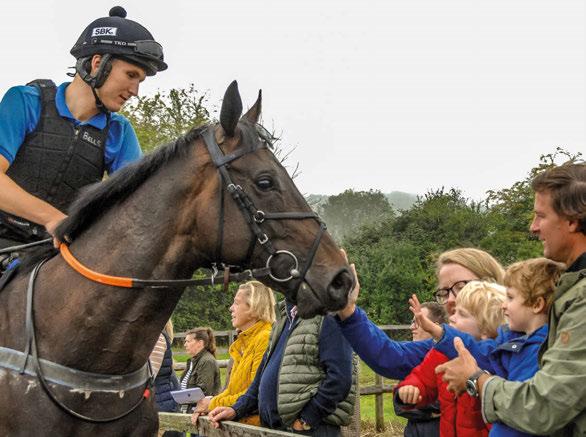
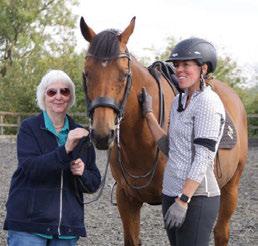
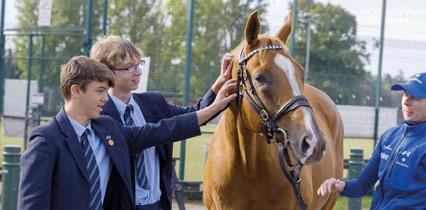
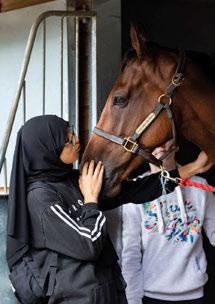
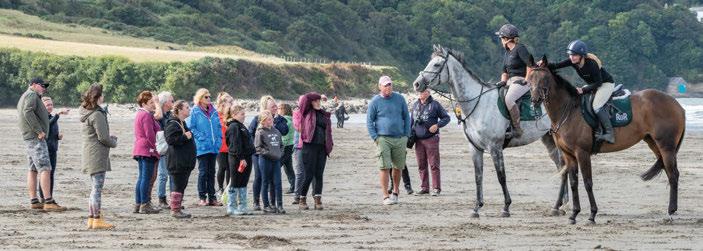



During 11-18th September more than 10,000 places were made available for the public to come behind the scenes and experience first-hand the incredible levels of equine care and welfare in racing. Training yards, studs, and retraining and rehoming centres opened their doors with 138 open days taking place across the country along with 15 community events and 11 school visits.
National Racehorse Week forms a core part of racing’s five-year welfare strategy ‘A Life Well Lived’. “It’s so important that racing throws open its doors to welcome people behind the scenes. Racing can talk about the levels of care racehorses receive every day, but it’s experiencing this personally that truly makes the difference. With National Racehorse Week we have the platform to unite as an industry to allow thousands of people to see the realities of daily life on a yard, to ask questions and to feel better informed about our sport.”



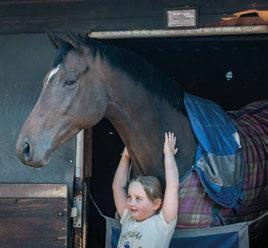
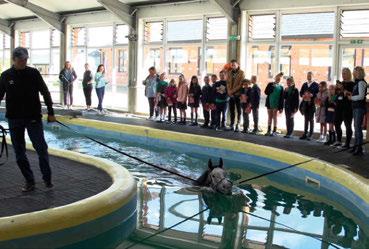
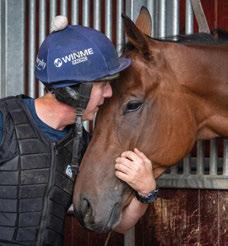
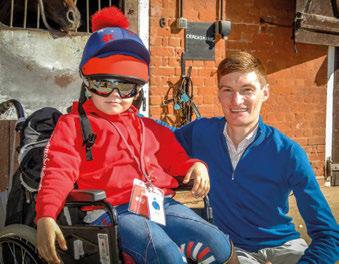
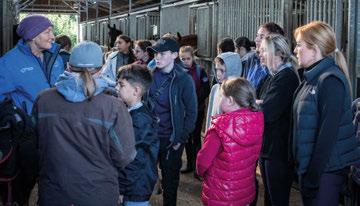


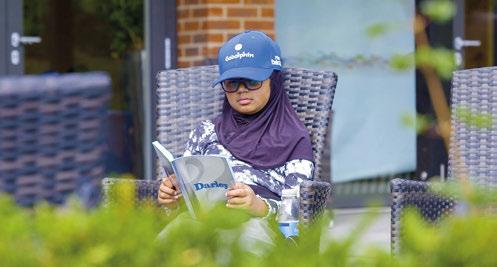


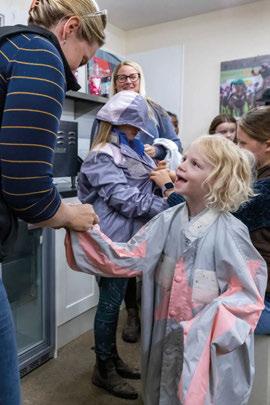
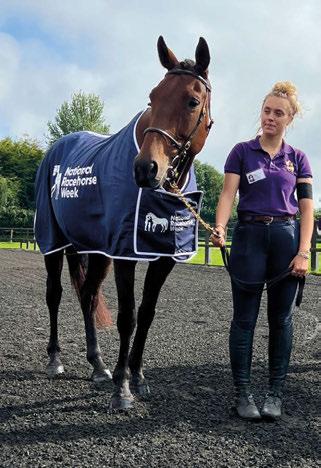

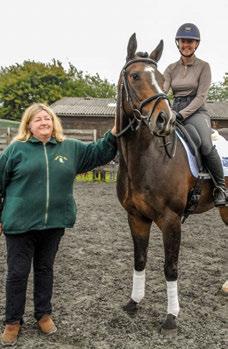
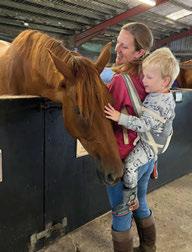 Barry Johnson, Chair of the Horse Welfare Board.
Barry Johnson, Chair of the Horse Welfare Board.

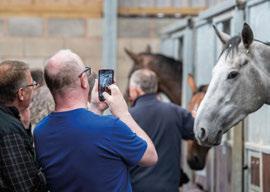

The 78th Annual General Meeting of the ROA was held on Thursday, September 15 with all five resolutions approved by its members. The resolutions included the nomination to the Board of President Charlie Parker and Vice President Alan Spence as well as the co-option of Khalid Almudhaf, Ken McGarrity and Chris Wright CBE. Chief Executive Charlie Liverton was also co-opted to the Board.
The AGM also marked further improvements to the ROA’s corporate governance, which the members ratified in 2021. The ROA’s transition to a skillsbased Board continues with the approval of the election of Tom Goff, Mark Albon and Charles Walker.
After the event, Charlie Parker remarked: “The AGM shared with our members that the ROA continues to deliver steady progress against a challenging backdrop, both at a macroeconomic and industry level.
“At an industry level the ROA remains at the forefront of the big conversations with our stakeholder partners. As a stakeholder our role is to ensure owners’ voices are at the heart of discussions and that our needs and requirements as owners help shape the agenda and are
reflected in the wider industry’s strategy planning.
“I recognise that British racing is in desperate need of a strategic plan, which will help address key issues, including governance, structure, industry strategy, race programming and distribution of prize money. Whilst we are at a crossroads, I am hopeful that we can make progress across the industry over the coming months”.
Charles Walker brings over 30 years’ experience as a racehorse owner across both codes. Mr Walker spent 25 years as a chartered financial planner and financier and brings an impressive skill set relating to financial planning, modelling and project management.

He said: “There have always been critical times for the racing industry and owners, but this really does feel a particularly pivotal time. The pressures on all sides of the industry are enormous and, whilst they may not get any easier any time soon, I will use my position as your representative to try and be a catalyst for the changes that are desperately needed to ensure owners’ views are heard.”
Mark Albon is a retired oil and gas
The Racehorse Ownership Days series, designed to promote shared ownership and provide practical guidance to racegoers on how to get involved, has visited five racecourses so far in 2022, kicking off at Newbury in April and covering the length and breadth of the UK with events at York, Perth, Haydock Park and Windsor.
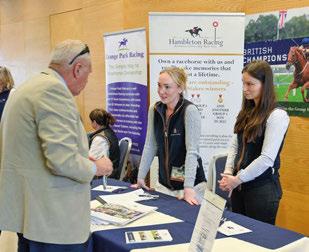
A 2021 survey created by Great British Racing and completed by over 3,700 racing fans found that 65% of those not currently involved in shared ownership would be interested in pursuing it within the next 18 months. For both seasoned racing fans or relative newcomers to the sport, the series of racecourse events has been designed to engage with racing fans at racecourses to showcase
Two meetings remain in the 2022 series
shared racehorse ownership and the affordable gateway into ownership that syndicates and racings clubs can provide.
Syndicates and clubs have been on hand to discuss an alternative
trading manager and has been an ROA member for close to ten years. He has both Flat and National Hunt horses in training and is passionate about all matters impacting owners and the raceday experience.
He said: “I look forward to joining the Board of the ROA, representing owners and challenging the decisions being made on the key issues. I will do my best to push through ideas for improving the raceday experience for all and ensuring that owners’ voices are at the forefront of industry discussions, with a particular focus on reviewing costs and owner expenses.”
avenue into racehorse ownership and a parade of horses with shares available takes place ahead of racing, allowing racegoers to buy shares on the day or simply learn about the process of purchasing shares in a racehorse. Ownership Day host and presenter, Frankie Foster, introduces a series of talks alongside a panel of syndicate managers, trainers and racing personalities, all sharing their ownership stories.
Two meetings remain in the 2022 Ownership Day series, with double headers at Cheltenham (October 21 and 22) and Ascot (November 18 and 19).
For more information, or if you are a syndicate and would like to take part in the next Racehorse Ownership Day, visit the In The Paddock website at inthepaddock.co.uk.
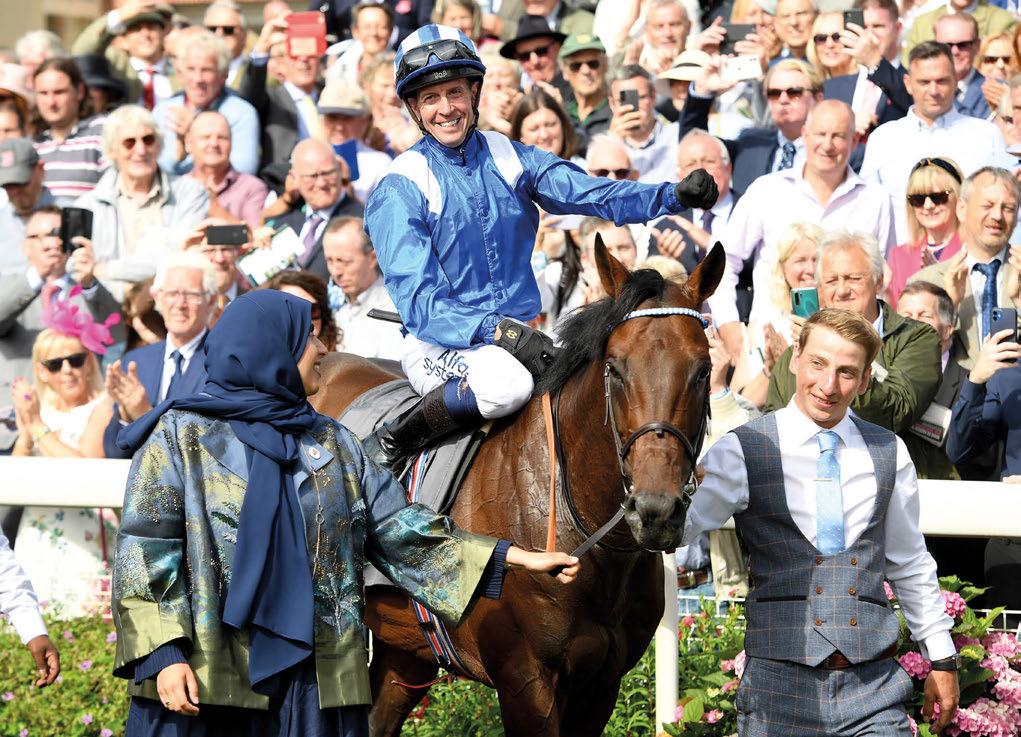
Since its inception in 2011, British Champions Day has been graced by some of the sport’s most recent superstars and played host to some truly memorable finishes. This year looks set to be no different with superstar Baaeed earmarked for a farewell appearance in the QIPCO Champion Stakes at the meeting on Saturday, October 15.
The ROA is once again offering members the chance to book a
discounted hospitality package in a superbly situated private box on the third floor of the grandstand. Located directly opposite the winning post, the box offers members a spectacular view of all the action at Ascot.
The bespoke package includes:
• King Edward VII enclosure admission badge and racecard
• One car-park label per two places booked
Whilst some activities were cancelled as a mark of respect following the death of Her Majesty The Queen on September 8, National Racehorse Week was still a great success with many visitors, going behind the scenes to learn about the life of the thoroughbred.
A number of open days still went ahead, giving attendees the opportunity to see first hand the care horses receive in the sport and to meet and talk to the staff who look after them
365 days of the year.
• Three-course buffet lunch
• Afternoon tea
• Complimentary drinks including champagne reception, house wines, beer and soft drinks, served throughout the afternoon
The price for this bespoke package is £375 (+VAT) per person. There is a limited number of tickets available, so please call the ROA office on 01183 385680 to avoid disappointment.
Many of the events not only celebrated the sport’s racehorses but allow visitors to reflect on the remarkable contribution Her Majesty made to racing, as well as her love of the sport and the thoroughbred.
The ROA team were also on hand at a number of venues to answer questions for guests on all ownership and membership queries.
Someonewriting a book about their first proper year of owning racehorses would ideally want plenty of positives to focus on, but while Mike Madden certainly does have that, his experiences allow for a realistic portrayal.
Via Star Of Lady M – four wins from nine runs, including the Hilary Needler, and nearly £50,000 in prize-money, and Emerald Duchess – one placing from six runs and a grand in earnings at the time of writing – he has good and contrasting material.
Not that his interest in racing is new, far from it.
“I can date my first involvement with racing back to the day of Red Rum’s first Grand National, when my dad left me on the pavement outside the turf accountant’s shop,” he says. “I didn’t even know what a turf accountant was, and back then it was a grey frontage with no way of seeing inside.
“After watching that race I became hooked, but more so on Flat racing with heroes such as Lester Piggott and Steve Cauthen. I remember watching one of my favourite horses Shergar while stood outside a television rental shop. Even the bookies had to rely on audio commentary only.”
Recalling his first ownership steps, he says: “My wife Sally and myself owned bits of racehorses in racing clubs and syndicates but they were never very good, and they ran all over the country. It was never straightforward getting badges for a runner at your local track.
“Then, meeting friends at York, including Simon Chappell, I was introduced to Luke Lillingston and Ted Voute as we started an online business.
“My own business had a good couple of years and so we decided to splash out. I couldn’t have done it without Luke, he is such a knowledgeable person. He pointed us in the direction of the Book 3 sale, and we spent a couple of days plotting our way around Tattersalls.
“He was studying the horses, but I think I was studying him more, trying to see what he was seeing, but I must confess it was beyond me.”
That was October 15 last year, and Madden continues: “It was late on the
Mike and Sally Madden at Royal Ascot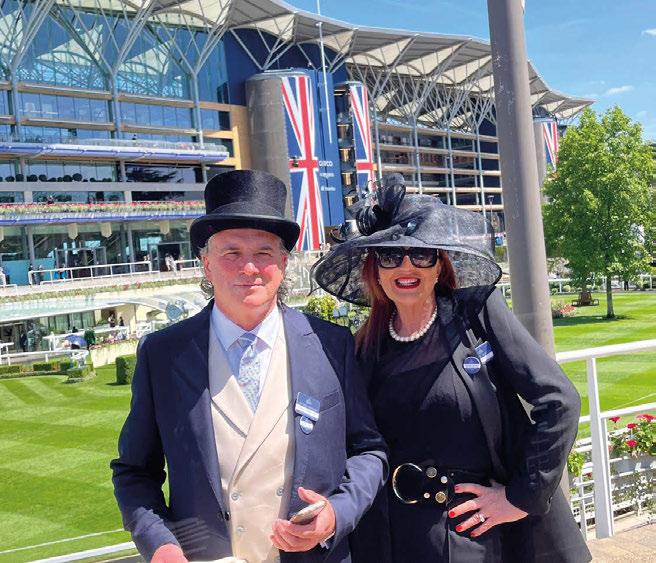
Friday afternoon and prices were still high. We had four horses left on our list, and the first was a gorgeous Havana Grey filly. Bidding started quickly but we got her for 15,000gns, a full five thousand under our budget. It was quite emotional. We were in the bar celebrating the purchase of our first racehorse and we could see the other lots on the TV.
“The second of our final four, a Massaat filly, went for 35,000gns, then our third, by Cityscape, went for 22,000gns. Luke was very interested in the Massaats so he went into the ring to see who was bidding on our fourth and final choice, another Massaat filly.
“He rushed back up and said it had gone for 20,000gns, and if we wanted to get involved we could have 75% of her for 15,000gns, the other 25% being split between trainer Tim Easterby and breeder Richard Kent.
“I had a few friends who were interested, so over the weekend we put together the 1891 Group. We thought
that if the trainer and the breeder wanted to keep a part of her, she must be a good filly!”
A privilege of sole ownership, or being the prime mover, is naming the horses, and on this he says: “Star Of Lady M is out of Abraj Dubai. Abraj means constellation in Arabic, which is where Star came from, and Sally has always been referred to by her friends as Lady Madden, or Lady M for short.
“Emerald Duchess is out of Caledonia Duchess, and as we are from Derbyshire we were going to name her Derbyshire Duchess, until we discovered that the original Derbyshire Duchess was a lady of ill repute! So, she got Emerald Duchess because of our colours.
“Emerald Duchess has been a little disappointing, running six times without success, but her most recent run when third at Leicester was her best and we were delighted with that.
“Star Of Lady M has been unbelievable. She’s won four times, taken us to Glorious Goodwood, where she finished third, and Royal Ascot, and got us Listed black-type at Ripon. She
picked up a little injury there and won’t race again this season.”
Emerald Duchess is in the right hands to come good, being with Easterby, while Star Of Lady M is with David O’Meara.
Madden says: “We considered all sorts of trainers. Our favourite racecourse is York, and so when we were heading there for the 2021 music showcase, we called at David’s Willow Farm.
“The magnificent surroundings took our breath away, and after meeting David and his team we did not need to look elsewhere. We now get messages from his mum whenever Star Of Lady M runs, which is just typical of the familytype atmosphere with David’s outfit.
“Tim’s is another real family outfit. He’s always got time for us and we have spent plenty of time with him chatting about horses, family and anything else.
“At Goodwood he joined us in the owners’ pavilion for half of the afternoon, and after racing at York he and Sarah, and son Thomas, chatted about Emerald Duchess and what we might do with her. We’ve also met their son Will several times, and we have challenged him to a cricket match.
“Tim was there when Star Of Lady M won on debut at Redcar, when she finished third at Goodwood and then Ripon when she got black type, and I think tongue in cheek he’s feeling the pressure with Emerald Duchess!”
That debut victory provided her owner with an instant magical moment, and asked about his highlights so far, Madden replies: “Star Of Lady M winning on debut at Redcar will be hard to beat. We did not know what to expect, and we did not really expect her to run that early in the season. She beat the odds-on favourite comfortably in the end, and we were so overjoyed we went to the wrong place! It was Tim Easterby who told us we should be in the winner’s enclosure.
“Winning the Hilary Needler in quite dramatic fashion was another great day, and the warmth of the people at Beverley was unforgettable. Not just the officials, the racegoers too. Everyone
was so pleased we had won their race.
“Royal Ascot was a real bucket list moment, and arriving by helicopter may seem extravagant, but the prize and bonus money she had collected convinced us that was the way to go. It was a memorable experience for our kids too, and one they will never forget. Our daughter Gabriella had never been racing before, whilst our boys Ole and Zac had only ever been to Galway in October and Southwell in December!”
He adds: “Goodwood was one of my highlights, and finishing third was an achievement, but black-type at Ripon was a huge event. It’s interesting because it wasn’t long ago that I would
this as I go along, currently at around 50,000 words.
“It will hopefully be finished some time around the October sales, which would be fitting, as in many respects that is where it all began. I decided to do it to combine my loves of racing and writing, and neither were done with the intention of making any money.
“I’ve loved every minute of the racing year, and every minute of the writing, so I thought it would be good to give something back. Most people are aware of the Injured Jockeys Fund, and they do a great job, but I am also interested in Retraining of Racehorses, so hopefully we can make some money for them too.
“Interestingly, when I discussed the idea with Richard Kent, he thought I should include a glossary of terms, as people new to the sport can often get confused, even bamboozled, by some of the terminology, for instance black-type. He’s right, so that has been added too.”
not have known the significance of black-type, and when we celebrated it many of our friends wondered what black-type actually meant.”
Which brings us neatly on to Madden’s book, containing as it does a guide to racing’s unique language, while profits will go to two of the sport’s worthiest causes.
He says: “I have always loved writing and have had one book professionally published by Music Mentor. That was a biography of the rock and roll singer Mike Sanchez, and I interviewed Bill Wyman, Andy Fairweather Low, Jeff Beck and several other superstars. Robert Plant wrote the foreword.
“This book details our first year of racehorse ownership, as well as a little bit of our history too. I get very nervous before races, and hopefully that comes across; it’s not all a bed of roses! It is a very different experience going to the races as an owner compared to a regular racegoer. I have been chronicling
Added to Star Of Lady M’s haul has been £50,000 worth of GBB scheme money, though Madden observes: “That’s great, but on October 1 there is a sales race at Newmarket worth £150,000, with an £81,000 first prize. It is also a GBB race. Does that type of race really require a bonus, or would that be better used elsewhere?”
It seems a fair question, and from someone whose professional life has revolved around finding solutions.
“I have spent my entire career in IT, mainly as a computer programmer,” says Madden. “But in recent years I’ve created a business in helping large companies with legacy system modernisations. It has been great travelling the world and seeing the same old systems running almost everywhere. Just before lockdown I was in Kiev one week and Sao Paulo the next.”
Covid-19 has in some ways made the world a smaller place again. While swapping Kiev and Sao Paulo for Redcar and Beverley might not have been the dream two or three years ago, it has been enjoyable and full of incident and new experiences. Indeed, you could write a book about it.
“Star Of Lady M winning on debut at Redcar will be hard to beat”
With the October HIT sales taking place at the end of this month, whether you are new to ownership or a racing veteran, the ROA VAT Solution guide can help in reclaiming VAT under the registration scheme for racehorse owners (VAT Notice 700/67).
To register under the scheme, or to reclaim the purchase price VAT under your existing VAT registration number, the following conditions must be met:
• Ownership – you will need to own a minimum 50% share in the racehorse
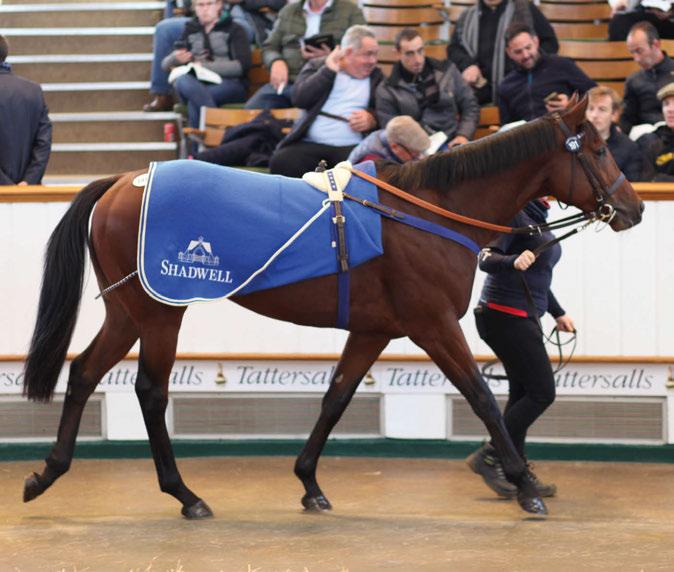
• Training – the racehorse must be in training with a UK-based registered horse trainer
• Sponsorship – must be in place. ROA members can take advantage of the Tote Sponsorship Scheme. For further information please contact Sarah Holton on info@roa.co.uk Owners can apply for a new VAT registration number as the following entities:
To apply for a sole VAT registration, you will need to fulfil the criteria set out in the scheme. Sole owners who charge for their services should be aware that once they become VAT registered, VAT will be applicable to all their billable goods and services
In addition to meeting the requirements of the scheme, a full list of partners/ syndicate members will need to be included in the application by completing HM Revenue & Customs VAT 2 form.
As well as meeting the conditions of the scheme, racing clubs will need to be clear on whether they intend to operate as a racing club providing benefits for members for subscription according to section 7.3, or as a racing club not providing benefits to members as per 7.4 of the registration scheme for
Perspective purchasers at the yearling sales should be aware that an issue has been uncovered with regards to the administration of primary courses of equine influenza vaccinations.
A primary course of the vaccine that started in 2021 should have been administered V3 in line with the old intervals (150-215 days after V2). However, some horses (including the foal crop of 2021) have been administered V3 in line with the new intervals (120-180 days after V2). A V3 administered between 120149 days is therefore an ‘early V3.
The BHA have made an exemption for ‘early V3s’ (i.e. they have been approved). However, the IHRB have not made such exemption for “early V3s”. Any horse with an ‘early V3’ would not be permitted to race in Ireland.
Owners who are buying at the upcoming sales should be aware of this if they are planning to run any prospective purchases in Ireland.
Full details of the vaccination procedure from the British Horseracing Authority, Irish Horseracing Regulatory Board and France Galop can be found at www.roa.co.uk/flu2022.
The difference between s.7.3 & 7.4 will determine whether subscription income is liable to VAT.
Following HM Revenue & Customs switch to Making Tax Digital and the new VAT Registrations Beta system, the ROA VAT Solution is on hand to take the hassle out of VAT applications, compilation, and submission, so that you can continue to focus on the sport you love.
For further information, or to talk to our dedicated VAT team, please contact us on vat@roa.co.uk or call 01183 385 685 to speak with Davina or Glen.
Barefoot Angel ran out an impressive winner of the Listed Firth of Clyde Stakes on Ayr Gold Cup Day. Owned by members Helen and Norman Steel, the filly is sponsored by the ROA and Tote Owner Sponsorship scheme.
The Owner Sponsorship scheme has proven invaluable to many members and enables owners to register as a business for VAT purposes. Owners can then reclaim VAT on their racing activities as well as on the price of their horse. To find out more on the ROA/Tote Owner Sponsorship scheme visit roa.co.uk/sponsorship.
All the roles and responsibilities undertaken by Retraining of Racehorses (RoR) are welfare focussed. There are the public facing activities, such as the competitions and series that fuel demand for former racehorses and the educational programmes that help riders and their horses fulfil their potential, and then away from the public eye there is the vital work the charity does protecting the welfare of former racehorses.
Ever since it was established in 2000, RoR has operated a safety net to provide for any former racehorse in need of charitable support. Today that support is provided via the Vulnerable Horse Scheme (VHS).
Working in conjunction with both its charitable partners and wellequipped private operations, RoR’s Vulnerable Horse Scheme identifies horses in need of support and places them in the care of experts, monitoring their every step en route to rehoming.
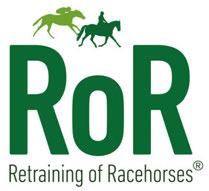
One operation that takes in horses is run by Victoria Cartmel at Brightwalton, near Lambourn. Day to day the yard provides holidays and rehab for horses in and out of training.
“Over the past few years, alongside my day job,” Victoria reports, “I have been privileged to take horses into my care for the Vulnerable Horse Scheme. Having been involved in racing for over two decades I have always felt it was important to give these wonderful horses a second chance when they need it most. I find it incredibly rewarding but equally frustrating that they have ended up not always in the best circumstances, for whatever reason.
“My experience of working with RoR’s VHS has been nothing but positive and without this charity it would worry me where these horses might end up. The charity and the people who work within it are incredibly passionate about safeguarding these horses.
“When I first started with the VHS we had a lot of paperwork, but the new Welfare Management System app works really well and makes it very easy to update reports and monitor progress. It also provides photos and vet reports that help me do my job.”
“She was then turned out for a few months.
In October, we started riding her and when it was clear she was remaining sound, she was ready to start her new chapter.
“I find the hardest part is finding the right home for these horses. Once you have spent time addressing their problems and becoming emotionally involved, finding the right person to take over their care is paramount.
“I got in touch with a knowledgeable lady called Zoe Brazin. Luckily for Bridal March, now known as Mable, she was exactly what Zoe was looking for. Since then, Zoe and Mable have started competing in hunter trials with the goal of going eventing at BE 80-90 level next year.
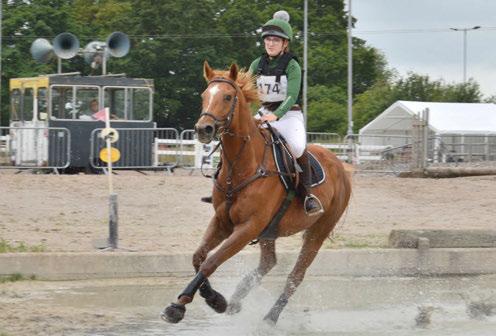
In 2021, the RoR welfare team asked Victoria to take on Bridal March. Her previous owner was struggling to cope with the mare’s intermittent lameness and did not have the finances for the necessary veterinary examinations.
Victoria recalls: “Bridal March arrived in July 2021. Physically she was in good condition, and she loved her food, which always makes the job easier.
“The mare’s intermittent lameness was due to re-occurring abscesses. My farrier came out to assess her and together we made a plan. She was incredibly long in the toe which was causing her to be very uncomfortable, so she was fitted with special shoes and pads.
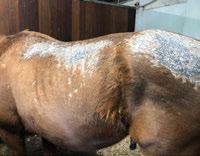
“I get great pleasure in hearing how the horses are getting on; it brings a real sense of achievement. This is down to RoR’s VHS which helps gives these wonderful former athletes a future they deserve.”
It is encouraging to report that the number of horses needing support through the VHS has declined markedly in recent years, from an average of 100 per annum in 2017/18 to around 30 per annum in 2021/22. However, there are still cases that shock and underline the importance of the Vulnerable Horse Scheme.
One such case is that of Mr Emirati. In 2019 his owner’s personal circumstances led to him being handed over to RoR, who in turn placed the gelding in the safe hands of New Beginnings, the charity based at Bishop Wilton, East Yorkshire.
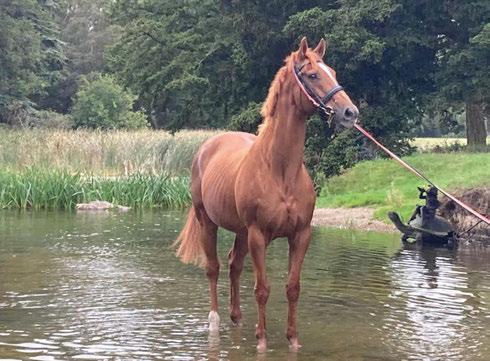
Co-founder of New Beginnings, Kevin Atkinson, picks up the story: “We were asked to take in Mr Emirati (aka Emi) in November 2019. When Emi arrived we placed him in our isolation stable and removed his rug. He was covered in rain scald, the worst we have ever seen, his eyes were glazed and he was thin, he had lost all interest in everything.
“We had to remove all the scabs and keep rinsing him to remove any infection. Emi just stood and let me scrub his body and pick off the scabs, it must have been very uncomfortable, but he never kicked out.
“Eventually, he started to look better. Once his new coat had grown and he had put on some weight, he was ready for reschooling. The next step was to find the right person to take him on loan. He is now with a lady who loves him and pampers to his every need. He does some dressage and enjoys nothing more that hacking out.
“We find that the VHS works well. Everything about the scheme works for and around the welfare of each individual horse and what is the best for that horse moving forward.” n
For more information or to make a donation visit: ror.org.uk
The ROA is once again delighted to be sponsoring the Welsh Horseracing Awards, which will take place on Thursday, November 3.
The awards are designed to recognise both equine and human talent and success across Wales including owners, trainers, horses, jockeys, stable staff and breeders.
The event is being promoted and organised by the management teams from Chepstow, Ffos Las and Bangor racecourses.
A panel of racing professionals, including Mike Cattermole and Richard Johnson, will choose the winners who will be presented with their awards during a ceremony at ICC Wales (International Convention Centre), Celtic Manor. It is a not-for-profit event and any surplus funds from the night will be donated to Racing Welfare.
To qualify for the awards, nominees must live or work in Wales, whilst the qualifying period for the awards is from November 1, 2021 to October 31, 2022.
Tickets cost £75 (+VAT) per person and includes a drinks reception and three-course meal. Any members interested in attending the awards should contact Martin Higgs (mhiggs@ chepstow-racecourse.co.uk)
The ROA Northern Racing Awards will see the Northern racing community – trainers, owners, jockeys and stable staff, as well as other professionals from the racing industry – come together to celebrate the racing successes on and off the racecourse as part of a glittering black-tie event, all while raising money for Racing Welfare.
Taking place on Friday, November 25 at Newcastle racecourse, the event will see 12 awards presented over the course of the evening, showcasing the achievements of racing in Scotland and the North over the course of the year.
Tickets are priced at £95pp (discounts for stable staff are available) and include a drinks reception and a three-course meal. The night is topped off with live music from The Monotones.
For information about attending, sponsoring an award or other
Sam Thomas, pictured with Welsh Grand National hero Iwilldoit, is sure to be in the running for an award
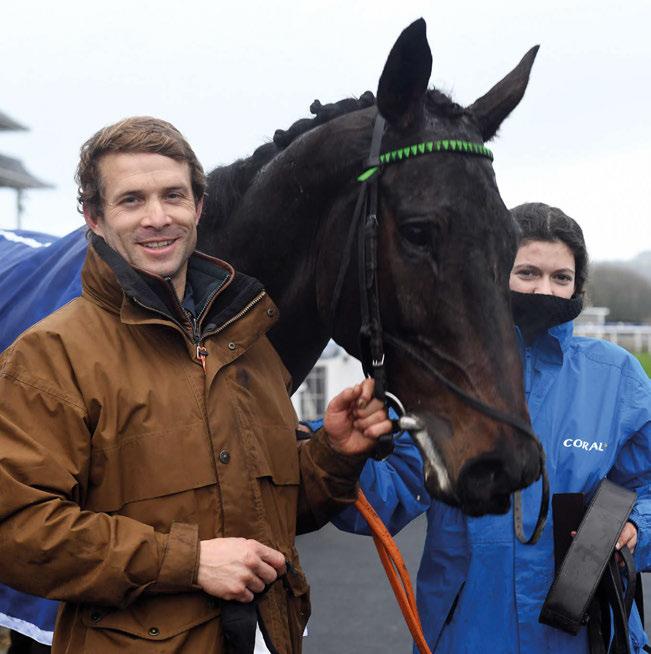
elements of the event please contact Jane Jackson or email jjackson@ racingwelfare.co.uk.
We will once again be celebrating the stellar equine performances of the year at the ROA Horseracing Awards on Thursday, December 8. The evening will be a celebration of ownership and the horses which captured our imagination throughout the year.
October 15
British Champions Day at Ascot –Tote Worldpool day
October 21-22
Cheltenham Discover Shared Ownership Day – see www. inthepaddock.co.uk
November 3
ROA Welsh Horseracing Awards at Celtic Manor
The event marks it’s 40th anniversary this year and there will be a chance to look back on the iconic horses who have won awards since it’s inauguration in 1982, when Ardross was crowned Horse of the Year.
As always, the winners on the evening will be selected by votes from ROA members and the winners will be crowned in a lavish ceremony at the Royal Lancaster Hotel in London.
For ticket prices and further details see roa.co.uk.
November 18-19
Ascot Discover Shared Ownership Day – see www.inthepaddock.co.uk
November 25
ROA Northern Racing Awards at Newcastle racecourse
December 8
ROA Horseracing Awards at the Royal Lancaster Hotel, London


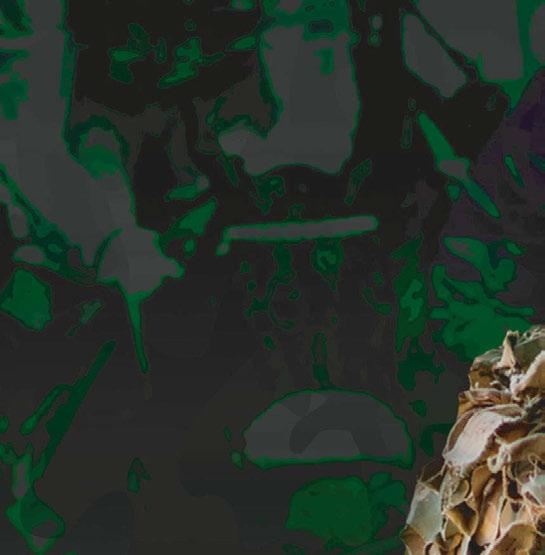

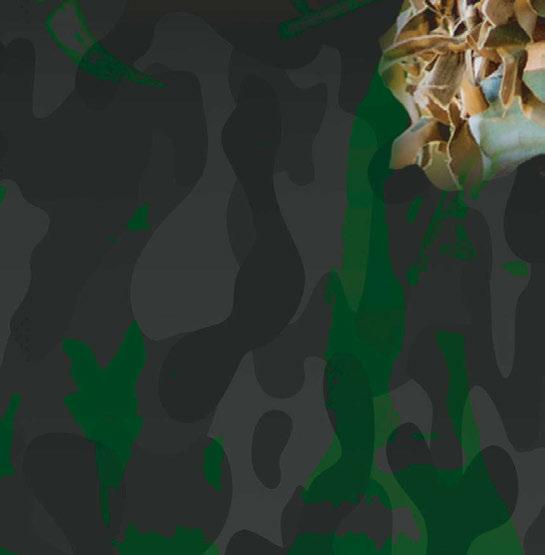




Atribute to Her Majesty Queen Elizabeth II preceded the opening of the TBA’s 105th Annual General Meeting on Wednesday, September 14 at Sandown Park.
TBA Chairman Julian RichmondWatson reflected on the Queen’s outstanding contribution and longstanding support of thoroughbred breeding in Britain, her success as an owner-breeder across the decades, and her longstanding tenure as Patron of the TBA, which commenced in 1954.
Paying respect and giving thanks on behalf of the thoroughbred breeding community, Richmond-Watson said: “Her Majesty was the most ardent supporter of thoroughbred breeding and racing, and we were most fortunate to have such a Patron for such a long period of time.
“Her knowledge and interest ensured the Royal Studs enjoyed considerable success throughout her lifetime, and this along with her outstanding contribution to the industry was acknowledged in 2014 with the presentation of the TBA’s Andrew Devonshire award.”
The meeting’s official matters of business included confirmation of membership fees for 2023, which has been set at a flat fee of £155 per annum - the price differential between full or recurring memberships has been removed.
However, for new members, there is a one-off £45 joining fee.
There were two candidates for the two vacant positions on the Board of trustees and therefore no election was required. Jessica Westwood was appointed as a new trustee whilst Anita Wigan returns to the Board for a second term.
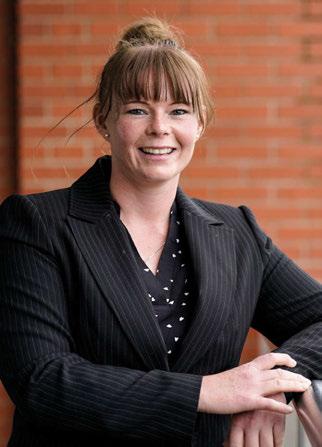
Westwood said: “The TBA is very important to me, it supports my industry and my future, as well as that of my clients, and I hope that by joining the board of trustees I can help encourage the next generation of breeders.”
TBA Trustees also updated members on activities in key areas such as the Thoroughbred Industry Brexit Steering Group, equine health and welfare, education and training, and the Great British Bonus scheme.
In his annual address, the Chairman spoke of the critical importance of British racing’s governance in terms of the wider sector’s long-term future and the need for a strong vision and clear strategy in order to negotiate the sport’s key challenges effectively.
He called on all constituents at the then forthcoming strategy industry workshops to work together for the benefit of the sport, noting the precarious position in which the industry currently finds itself.
Richmond-Watson said: “We are
at a crossroads in British racing and breeding and unless we act now the gradual decline we are currently seeing will accelerate and we will lose our preeminent position in the racing world and with that the interest from the general public and overseas investors.”
Questions from the floor were accepted at the end of the meeting, when trustees were invited to answer questions on their areas of interest. The TBA’s Annual Report was also formally launched and can be viewed at www. thetba.co.uk/about-us/agm.
There were plenty of activities for all ages at Sandown Park

As part of National Racehorse Week, Sandown Park hosted its Breeders’ Day in partnership with the TBA on September 14. The day provided an opportunity for racegoers and breeders to find out about the many options available within the breeding industry.
A range of activities were put on, including competitions, interactive displays and give-aways. These included a points of the horse competition, which drew plenty of interest, as did the guess the Classic winner from the lifesize foal cut-outs, which could be viewed on the lawn by
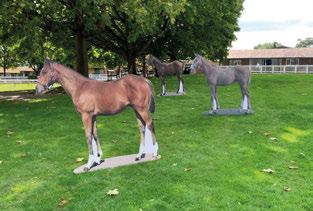
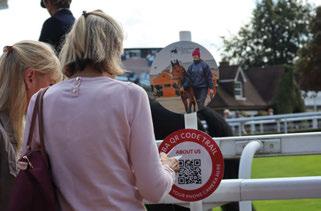
the pre-parade ring.
The event also offered the ideal opportunity for those looking to make a career within the industry. As well as being able to speak with TBA executives, there were trade stands from Careers in Racing, the National Racing College and the National Stud.
The flagship TBA Stud Farming course is due to take place at the British Racing School on December 6-8.
The course, held over three days, covers a range of topics which have been selected to provide a comprehensive overview of general stud management, starting from the very beginning in the selection of mating plans and understanding genetics, to care of the broodmare and foal from conception to the yearling stage, the management of barren and maiden mares, and the managing of stallions and teasers.
Delegates will have the opportunity to get to know each other better over a course dinner, and included as part of the itinerary are visits to a stud farm and veterinary practice for a behind-the-scenes look.
The course fee for 2022 is £420 (incl. VAT) for TBA members, and £540 (incl. VAT) for non-members and includes dinner on the first evening, lunches and refreshments. It does not include accommodation and other meals, which will need to be arranged separately.
A discount is available for group bookings of four or more delegates. The TBA offers a bursary scheme for individuals who require support for educational courses or CPD activities. Visit the TBA website or contact Melissa Rose (melissa. rose@thetba.co.uk) for further information.
Bookings are now being taken and can be made via contacting Alix Jones (01638 661321) or via the events page of the TBA website.
Remembering our Patron, Her Majesty Queen Elizabeth II. An enthusiastic and passionate thoroughbred breeder, who had high-calibre success throughout her reign as monarch, she became the association’s Patron in 1954, the year after her coronation. Breeder and owner of three horses who between them won five Classics, the Queen was at one with the horse, no matter what breed.
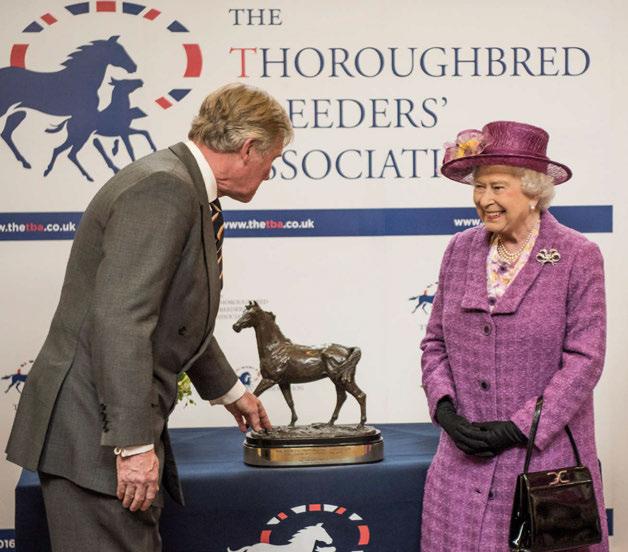
The late Queen is a great loss to both the racing and breeding fraternities, who are indebted to her for her longstanding support and contribution to the industry. Presented with the 2014 Andrew Devonshire award (pictured receiving the award from former Chairman Richard Lancaster), she enjoyed the best year on the racecourse in terms of number of winners as an owner in 2021. A full tribute will run in these pages in next month’s issue.

Stage 1 registrations for 2022-born fillies close at the end of September and full TBA members are given a £200 discount, bringing the cost of registration down to £200 per filly. As soon as a filly is registered and passported by Weatherbys she will be available to be registered to the scheme via www.greatbritishbonus.co.uk.
Late registrations are strictly prohibited. Should you want more information or have an issue, contact Charlotte Newton (info@greatbritishbonus.co.uk).
The TBA recognises the vital importance of screening for the presence of EHV-1, enabling a rapid response to all positive cases, preventing further spread of the disease and providing necessary information and up to date advice.
While EHV-1 is not notifiable by law, we encourage
breeders to inform Stanstead House of all cases of equine abortion or neonatal foal death. This allows monitoring of any disease outbreaks for which immediate action is paramount.
A £200 subsidy towards the cost of a post-mortem is available to members who meet the criteria (full terms can be found on our website www.thetba.co.uk/ veterinary/post-mortem-subsidy).
first came in the Sovereign Stakes at Salisbury and the second was gained at Deauville in the Prix Quincey.
Down under and Emissary, another son of Kingman bred by Juddmonte, won the Listed Heatherlite Stakes at Caulfield.
Meon Valley Stud were in double delight. Checkandchallenge was victorious in the Group 3 Prix Daphnis, while a week later Hoo Ya Mal (Territories), the Derby second, won the Group 3 March Stakes.
The Al Shaqab-bred Al Hakeem was a smart winner of the Group 2 Prix Guillaume d’Ornano, the Haras de Saint Pair-bred Eternal Pearl (Frankel) won the Group 3 Prix Minerve, the Rabbah Bloodstock-bred Perfect News (Frankel) won the Group 3 Ballyogan Stakes at Naas and the St Albans Bloodstock Ltd-bred Silver Knott took top honours in the Group 3 Solario Stakes.
In Britain the principle festival for racing was York during August and British-breds flourished on the Knavesmire.
Kirsten Rausing’s delightful daughter of Frankel, Alpinista, brought up a maiden top-level score on British shores and a fifth successive Group 1 victory in the Yorkshire Oaks.
A day earlier and Shadwell’s homebred Baaeed could not have been more impressive on his first start beyond a mile in the Juddmonte International, zipping clear for a sixand-a-half-length win from Mishriff, whilst fellow Shadwell runner Alflaila grabbed Group 3 honours in the Strensall Stakes.
There was a Group 2 double for Kingman with the Chasemore Studbred Noble Style taking the Gimcrack Stakes in fine style and a day later the Lawn Stud-bred Kinross winning the City of York Stakes.
Under an enterprising ride by Tom Marquand, Quickthorn landed his biggest victory to date in the Group 2 Lonsdale Cup. Lady Blyth’s homebred son of Nathaniel has improved plenty this term and galloped on powerfully for a 14-length victory.
Entering the Listed Galtres Stakes off the back of a debut win at Wolverhampton, Haskoy, by the newly Overbury Stud-based Golden Horn, exited a stakes winner with a narrow score. The three-year-old filly was bred
by Juddmonte Farms.
Juddmonte were also in the winner’s enclosure following the victory of the juvenile Chaldean in the Group 3 Acomb Stakes. However, the son of Frankel was an auction purchase and was bred by Whitsbury Manor Stud.
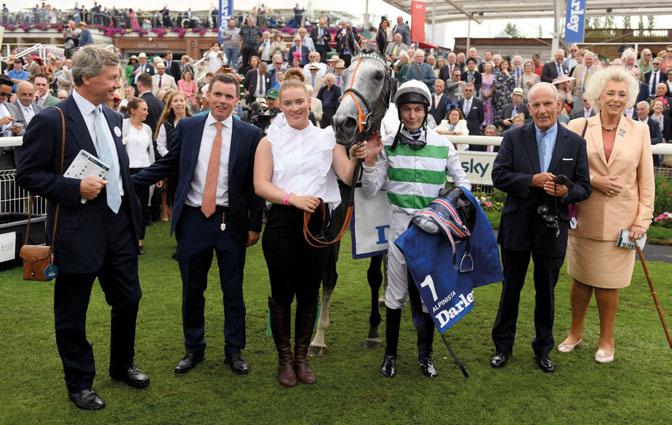
The Hampshire-based operation were represented by four stakes winners during the month. Listed winners completed the four-timer, including a pair by its own first-season sire Havana Grey, whose first runners really have put the Group 1-winning sprinter on the map as a stallion. Cuban Mistress took the St Hugh’s Stakes at Newbury while Shouldvebeenaring won the Two Yrs Old Trophy at Ripon. Older horse Sam Maximus completed the quartet with a win in the Hopeful Stakes at Newmarket.
Making her first start outside of fillies’ only company, Inspiral bounced back from a surprise defeat on her previous start to win the Group 1 Prix Jacques le Marois at Deauville. The following weekend and Richard Kingscote rode a cool race aboard Potapova in the Group 3 Atalanta Stakes, and then the weekend after that, the evergreen Regal Reality scored in the Group 3 Winter Hill Stakes at Windsor’s biggest meeting of the season.
Expertly handled by Archie Watson and ridden by Hollie Doyle, the Juddmonte-bred Tempus (Kingman) gained a pair of Group 3 wins. The
There were a plethora of Listed stakes winners around the globe, which included a pair of juveniles in the shape of the Godolphin homebred Flying Honours in the Stonehenge Stakes at Salisbury and the Trebles Holford Farm Thoroughbreds-bred Mauiewowie in the Curragh Stakes.
In Britain, Rising Star, bred by the Ile Flottante Syndicate, gained a first stakes success in the Dick Hern Stakes at Haydock Park and later in the month Tis Marvellous, a son of Harbour Watch, retained his Beverley Bullet crown.
A progressive sort this term, Tees Spirit (Swiss Spirit), who was bred and is part owned by Ingleby Bloodstock Ltd, gained his first stakes success in the Abergwaun Stakes at Tipperary. The week before and the Mrs B E Moorebred Charterhouse grabbed his first win in black-type company in the Vincent O’Brien Ruby Stakes at Killarney.
Away from European shores and Natural Colour was victorious in the Luther Burbank Handicap, the annual feature of racing at Santa Rosa in California. Bred by the Safiyna Partnership, she became Exceed And Excel’s 200th individual stakes winner. Meanwhile, on the other side of the country, King Vega, who was bred by Fortescue Bloodstock, captured the Buckland Stakes at Colonial Downs.
Having gained his first stakes success in June, the Jane Keir-bred Skyman doubled his stakes tally in the Rowley Mile at Hawkesbury.
Results up to and including August 31. Produced in association with GBRI.
Shona
In August the TBA welcomed Shona Rutherford to the team as Lead Administrator.
Having been involved with horses since childhood, Shona competed in dressage, showjumping and horse trials as a teenager, representing her local pony club on a number of occasions – she still regularly rides her homebred, on whom she formerly competed in dressage. Upon leaving school she completed a BSc in Equine Science at Hartpury College before working at the National Stud upon graduating.
Having worked in the thoroughbred industry for over 20 years, Shona has worked on both public and private studs, including the National, Newsells Park and latterly at Stanley House. She has also worked in the racing office at Moulton Paddocks.
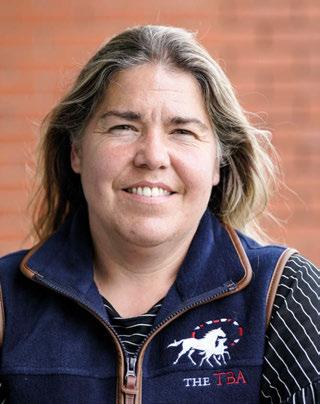
The final regional day of 2022 was held in the south west region and the first port of call was Emma Lavelle’s Bonita Stables, based just outside of Marlborough.
Emma, who proved a hit with those in attendance, explained how the yard, which had been purchased from Peter Makin in 2016, was in need of refurbishment and development, which included an additional stable block, whilst the bottom yard was turned into accommodation for staff, which was necessary due to the rural location.
In total, Bonita Stables houses 70 boxes and it has its own grass gallops, which amounts to 150 acres. The gallops sit high on a hill which overlooks the Barbury Castle Estate. One addition to the facilities since moving in has been the five-furlong all-weather gallop, as well as a furlong round deep sand gallop.
Fourth lot were observed on first the round and then the all-weather and amongst those in the string were the 2019 Ladbrokes Trophy winner De Rasher Counter, as well as a number of promising young horses. Members could also meet and greet multiple Grade 1 winner and stable star Paisley Park.
Emma gave a run through of her training methods and stated that having started out riding dressage,
she works all her horses without the aides of bungees or the like and that each member of staff should know the basics of horse riding.
She highlighted the importance of investing in staff and that, should they want it, riding lessons in the afternoon were available.
Lunch followed at the nearby Bell Inn, Ramsbury, before another short journey to meet Charlie and Tracey Vigors at Hillwood Stud. Having been afforded the luxury of clear skies and warmth in the morning, just as members arrived for the afternoon visit, the rain arrived.
However, the mood was uplifted as Charlie ran through the stud's sales prep process and its consignments for the forthcoming yearling sales, which included a daughter of Havana Gold who subsequently realised 85,000gns at the Tattersalls Somerville Sale.
Members were then shown some of the weaned foals, which included a filly by Lope De Vega out of the speedy Group 3 scorer Kurious, before a delightful afternoon tea and discussion in the kitchen.

Look out for full details of next year’s events in these pages in the new year. The TBA would like to thank each of our regional day hosts for taking the time to organise events for our members this year.
TBA members are reminded that a suite of employment law guidance documents and templates are accessible in the members’ area of the TBA website, with all aspects of the employment law relationship covered from recruitment through to retirement.
Updates were made in August 2022 to the following documents:
13 - Redundancy
14 - Maternity and shared parental leave 15 - Flexible working
16 - Parental rights 19 - Holiday and holiday pay
- Preventing discrimination
Please check that you are using the most recent versions of the guidance and destroy previous copies. All other guidance remains the same.
TBA members have access to legal advice from an employment law expert with industry experience should they need it. Call the TBA office on 01638 661321 for further information or to take advantage of this membership benefit.

Every breeder strives to be number one but to be assigned Lot number 1 in a sales catalogue is not always the best position to be in. There is, however, always an exception, as Jane and Andrew Black, of Chasemore Farm near Cobham in Surrey, found with the colt who became Noble Style, whose success in the Group 2 Al Basti Equiworld Dubai Gimcrack Stakes at York has resulted in the accolade of TBA Breeder of the Month for August.
Looking back to the day the Kingman yearling out of Eartha Kitt awaited the bell to signal the start of Book 1 of the Tattersalls October Sale, Andrew Black says: “I thought he was a pretty nice horse who would definitely make 250,000gns, possibly 300,000gns. I was a little concerned about being the first lot in the book, but it probably doesn’t make that much difference if you have a good horse, and there was at least a chance he could go off on a run if two people were bidding against each other.”
In the event, there were two main bidders, Maktoum family members Sheikh Mohammed and Sheikh Mohammed Obaid, and the hammer fell to the former at 525,000gns.
“To sell a horse to Sheikh Mohammed makes you feel pretty good,” says Black, the co-founder of betting exchange pioneer Betfair. “If they buy a horse from you, it means they take you seriously. I felt appreciated.”
Black’s connection with Noble Style goes back to February 2007 and the very humble surroundings of third place in a five-runner Class 6 three-year-old claiming race at Lingfield.
He recalls: “I’d just started to take racing a bit more seriously, but rather than go straight in and spend a lot of money, I wanted to get involved making decisions on my own, so I started claiming horses. Baldovina was the second.
“I claimed her through trainer Tom Dascombe for 17,000gns. Tom spoke to the jockey [Neil Callan], who shrugged his shoulders and said, ‘That’s what she is,’ but she came from a decent family, as her dam Baldwina was a very good winner over ten furlongs in France and was half-sister to another multiple winner, and she just looked an interesting horse running in the Lingfield race.
“I claimed her to race but she didn’t win, either for Tom or David Pipe, who had her for two races over hurdles, even though both trainers thought she had ability based on what she showed at home. I had a lot of affection for her, and although I put her in the Tattersalls December Sale at the end of her first
season with me, I bought her back for 9,500gns and went ahead with breeding from her.”
That prescient decision was equalled four years later, when Black retained Baldovina’s second foal for 16,000gns at the Tattersalls October Sale. She became Ceiling Kitty, who won three times, including the Queen Mary Stakes in 2012.
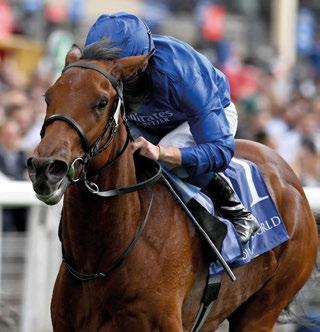
Black picks up the story: “By this time, Baldwina had gone off to Japan and among her produce were One Carat, a million-pound earner, and Jeweler, who won the local 1,000 Guineas, so the Japanese became very interested in the family and we sold most of the other progeny there, including Baldovina’s first foal Van Go Go, but not Ceiling Kitty.
“Ceiling Kitty was one of the bestlooking horses I’ve ever seen, an absolute beauty. I had it in my mind to breed size into her, so I first sent her to Pivotal and got Eartha Kitt. Then she went to Invincible Spirit, which gave us Formidable Kitt, who has produced some interesting types and may yet turn out to be a success. Finally, she went to Camelot and, very sadly, she died giving birth to Arthur Kitt in 2016. We had to cut out the foal but it was impossible to save the mare.
“Eartha Kitt’s three-year-old Frankel filly never raced because although she’s very good looking, her legs never achieved the full flexion you need, but we’ll breed from her next year. Then came Noble Style, before she had a year out because she got colic. Then there is a Camelot filly foal to die for, and having gone back to Kingman, the one to come is, we believe, a filly. They’re not going anywhere. They’re Chasemore Farm’s future.”
(BRAZEN
(HAVANA GREY
Bought for:
Bonuses:
Won
(HAVANA GREY x FYXENNA)
Bought for: 18,000gns
Bonuses:
Won on debut
“They were seized suddenly with a vehement, dry, founding cough, which took them so violently….”
“For the first two days most of them refused all manner of food, as well as water….”
“This distemper, tho’ no ways mortal, yet was so very catching, that when a horse was seized with it, I observed those that stood on each hand of him were generally infected as soon as he began to run at the nose….”
“The horses that chiefly escaped the distemper, were….full aged old horses, many of which were no ways infected, tho’ very much exposed to it.”
Figure 1: A New Treatise on the Diseases of Horses by William Gibson, 1751, London and excerpts of text

his mid-18th century volume entitled A New Treatise on the Diseases of Horses, William Gibson provided a fulsome description of the clinical features of a condition that today veterinary surgeons would readily recognise as equine influenza (EI). Gibson’s descriptions (see Figure 1) completely align with current observations on rapidly transmitting EI among groups of susceptible horses, with the last observation perhaps most insightful as it evidenced recognition of likely clinical protection with increased age, i.e. immunity from prior infectious exposure.
Only a few decades later and in that same century Edward Jenner, an English physician, empirically demonstrated protection against deliberate challenge with deadly smallpox through prior inoculation with purulent material from cowpox lesions. So, that is how history recorded that vaccination (vacca being Latin for cow) first emerged as the preventive medical and subsequently veterinary intervention that we know today and as gloriously evidenced most recently by the rapid creation, testing and global dissemination of Covid-19 vaccines.
However, although these descriptions of EI and vaccination trace back more than two centuries, it was only in recent history (in the last 60 years in fact) that the two finally converged, and we saw EI vaccines
become available for horses. This was made possible with the identification of viruses as pathogenic agents and with parallels to Covid-19 was necessitated by the explosive emergence of the H3N8 EI virus, still circulating to this day, and when it first appeared it led to a near-global EI pandemic in the 1960s.
So, although such a distant historical perspective may seem irrelevant in 2022, it nonetheless reminds us that the global, highly connected industries of modern-day thoroughbred racing and breeding must remain alert to the threats from highly transmissible diseases such as EI, and in particular how vaccination will continue to offer salvation.
As EI is the only infectious disease of horses to twice (in 1979 and 2019) shut down British horseracing in the past five decades, it is notable that much of the interval between these interruptions coincided with adoption of mandatory EI vaccination under the Rules of Racing. Furthermore, such is the threat posed by EI that still no vaccines for any other diseases are mandatory in British racehorses.
It is, though, overly simplistic to believe – given that EI viruses are now recognised and diligently monitored and that vaccines are now established and their use mandated – that the equine industry doesn’t have anything to be concerned about from EI. Significant challenges remain and
these include maintaining confidence by stakeholders in both the benefits of continuing EI vaccination and the necessity for ongoing global surveillance, including among vaccinated horse populations, as EI remains a threat despite mandatory vaccination.
Science indicates that viruses responsible for EI continuously evolve and have the potential to transfer genetic material between other influenza viruses, meaning that they are experts in reinventing themselves and so significant threats remain. Indeed, history records periodically major equine epidemics, such as the Great Epizootic of 1872 in the USA, that are likely to have been due to EI virus strains that subsequently died out and were not in fact related to the current ‘H3N8’ viruses.
So, racing and all other equestrian activities remain at risk to a lesser or greater extent from EI, whether in its current but evolving H3N8 incarnation or a novel subtype that is yet to make itself known. This requires the industry to maintain its awareness and be prepared to react deftly to gauge threat levels and mitigate appropriately to the perceived risks.
When racing in Britain was halted temporarily for six days due to EI in February 2019, this was largely preemptive as clinical EI had suddenly emerged in racehorses attending race
meetings as well as in young horses in pre-training. There had been a marked increase in EI being diagnosed across Europe in early 2019 compared to extremely low levels throughout 2018 and some early indications from France were that this included EI appearing in vaccinated horses.
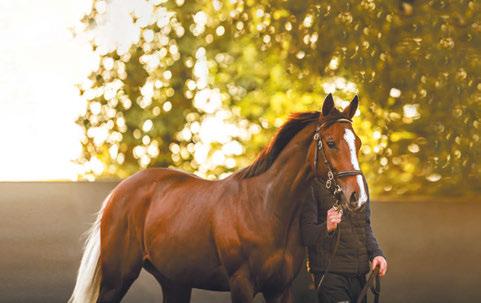
There was a need for racing to take stock and assess the extent of this incursion within its population. The rapid, pro-active surveillance undertaken by the industry during the short shutdown provided evidencebased assurances to resume the sport and ensure that the imminent National Hunt festivals at Cheltenham and Aintree were unlikely to be threatened. Evidence from subsequent UK EI surveillance in 2019 seems to vindicate this approach, as a significant second wave of EI was noted across GB over the summer months of 2019 (see Figure 2). However, this second wave of EI did not affect racing and no further race meetings were cancelled.
The mitigation that racing quickly adopted in 2019 was to require an increase in the frequency at which booster vaccinations were administered to racehorses and indeed these have now been formally adopted under changes to the mandatory requirements for racing. This policy was based on firm scientific evidence that included observations from previous outbreaks of EI in vaccinated racehorses and mathematical modelling of the effects of amending vaccination intervals. This work showed that more frequent vaccination optimises immunity across the population, thereby improving protection against the ongoing threats from the ever-evolving H3N8 EI virus during a period before viral strains in vaccines are further updated.
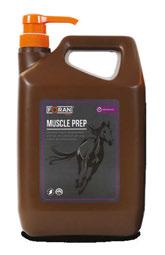
Figure 2: 2019 UK EI epidemic curve from Whitlock et al (2022) – An epidemiological overview of the equine influenza epidemic in Great Britain during 2019
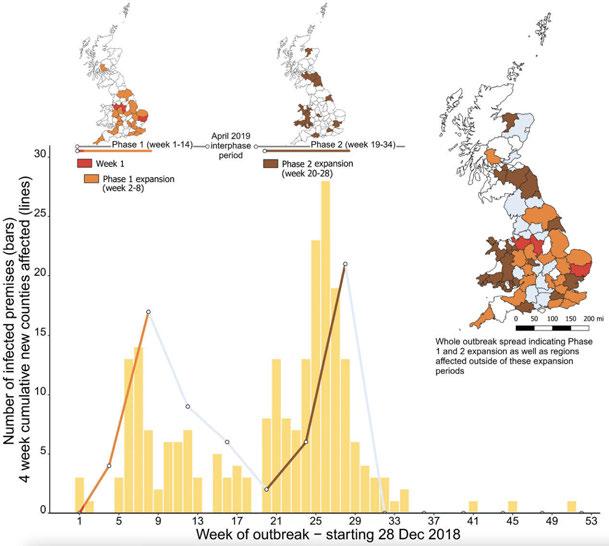
There may also be beneficial unintended consequences from this pro-active approach – this has been shown very recently with respect to EI and vaccination. A further wholly unpredicted challenge came to light as recently as August 2022 with notification by the manufacturer of an imminent shortage of supply of one of the two market-leading brands of EI vaccine across Europe. This is unfortunately placing pressures on the ability to maintain vaccine schedules across the racing and equestrian sectors, necessitating an unwelcome and only temporary but necessary
relaxation of the more stringent EI vaccination requirements. However, having adopted more frequent vaccination following the 2019 epidemic, this has created resilience that means the consequences of a large-scale shortfall in vaccine supply is likely to be much better resisted than if existing rules had been maintained.
In closing, given our various experiences since 2019, and reminded here by history, the importance of vaccination in man and horse has perhaps never been more starkly illustrated than now in the hard fought post-Covid era.
Jason Hart was crowned champion apprentice in 2013 and his 105 winners last year placed him only just outside the top ten, and second only to Ben Curtis among riders based in the north. There were good wins on the way, courtesy of the likes of Ridge Ranger, El Astronaute and Safe Voyage, but perhaps fewer of the headlines which Hart, now 28, had hoped to be making. That’s all changed now though, thanks to the fabulous Highfield Princess. The five-year-old, trained by Hart’s long-time boss John Quinn and owned and bred by the former Channel 4 Racing supremo John Fairley, gained her first win off a mark of just 58 but has never stopped improving and heads for the Breeders’ Cup at Keeneland next month following a stunning hat-trick of Group 1 sprint triumphs.
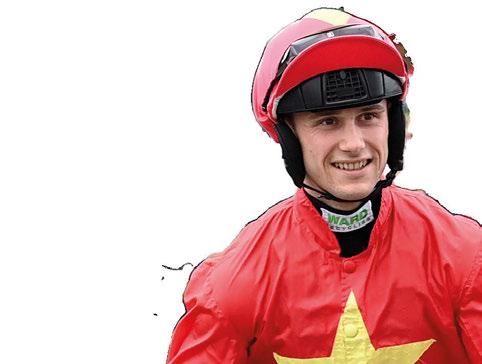 Interview: Graham Dench
Interview: Graham Dench
mad to think I’m now riding probably the best sprinter around, following wins in the Maurice de Gheest, Nunthorpe and Flying Five. Apparently only a handful of sprinters have won three Group 1s in a row, and we are talking about horses like Dayjur, Blue Point and Muhaarar. Highfield Princess has done it all in just five weeks.
I was brought up in the Borders at Hawick and it all started for me with ponies and then riding out for local trainers like Donald Whillans. Initially I was apprenticed to Mark Johnston, but I’d moved to Declan Carroll by the time I had my first win on Spice Bar at Ripon in 2011. Although it was Declan who got me going, I’ll always be grateful for the start I had with the Johnstons, and we came full circle in a way when I won the Acomb and Royal Lodge for them in the Highclere silks on Royal Patronage. He was also second in the Dante and he gave me a huge thrill when I rode him in both the 2,000 Guineas and the Derby.
In 2013 I was champion apprentice, finally getting ahead quite late in the season and beating Thomas Brown and Oisin Murphy. I don’t think it was expected of me, as I didn’t have a big stable behind me, but my agent Alan Harrison did a great job. I rode a lot of winners for a lot of smaller stables, and although there are too many to name I must mention
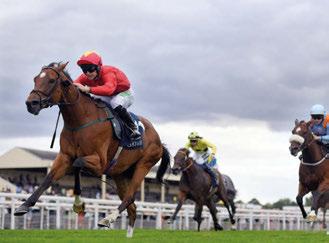
the soon-to-retire Eric Alston, who has been a great supporter and also gave me opportunities on better horses.
I reached the 100-winner mark for the first time last year – that was under the one-meeting-a-day rule for riders, which I’m quite happy with. There were a couple of occasions in the days when we did two meetings when I was tight for time and ended up driving like an idiot, as I’m sure others did. Everybody wants as many rides as possible, and I’m maybe looking at it from a different angle to some of those lads with big retainers and the luxury of a helicopter now and again, but somebody could have been killed.
The new whip rules that are coming in next year will be a big change for us all, but I don’t have a problem with them. We’ll just have to roll up our sleeves and get on with it, but I’m not really thinking about it yet and I don’t expect I’ll be changing my technique until much nearer the time. I must do my best for the owners and trainers I ride for – I don’t want to compromise that until I have to.
I think I’m a clean rider and normally if I’m suspended I’ve deserved it, so I’ll hold my hands up, but I’ve appealed stewards’ decisions twice and won both times. I felt I was hard done by at York in May when I got four days on Highfield Princess, because I’d taken all reasonable measures to keep her straight. Crucially, I was sent a camera angle that wasn’t available on the day, and I think the York stewards might have come to a different conclusion if they’d had it. The other occasion was at Wolverhampton in 2020. I’d normally have taken it on the chin, but this one would have cost me the ride on Gulliver in Qatar and again I felt I’d done very little wrong.
I’ve effectively been John Quinn’s main jockey now for almost six full seasons. It all started at a hunt ball with a chance
conversation with John’s son Sean, who suggested I rode out now and again. To begin with I was sharing the rides with Jack Garritty and Cam Hardie on the middle-of-the-road horses, while Frankie and co rode most of the top horses, but then John told me I’d be riding most of them, which was great news. I got a right kick out of El Astronaute, who finished third in the Abbaye after starting out rated in the 70s, and it was a similar story with Safe Voyage, who began even lower but went on to be third in the Foret.
Highfield Princess started even lower than they did, and I think it’s all down to the time that John gives them all. She didn’t race at two but then won four times at three before giving me that breakthrough first win at Royal Ascot. Looking back, it was amazing she saw out the uphill seven furlongs so well, as she has so much speed.
One thing I’ve no worries about whatsoever at Keeneland is her ability to handle the track. She’s won plenty of times around a bend and, as we’ve seen, she can do pretty much anything. It’s a different speed again when you go to America, but Glass Slippers showed it could be done for Kevin Ryan and Tom Eaves at Keeneland in 2020 when I was over there to ride Safe Voyage in the Mile. Highfield Princess coped fine when they went very hard indeed in the Nunthorpe, and she was on the bridle when they were absolutely rattling along at the Curragh.
I think my experience of the track will be invaluable when I go back to Keeneland and, touch wood, she’s usually quickly enough away. I’ve no doubt that she’ll be able to lay up with them early doors, then hopefully be in her comfort zone through the middle part of the race. It’s already been an incredible year for me, but winning at the Breeders’ Cup would be an amazing way to finish it.
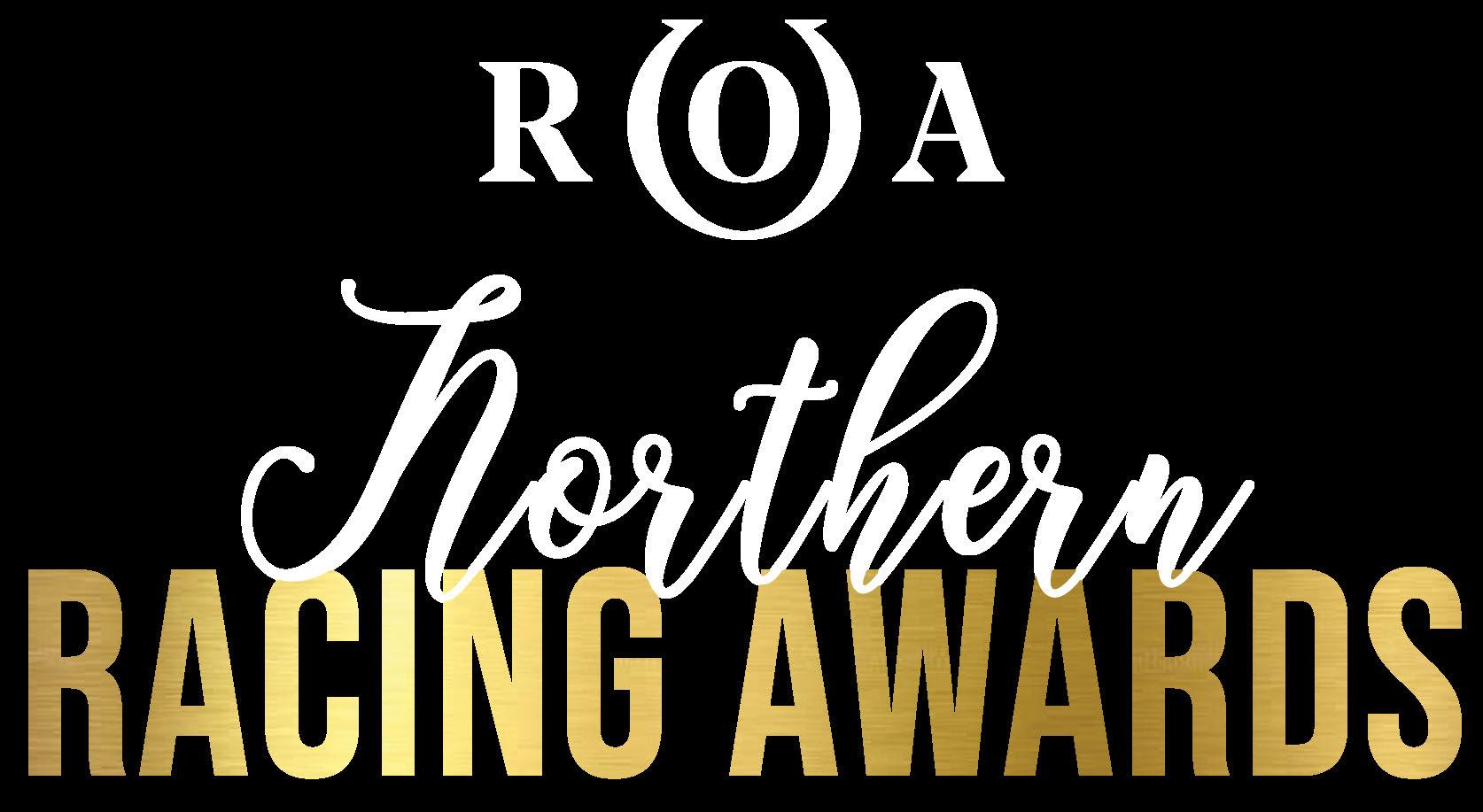



Ascot record breaker, Royal Ascot superstar and Shamardal’s fastest.
By fellow Derby hero New Approach (who was a sensational first-crop sire).
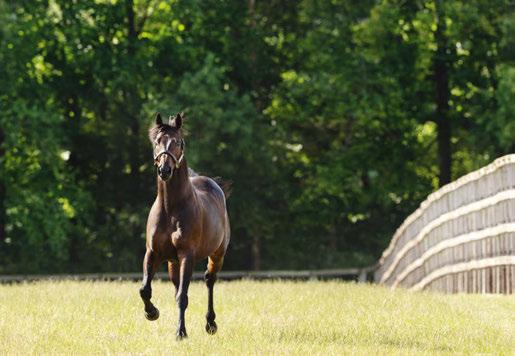
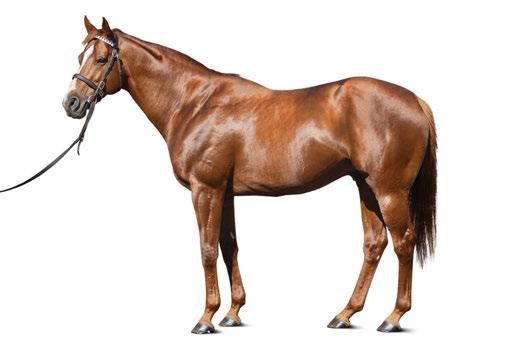
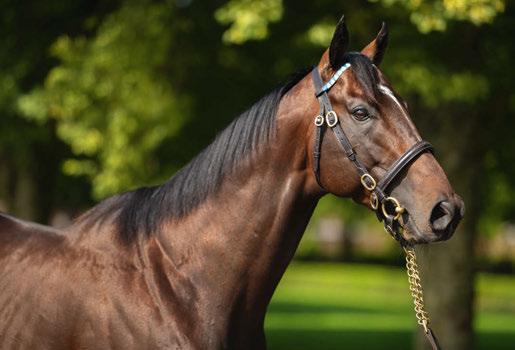
Dubawi’s most precocious and the fastest in the Classic family of Darshaan.